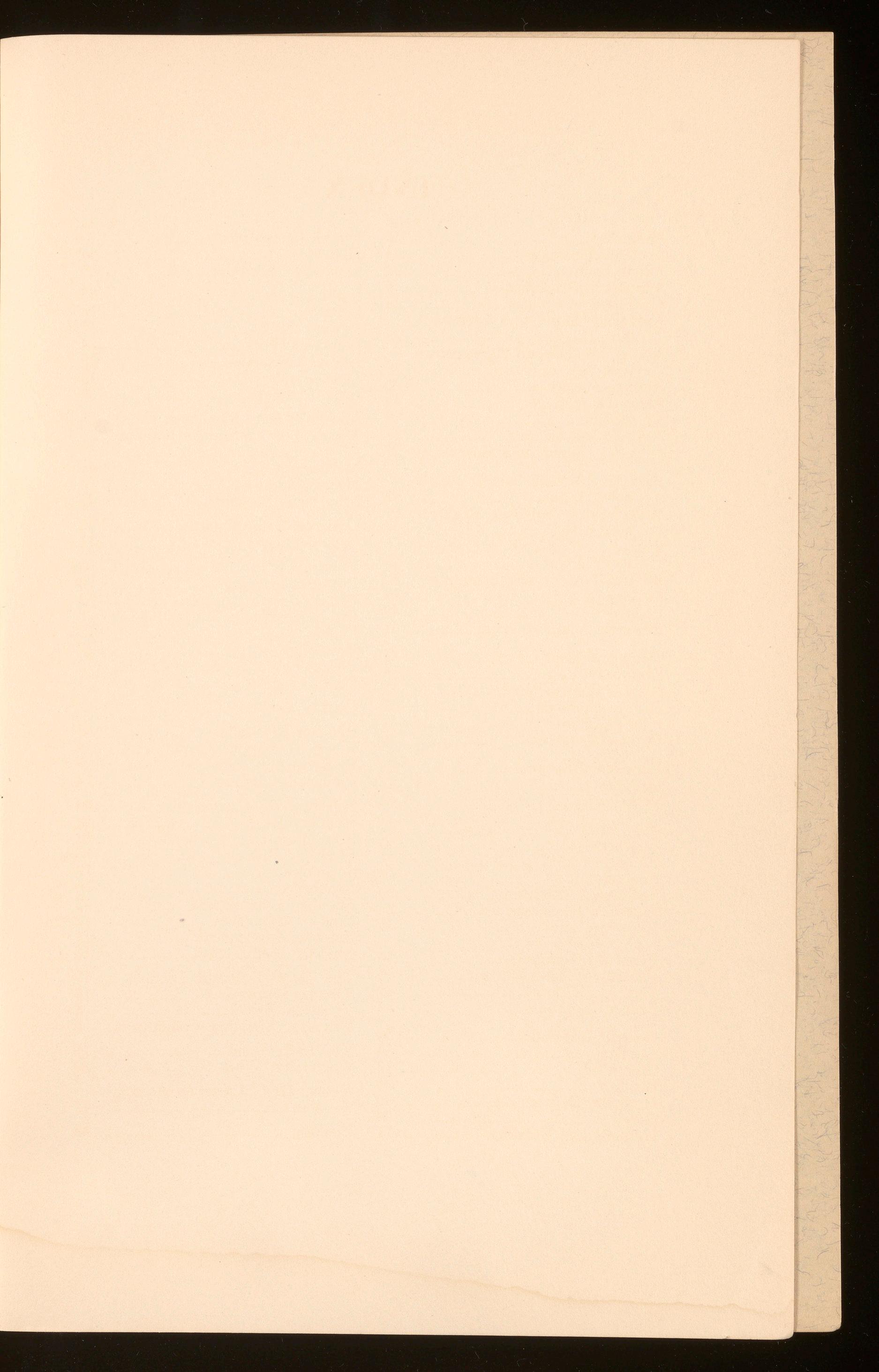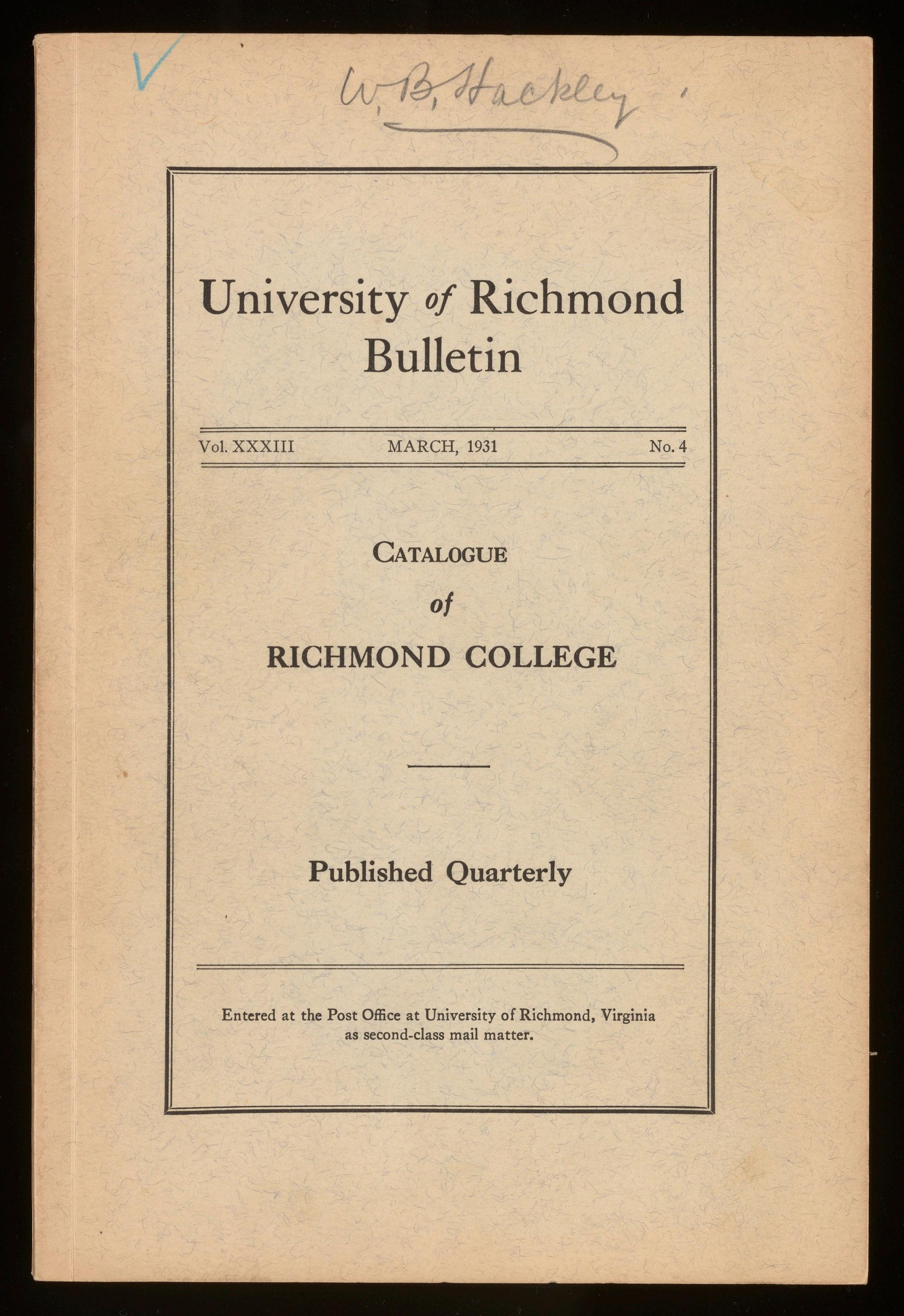

University of Richmond Bulletin
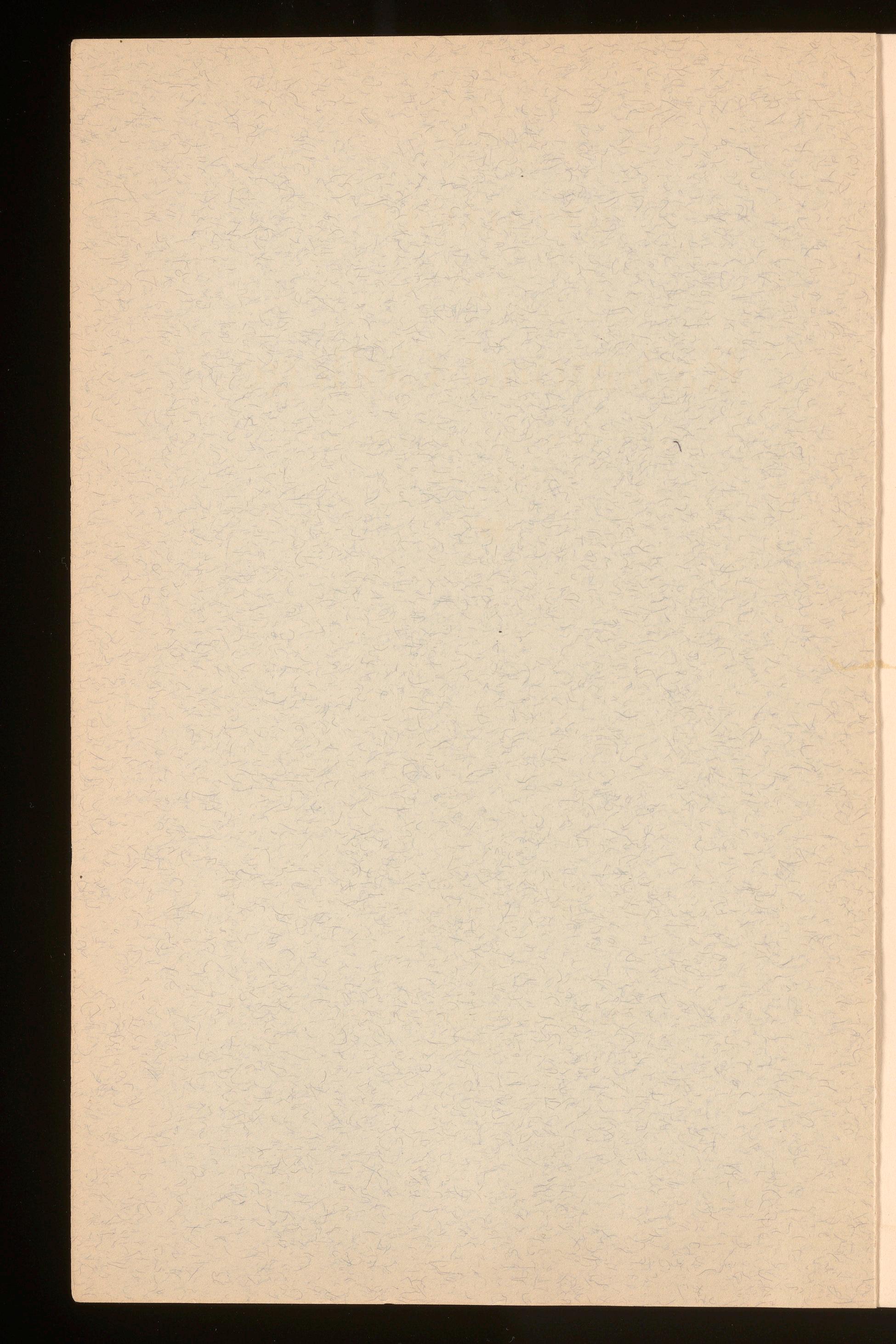
CATALOGUE of Richmond C9llege
UNIVERSITY of RICHMOND VIRGINIA

SESSION 1930-1931
With Announcements for the Session 1931-1932
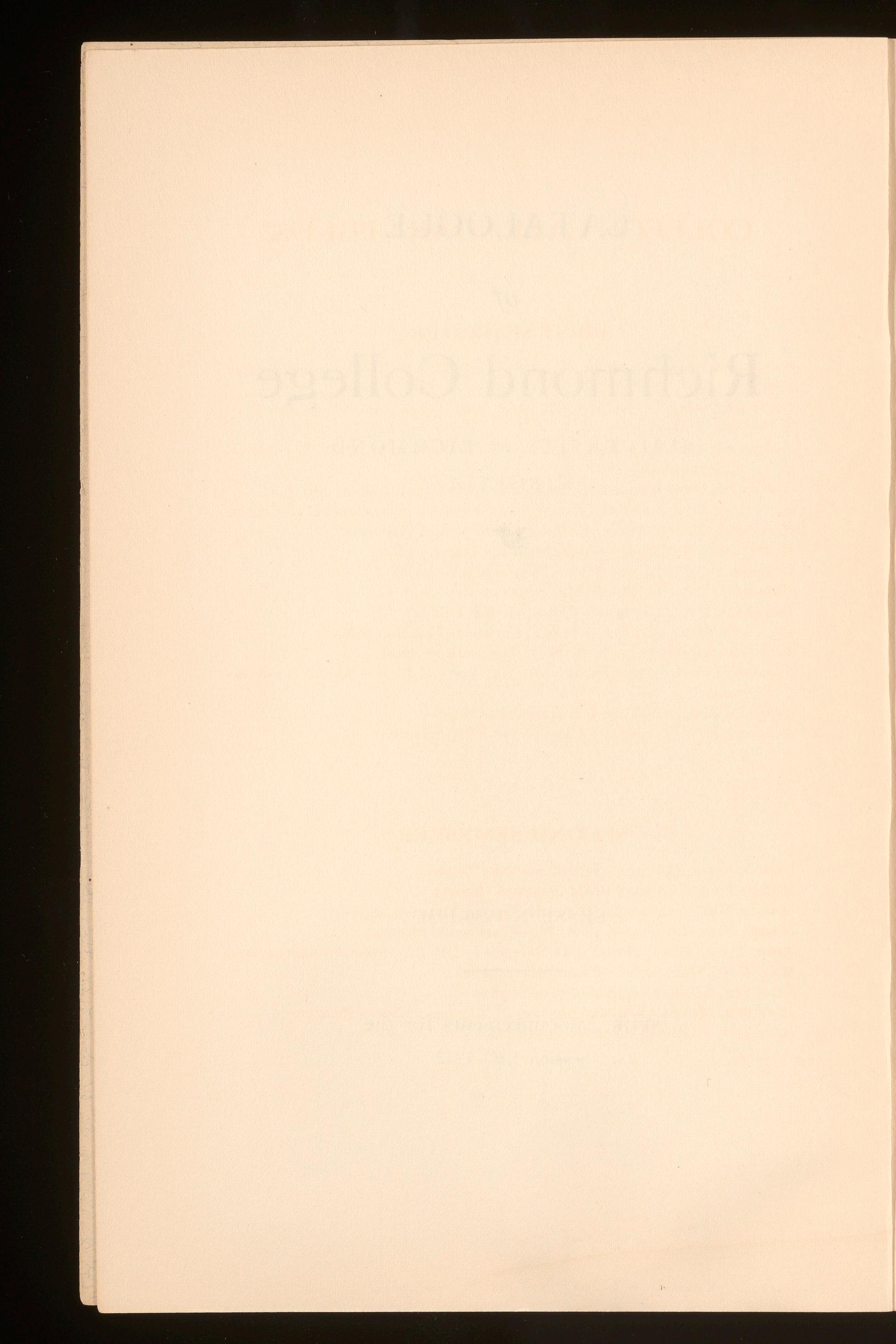

COLLEGE CALENDAR-1931-1932
FIRST SEMESTER
SEPTEMBER15TH AND 16TH, TUESDAY AND WEDNESDAY-Entrance Examinations.
SEPTEMBER 15TH AND 16TH, TUESDAY AND WEDNESDAY-Registration of New Students.
SEPTEMBER15TH AND 16TH, TUESDAY AND WEDNESDAY,2 P. M.-Special Examinations.
SEPTEMBER17TH, THURSDAY--Session begins; Registration of Students.
SEPTEMBER18TH AND 19TH, FRIDAYAND SATURDAY--Organization of Oasses.
SEPTEMBER21ST, MONDAY, 12 NooN-First Chapel Assembly.
OCTOBERlsT, THURSDAY-Application for Degrees Filed.
OCTOBER13TH, 14TH AND 15TH-"University Week."
NOVEMBER10TH, TUESDAY-Mid-Semester Reports.
NOVEMBER26TH, THURSDAY-Thanksgiving Holiday.
DECEMBER22ND, TUESDAY,1 P. M.-Christmas Holidays begin.
JANUARY 4TH, MONDAY,10 A. M.-Oass work resumed.
JANUARY 8TH AND 9TH, FRIDAY AND SATURDAY,2 P. M.-Special Examinations.
JANUARY 21ST, Tnu'RsDAY-Examinations begin.
JANUARY 30TH, SATURDAY-Close of the First Semester. .,
., .,
SECOND SEMESTER
FEBRUARYls-r, Mo.:-.DAY-Second Semester begins.
MARCH 19TH, SATURDAY-Mid-Semester Reports.
MARCH 23RD, WEDNESDAY,12 NOON-Spring Vacation begins.
MARCH 3lsT, THURSDAY, 10 A. M.-Class · work resumed.
APRIL lsT AND 2ND, FRIDAY AND SATURDAY,2 P. M.-Special Examinations.
MAY 27TH, WEDNESDAY-Examinations begin.
JUNE 5TH, SUNDAY-Baccalaureate Sermon.
JUNE 6TH, MoNDAY-Annual'Meeting of Trustees; Alumni ReW1ions.
JUNE 7TH, TUESDAY-Commencement Day.
BOARD OF TRUSTEES
A. W. PA'ITERSON
PRESID E NT
GEORGE BRAXTON TAYLOR VICE-PRESIDENT
B. WEST TABB S EC RETARY
C LASS ONE
Tenn expir es June , 1931
J . H UNT HARGRAVE O1atham
R. H. PITT, D.D., LL.D .... Richmond
H . W. STRALEY......Princeton, W. Va.
W. R BARRETT.... ..Newport News
C ARTERN. WILLIAMS, J'R...Richmond
CLASS TWO
Term expires June, 1932
J . J. Mo NTAGUE........ Richmond
L. HowARD ]ENKINS ............Richmond
G EORGESwANN ............ Trenholm
H. LJo::EBoATWRIGHT .Danville
J. E. HICKS, D .D ......... Baltimore
CLASS THREE
Term expir es June 1933
E. C. MATHEWS . ........ Norfolk
STUARTMcGurnE , M.D LL.D., Richmond
Miss LULA WrnsroN ..........Richmond
Sparks W. Melton, D D .... Norfolk
]OHN STEWARTBRYAN, LL.D , Richmond
CLASS FOUR
Term expi1·es Jun e, 1934
A. J. MONTAGUE , LL D .... Richmond
R. C. WrLLIAMS.... ..Richmond
B T. GuNTER Accomac
A. R. LoNG............................Lynchburg
R. H. ANGF..LL..........................Roanok e
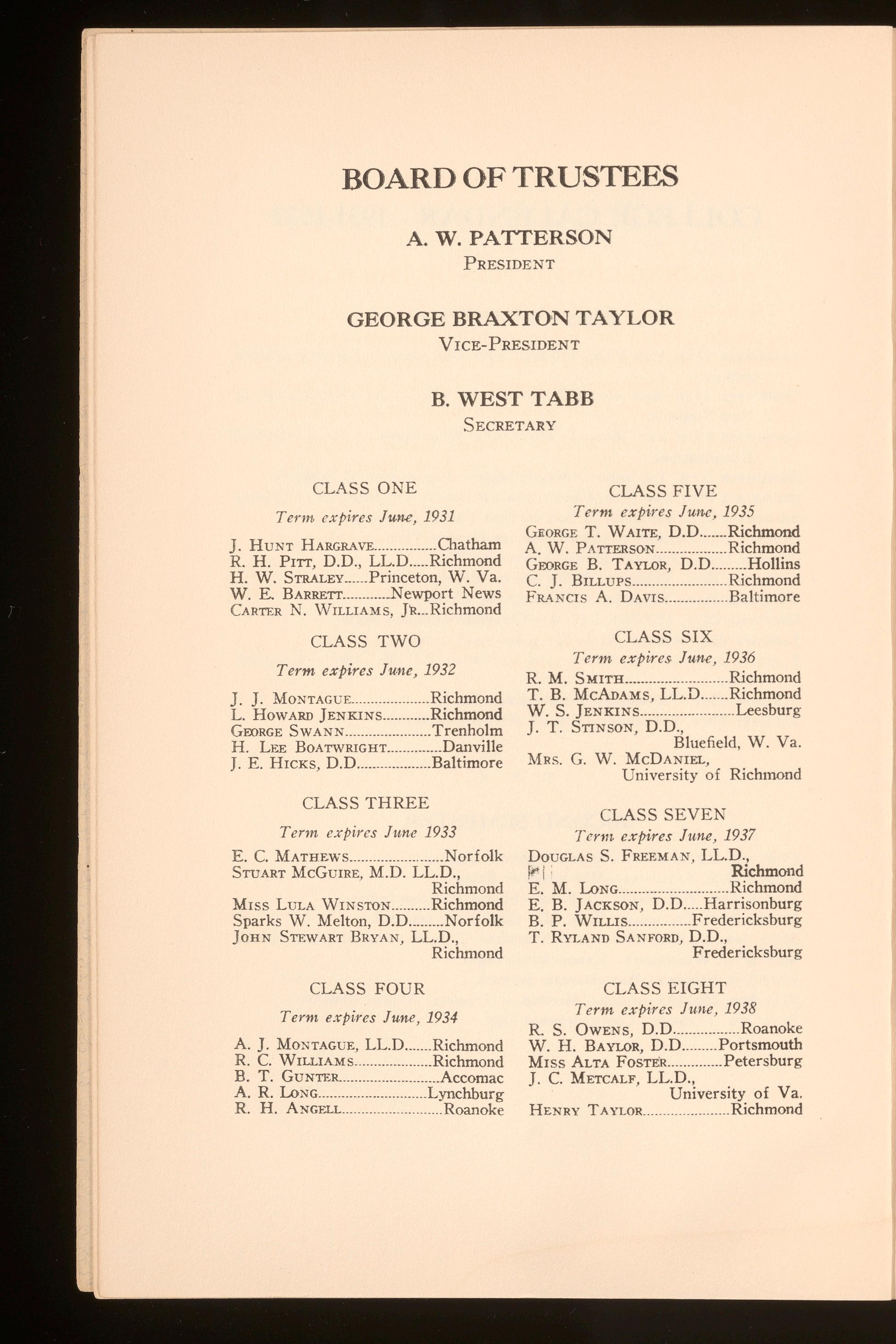
C LASS FIVE
Term expires Jun,e, 1935
G EORGE T. WAITE, D.D .. Richmond
A. W. PATTERSON............ ......Richmond
GEORGEB. TAYLOR, D.D ... Hollins
C. J. BILLUPS................... Richmond
FRANCIS A DAVIS... ....Baltimore
C LASS SIX
T erm exp ire:;.Jun e, 1936
R. M. SMITH Richmond
T. B. McADAMS, LL.D . Richmond
W. S . ]ENKINS .. Leesburg
J. T. STINSON, D.D., Bluefield, W Va.
MR s. G. W . McDANIEL, Univer s ity of Richmond
CLASS SEVEN
T erm expires lime, 1937
DOUGLASs FREEMAN, LL.D , I-"I · Richmond
E. M. LoNG . Richmond
E. B. JACKSON, D .D .....Harrisonburg
B. P WILLIS .............. ..Fredericksburg
T. RYLAND SANFORD , D.D., Fredericksburg
CLASS EIGHT
T erm expi re s June , 1938
R S. OWENS, D D .. Roanoke
W. H. BAYWR, D.D ....... ..Portsmouth
Miss ALTA FosTER.... Petersburg
J. C. METCALF,LL.D., University of Va.
HENRY TAYLOR..................... .Richmond
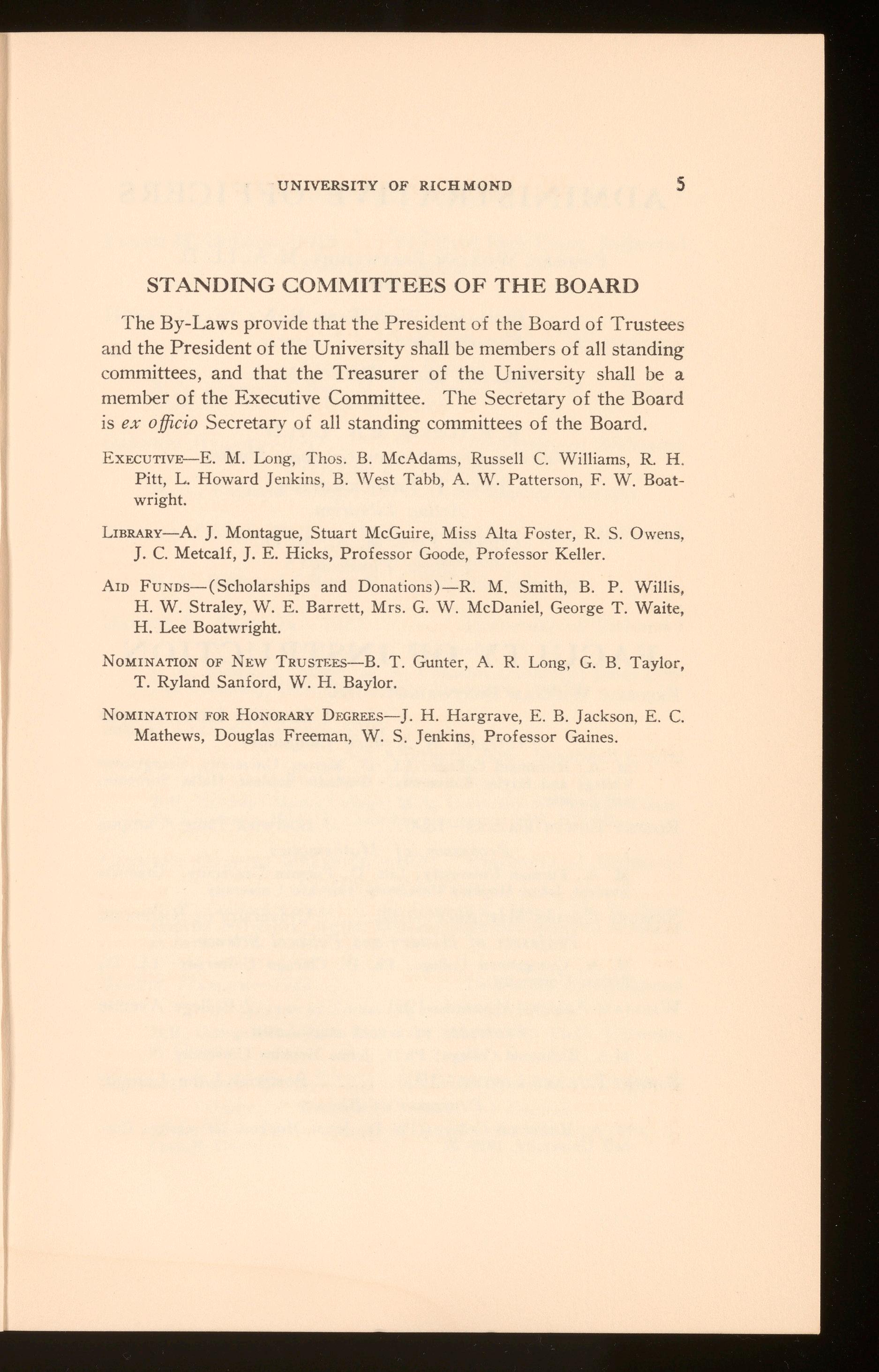
ST ANDING COMMITTEES OF THE BOARD
The By-Laws provide that the President of the Board of Trustees and the President of the University shall be members of all standing committees, and that the Treasurer of the University shall be a member of the Executive Committee. The Secretary of the Board is ex officio Secretary of all standing committees of the Board.
ExECUTIVE-E. M. Long, Thos. B. McAdams, Russell C. Williams, R H. Pitt, L. Howard Jenkins, B. \Vest Tabb, A. W. Patterson, F. W. Boatwright.
LIBRARY-A. J. Montague, Stuart McGuire, Miss Alta Foster, R. S. Owens, ]. C. Metcalf, ]. E. Hicks, Professor Goode, Professor Keller.
Am FuNos-(Scholarships and Donations)-R. M. Smith, B. P. Willis, H. W. Straley, W. E. Barrett, Mrs. G. W. McDaniel, George T. Waite, H. Lee Boatwright.
NOMINATIONOF Ni,:w TRUSTF.ES-B. T. Gunter, A. R. Long, G. B. Taylor, T. Ryland Sanford, W. H. Baylor.
NOMINATIONFORHONORARYDEGREES-]. H. Hargrave, E. B. Jackson, E. C. Mathews, Douglas Freeman, W. S. Jenkins, Professor Gaines.

ADMINISTRATIVE OFFICERS
f f f
FREDERICWILLIAM BOATWRIGHT,M.A., LL. D. President
BENJAMIN WEST TABB, B. A. Vice-President and Treasurer
WILLIAM LOFTIN PRINCE, M.A. Dean
R. E. GAINES, M.A., LITT.D. Chairman Co1n1nittee on Graduate Studies
Lucv T. THROCKMORTON Acting Librarian
CULLEN PITT, M. A., M. D. College Physician
FACULTY OF INSTRUCTION
FREDERICWILLIAM BoATWRIGHT-1887 1 Bostwick Lane, Campus Professor of M odcrn Languages
M. A., Richmond College; LL. D., Mercer University, Georgetown College and Baylor University. Graduate Student, Halle, Sorbonne, and Leipsic.
ROBERT EDWIN GAINEs-1890 3 Bostwick Lane, Campus Professor of Mathematics
M. A., Furman University; Litt. D., Furman University. Graduate Student, Johns Hopkins University, Harvard University.
SAMUEL CHILES MITCHELL-1895 ...... University of Richmond Professor of History and Political Science
M. A., Georgetown College; Ph. D., Chicago University; LL. D , Brown University.
WILLIAM ASBURY HARRis-1901 ............. 2 College Avenue Professor of Greek and Latin M.A., Richmond College; Ph.D., Johns Hopkins University.
ROBERT EDWARDLovING-1908 ....... 2 Bostwick Lane, Campus P<rofessor of Physics
M . A., ~ich~ond College; Ph. D., Johns Hopkins University; Cornell Umvers1ty, 1919-'20.

UNIVERSITYOF RICHMOND 7
FRANK M. DoBSON-1913 ...... 713 Byrd Park Court, Richmond Director of Athletics
HENRY BRANTLYHANDY-1914
Three Chopt Road, Westhampton ·Professor of English
B. A., Richmond College; M. A., Richmond College ; M. A. Harvard University; Columbia University, 1915.
GARNETT RYLAND-1917 .............. University of Richmond Professor of Chemistry
M. A., Richmond College; Ph. D., Johns Hopkins University.
WILLIAM LOFTIN PRINCE-1920 ... 2423 Grove Ave., Richmond Professor of Education
B. A., Richmond College; M. A., Columbia University.
HAYNIE H. SEAY, JR.-1920 .......... University of Richmond Professor of Economics
B. A., Richmond College; M. A., Columbia University; Johns Hop- kins University, 1917-'19; Princeton University, 1919-'20.
ROBERTCOLLINSAsTROP-1920
343 Albemarle Ave., Stonewall Courts Professor of Psychology
A.B., Randolph-Macon College; M.A., University of Virginia; Colum- bia University, 1914-'15; Columbia University, 1923, 1926-'27.
CLEMENT ORESTES MEREDITH-1920 ... University of Richmond Professor of German
A. B., Guilford College; A. B., Haverford College; Ph. D., Johns Hopkins University; Berlin, 1908-'10; American School of Philology at Rome, 1910.
RoLVIX HARLAN-1922 ............... University of Richmond Professor of Sociology and Social Ethics
A.B., George Washington University; M.A., ibid.; Ph.D., University of Chicago.
CLEMENTTYSON GoooE-1924 ...... 3117 Grove Ave., Richmond
James A. Bostwick Professor of English
A. B., Wake Forest College; A. M., Harvard University; Ph. D., Cornell University.

UNIVERSITYOF RICHMOND
HuGH SAGER MEAD-1924 ...... 5816 York Road, Westhampton Professor of Business Administration
A. B., Kalamazoo College; A. B., University of Chicago; University of Michigan; University of Chicago, 1923-'24.
RALPH C. McDANEL-1926 ........... University of Richmond Professor of Histdiry
B.A., University of Richmond; M.A., Columbia University; Ph.D., Johns Hopkins University.
JOHN H. RussELL-1928 .......... 3506 Grove Ave., Richmond Professor of Accounting
A.B., Emory and Henry; M.A., Ph.D., Johns Hopkins University.
JOHN WENDELL BAILEY-1929 ......... University of Richmond Professor of Biology
B.S., M.S., Mississippi A. and M. College; A.B., A.M., Cornell Uni- versity; M.A., Ph.D., Harvard University.
BENJAMIN CLARK HOLTZCLAW,JR.-1929
1600 Monument Ave., Richmond
James Thomas, Jr., Professor of Philosophy
A. B., Mercer University; B. A., M. A., Oxford; Ph. D., Cornell University.
RAYMONDBENNETT PINCHBECK-1929 3427 Grove Ave., Richmond Professor of Business Administration
B. S., M . S., Ph. D., University of Virginia.
\,VooDFORDBROADUSHACKLEY-1924
2120 Lakeview Ave., Richmond Associate Professor of Latin
A. B , University of Virginia; M. A., Northwestern University; A. M., Harvard University; Columbia University.
ROBERTARMISTEADSTEWART-1924
Shenandoah Apts., Richmond
Associate Professor of Romance Languages
M.A., Ph.D., University of Virginia
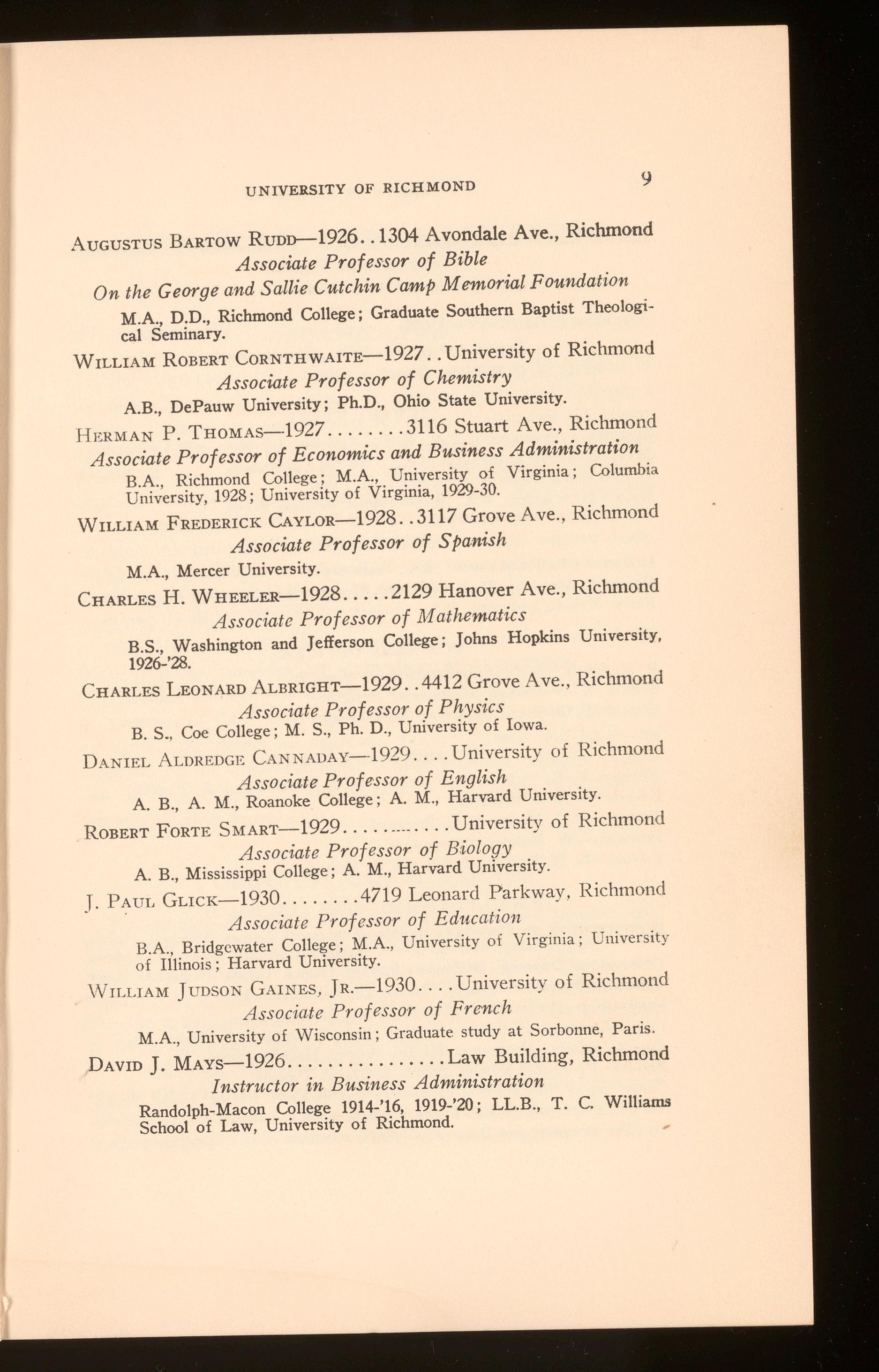
UNIVERSITYOF RICHMOND
AUGUSTUSBARTOWRuDo-1926 .. 1304 Avondale Ave., Richmond
Associate Professor of Bible
On the George and Sallie Cutchin Camp Memorial Foundation
M.A., D.D., Richmond College; Graduate Southern Baptist Theological Seminary.
WILLIAM ROBERTCoRNTHWAITE-1927 .. University of Richmond
Associate Professor of Chemistry
A.B., DePauw University; Ph.D., Ohio State University.
HERMAN P. THOMAS--1927 ........ 3116 Stuart Ave., Richmond
Associate Professor of Economics and Business Administration
B.A., Richmond College; M.A., University of Virginia; Columbia University, 1928; University of Virginia, 1929-30.
WILLIAM FREDERICKCAYLOR-1928 .. 3117 Grove Ave., Richmond Associate Professor of Spanish
M.A., Mercer University.
CHARLESH. WHEELER-1928 ..... 2129 Hanover Ave., Richmond Associate Professor of Mathematics
B.S., Washington and Jefferson College; Johns Hopkins University, 1926-'28.
CHARLESLEONARDALBRIGHT-1929 .. 4412 Grove Ave., Richmond Associate Professor of Physics
B. S., Coe College; M. S., Ph. D., University of Iowa.
DANIEL ALDREDGECANKADAY-1929 .... University of Richmond
Associate Professor of English
A. B., A. M., Roanoke College; A. M., Harvard University.
ROBERTFORTE SMART-1929 ............. University of Richmond
Associate Professor of Biology
A. B., Mississippi College; A. M., Harvard University.
J. PAUL GLICK-193O ....... .4719 Leonard Parkway, Richmond Associate Professor of Education
B.A., Bridgewater College; M.A., University of Virginia; University of Illinois; Harvard University.
\VrLLJAM JunsoN GAINES, JR.-193O .... University of Richmond Associate Professor of French
M.A., University of Wisconsin; Graduate study at Sorbonne, Paris.
DAVID J. MAYs-1926 ................ Law Building, Richmond
Instructor in Business Administration
Randolph-Macon College 1914-'16, 1919-'20; LL.B., T. C. Williams School of Law, University of Richmond.

UNIVERSITY OF RICHMOND
ELTON BENJAMIN DoERING--1928 ...•.. University of Richmond Instructor in English B. A., University of Iowa; M.A., Harvard.
SHERLOCK BRONSON-1928
•.•.••..••••. • ••• Westhampton, Va. Instructor in Business Administration LL.B., T C. Williams School of Law.
LIBRARY STAFF
MARTHAF. SNODGRASS,B.A., B . S., Assistant Librarian a11d Catal,oguer.
MARYWINSTONMONTAGUE,B.A., Assistant Catal,oguer.
E . ELIZABETHTHOMAS,Periodicals and Files.
HELEN HUTCHESON , B.A., Westhampton Reading Room
SECRET ARIES
ELIZABETHL. THOMASSON,M.A ., Secretary to the P resi,den t
HELEN A. MoNSELL,M.A., Assistant Registrar and Secretary to the Dean.
EDITH KEESEESHELTON,B.A., Cashier and Secretary to the Tr easurer.
BUSINESS OFFICERS
R. M. STONE, LL.B ., Assistant Business Manager
MRS. L. S. WooowARD , Manager of Refectory
MRs R. P GoRDON,Director of Dormitories.
STUDENT ASSISTANTS
Ph y sics-E. G. Pickels, D. B. Selden , H B. Kincheloe , J. R. Perkin s. Chemistry-R. G. Bremner.
Biology-H I. Myers, E. C. Prichard Infirmary-\V. Holmes Chapman, Jr L i brary-G. H Kerr , C. J Gray , G. A. Foster.
FACULTY COMMITTEES FOR 1931-' 32
Representatives on University Senate-Professors Gaines , Mitchell, Harris, Seay, Loving, Ryland, Goode, Harlan, Holtzclaw , Bailey , Pinchbeck. Co11rscsand Degrees--Professors Loving, Gaines, Goode, Holtzclaw, Seay. Athletics-Professors Handy, Harlan, Caylor, McDanel. Fraternities-Professors McDanel, Harris, Handy. Public Lectures-Professors Mitchell , Ryland, Cornthwaite, M ea d, Glick. Student Affairs-Professors Harlan , Astrop, Hackley, Smart. Alumni-Professors Ryland, Harris , McDanel, Thomas. Chapel and Religi ous Lif e- Professors Harris , Rudd , Lovin g, Ga ines . B ail ey. S tudent Employment-Profe ssors Thomas, Caylor , Doubles. (The President and Dean are e.i- offici~ members of all committees.).
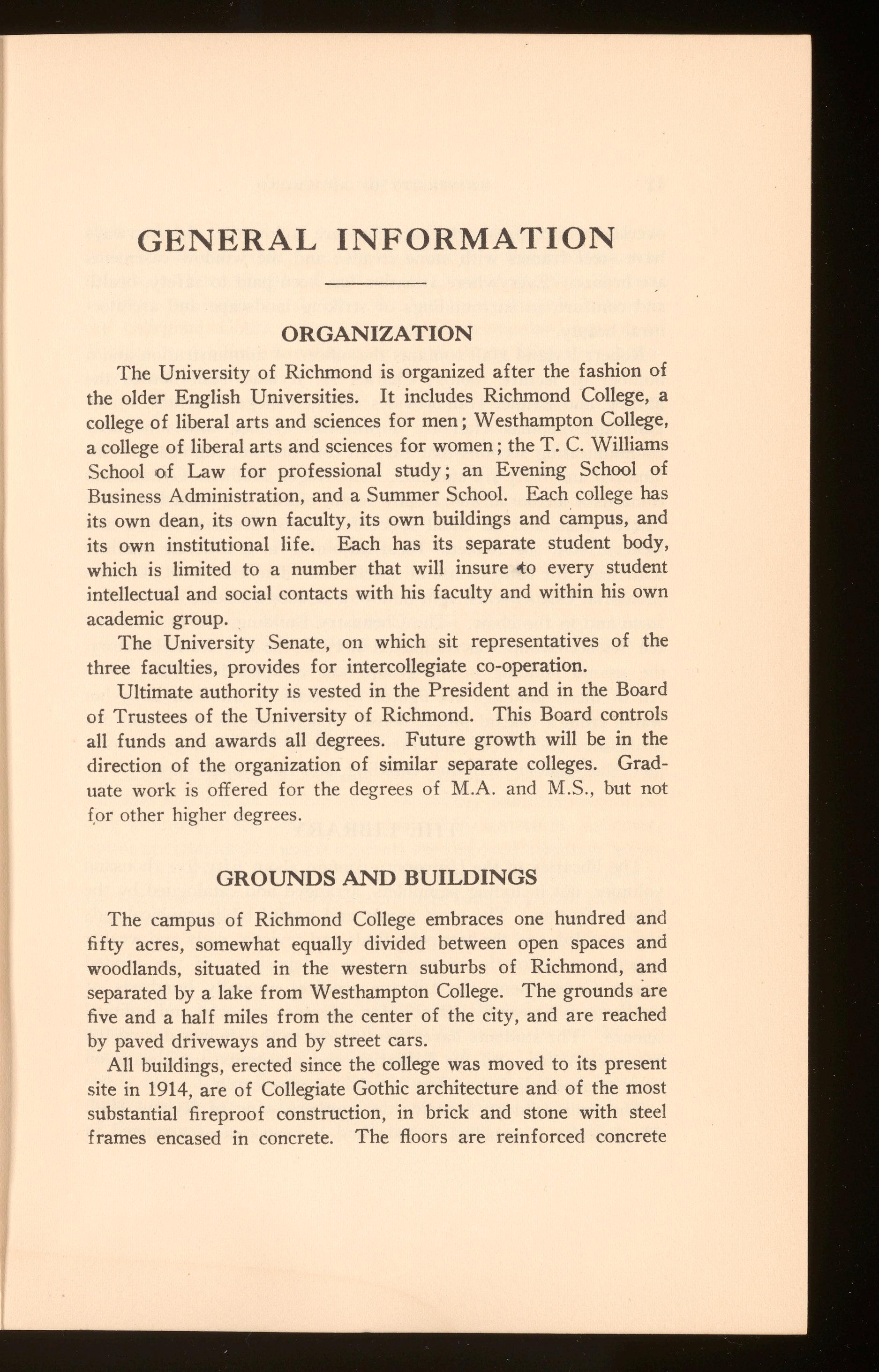
GENERAL INFORMATION
ORGANIZATION
The University of Richmond is organized after the fashion of the older English Universities. It includes Richmond College, a college of liberal arts and sciences for men; Westhampton College, a college of liberal arts and sciences for women; the T. C. Williams School o,f Law for professional study; an Evening School of Business Administration, and a Summer School. Each college has its own dean, its own faculty, its own buildings and campus, and its own institutional life. Each has its separate student body, which is limited to a number that will insure -to every student intellectual and social contacts with his faculty and within his own academic group.
The University Senate, on which sit representatives of the three faculties, provides for intercollegiate co-operation. Ultimate authority is vested in the President and in the Board of Trustees of the University of Richmond. This Board controls all funds and awards all degrees. Future growth will be in the direction of the organization of similar separate colleges. Graduate work is offered for the degrees of M.A. and M.S., but not £.or other higher degrees.
GROUNDS AND BUILDINGS
The campus of Richmond College embraces one hundred and fifty acres, somewhat equally divided between open spaces and woodlands, situated in the western suburbs of Richmond, and separated by a lake from Westhampton College. The grounds are five and a half miles from the center of the city, and are reached by paved driveways and by street cars.
All buildings, erected since the college was moved to its present site in 1914, are of Collegiate Gothic architecture and of the most substantial fireproof construction, in brick and stone with steel frames encased in concrete. The floors are reinforced concrete
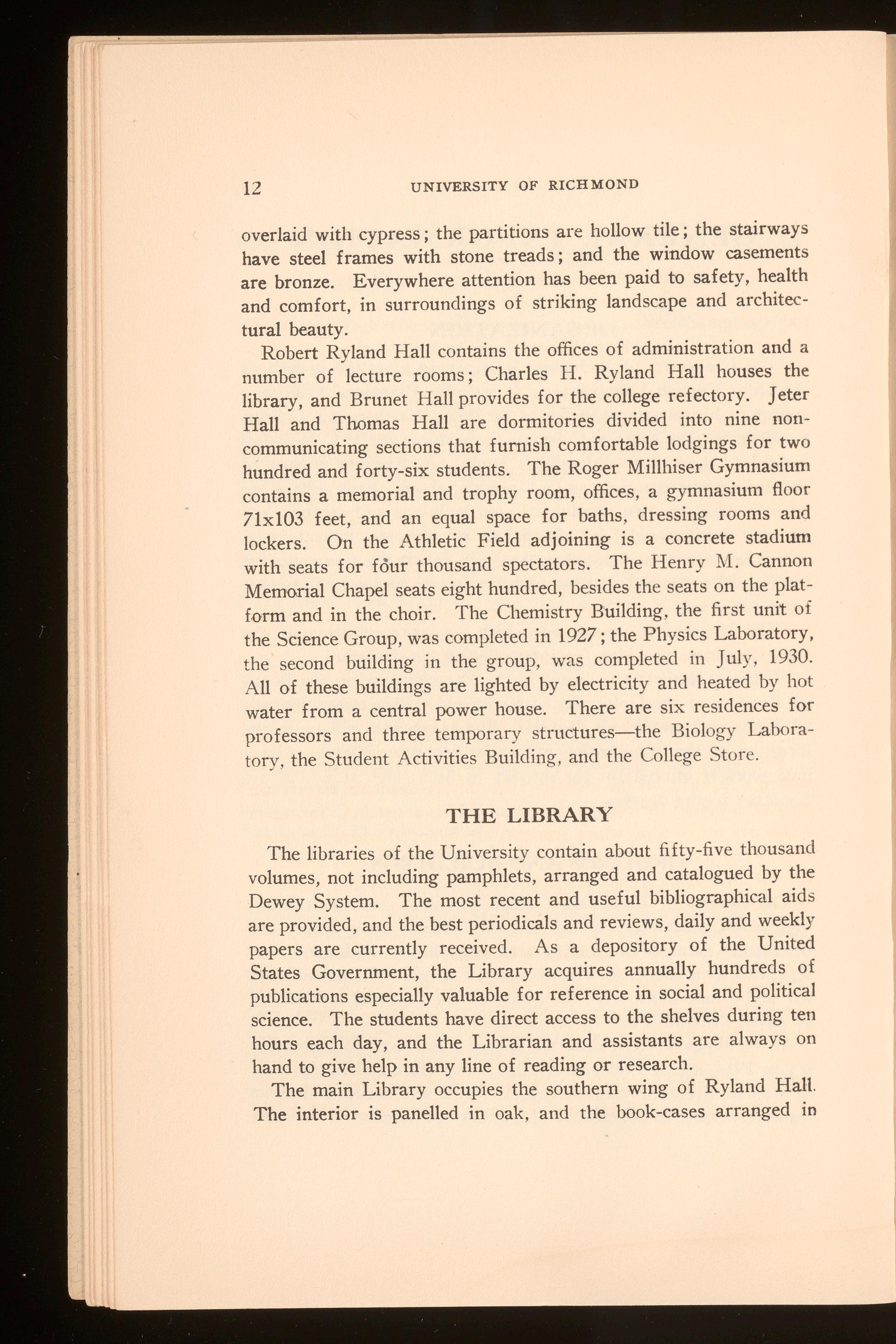
UNIVERSITY OF RICHMOND
overlaid with cypress; the partitions are hollow tile; the stairways have steel frames with stone treads; and the window casements are bronze. Everywhere attention has been paid to safety, health and comfort, in surroundings of striking landscape and architectural beauty.
Robert Ryland Hall contains the offices of administration and a number of lecture rooms; Charles H. Ryland Hall houses the library, and Brunet Hall provides for the college refectory. Jeter Hall and Thomas Hall are dormitories divided into nine noncommunicating sections that furnish comfortable lodgings for two hundred and forty-six students. The Roger Millhiser Gymnasium contains a memorial and trophy room, offices, a gymnasium floor 7lxl03 feet, and an equal space for baths, dressing rooms and lockers. On the Athletic Field adjoining is a concrete stadium with seats for four thousand spectators. The Henry M. Cannon Memorial Chapel seats eight hundred, besides the seats on the platform and in the choir. The Chemistry Building, the first unit of the Science Group, was completed in 1927; the Physics Laboratory, the second building in the group, was completed in July, 1930. All of these buildings are lighted by electricity and heated by hot water from a central power house. There are six residences for professors and three temporary structures-the Biology Laboratory, the Student Activities Building, and the College Stor e.
THE LIBRARY
The libraries of the University contain about fifty-five thousand volumes, not including pamphlets, arranged and catalogued by the Dewey System. The most recent and useful bibliographical aids are provided, and the best periodicals and reviews, daily and weekly papers are currently received. As a depository of the United States Government, the Library acquires annually hundreds of publications especially valuable for reference in social and political science. The students have direct access to the shelves during ten hours each day, and the Librarian and assistants are always on hand to give help in any line of reading or research.
The main Library occupies the southern wing of Ryland Hall. The interior is panelled in oak, and the book-cases arranged in

alcove plan. There is, at each end, a five-fold Gothic window of striking size and beauty, and in each alcove a casement window, the whole affording natural light at all hours of the day. In convenience and harmony of effect, the Library is the culmination of the collegiate Gothic, that exquisite perpendicular type made familiar by the English colleges, to which all the University buildings strictly conform.
The University counts itself peculiarly fortunate in having close by several great collections of books, which materially increase its library resources. Through the courtesy of the officials, the one hundred thousand volumes of the Virginia State Library and the unique collection of the Virginia Historical Society have been made accessible to our students, both for consultation and withdrawal. These afford exceptional facilities for research, not only in general subjects, but especially in Virginia and American history. It should also be mentioned that our nearness to Washington enables us to make constant use of the Congressional Library, from which rare books and pamphlets invaluable for theses and debates can be quickly obtained.
HEALTH DEPARTMENT
Excellent provision is made for care of the health of all students resident on the campus. Dormitory students receive the daily attention of the college physician and his assistants. Infirmary rooms are provided to which students are removed whenever necessary. There is no extra charge for the use of infirmary rooms or for the attendance of the physician's assistants who look after the needs of the sick.
LOAN FUNDS
In 1917 Rev. W. Thorburn Clark and Mrs. Clark, of Richmond, donated two hundred dollars to be loaned to worthy students at the discretion of the president of the University. Recently Mr. Charles T. Bagby, of Baltimore, gave thirteen hundred dollars on similar conditions. The firm of Meyer Greentree, Inc., of Richmond, has given one thousand dollars to establish the
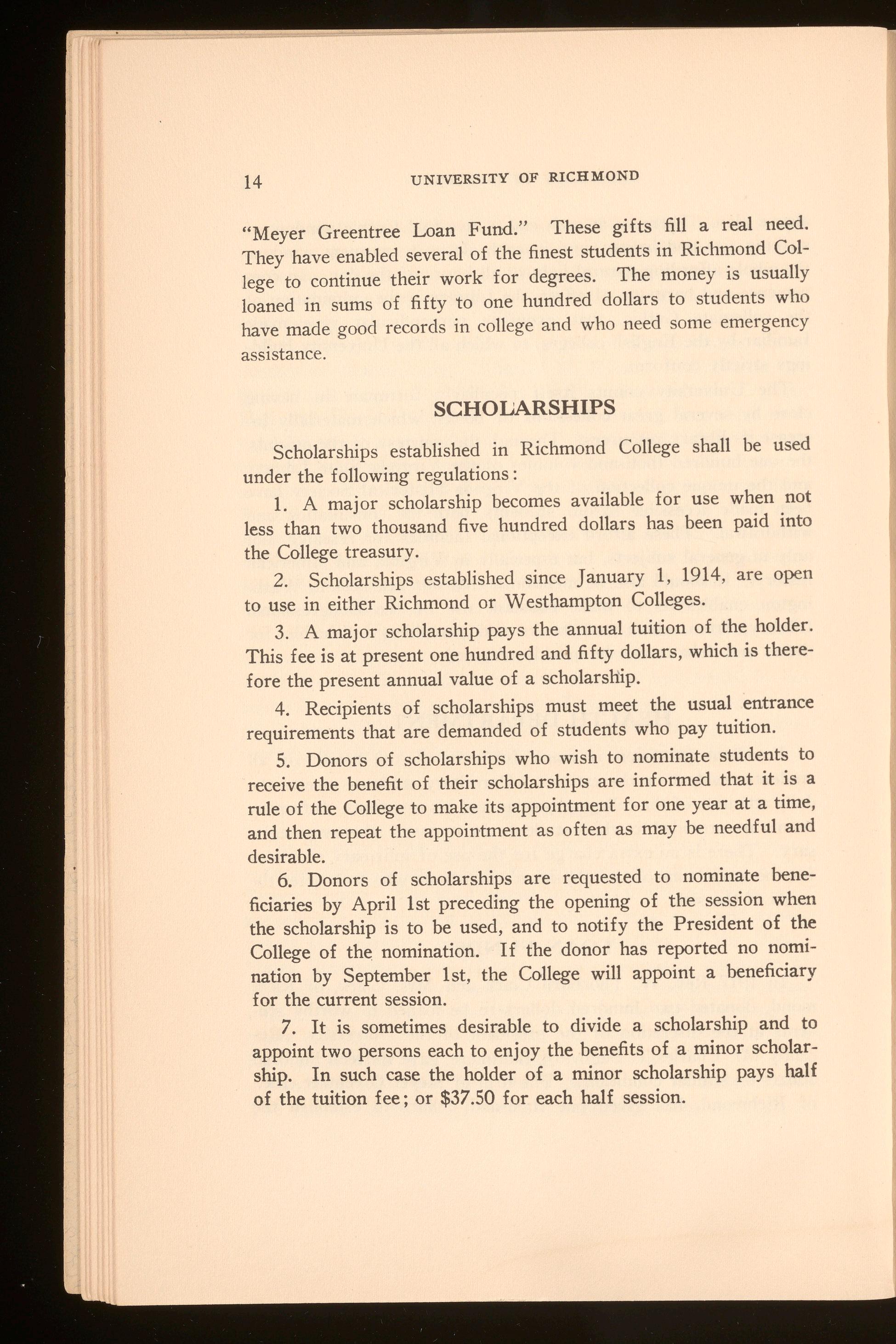
UNIVERSITY
"Meyer Greentree Loan Fund." These gifts fill a real need. They have enabled several of the finest students in Richmond College to continue their work for degrees. The money is usually loaned in sums of fifty to one hundred dollars to students who have made good records in college and who need some emergency assistance.
SCHOlJARSHIPS
Scholarships established in Richmond College shall be used under the following regulations :
1. A major scholarship becomes available for use when not less than two thousand five hundred dollars has been paid into the College treasury.
2. Scholarships established since January 1, 1914, are open to use in either Richmond or Westhampton Colleges.
3. A major scholarship pays the annual tuition of the holder. This fee is at present one hundred and fifty dollars, which is therefore the present annual value of a scholarship.
4. Recipients of scholarships must meet the usual entrance requirements that are demanded of students who pay tuition.
5. Donors of scholarships who wish to nominate students to receive the benefit of their scholarships are informed that it is a rule of the College to make its appointment for one year at a time, and then repeat the appointment as often as may be needful and desirable.
6. Donors of scholarships are requested to nominate beneficiaries by April 1st preceding the opening of the session when the scholarship is to be used, and to notify the President of the College of the nomination. If the donor has reported no nomination by September 1st, the College will appoint a beneficiary for the current session.
7. It is sometimes desirable to divide a scholarship and to appoint two persons each to enjoy the benefits of a minor scholarship. In such case the holder of a minor scholarship pays half of the tuition fee; or $37.50 for each half session.

8. Reports of students' class and examination standing are mailed at regular intervals to parents or guardians, and a transcript of a beneficiary's report will be mailed to the donor of a scholarship, provided request is made at the Dean's office.
GENERAL ADMINISTRATION OF AID FUNDS
The committee in charge has general instruction, in making award of all Aid Funds, to give the preference:
I. To applicants already at College, who have maintained a g ood standing in character, conduct and study .
II. To other fully prepared applicants who shall present satisfactory testimonials from the school last attended, or from other persons who have had opportunity to judge, certifying to health, attainments, habits of study and moral character.
III . To those of either class who give reasonable assurance that they will complete a course of study leading to one of the degrees of the College.
The recipients of aid are expected to prove , as students, not only above censure in all respects, but actively helpful to the Colleg e by ex ample and by earnest work. Students who do not m aintain th ese standard s will forfeit their scholarship s .
STUDENT GOVERNMENT
The student self-government organization, known as the Student Council of Richmond College, was voluntarily established by the students themselves to further the best interests of the student body and of the College in general. It is vitally concerned with maintaining the honor system in the institution. There is cordial co-operation between the Student Council and the constituted College authorities. Every matriculate of the College is a member of this organization.
LITERARY SOCIETIES
Two literary societies , known as the Mu Sigma Rho and the Philologian, are maintained by the students. They hold weekly meetings for declamation, debate , and other literary exercises. Besides the joint oratorical contest and the joint debate held in the spring , each society holds at least one public debate during the

UNIVERSITY OF RICHMOND
session. A generous rivalry is maintained between the two organizations by the joint offer of an orator's medal and a writer's medal, and among the individual members by the offer in each society of a medal for declamation or improvement in debate. and the best debater.
The literary societies hold membership in the Virginia State Inter-Collegiate Oratorical Association, which is composed of the literary societies of the leading colleges and universities of Virginia. The inter-collegiate oratorical contest is held annually in the late spring. Inter-collegiate debates are held annually between representatives of the College and representatives of other colleges in and out of Virginia.
STUDENT PUBLICATIONS
The M essenger.-A monthly magazine devoted to the development of literary activity among all the students of the University. In this periodical are published short stories, poems, essays, book reviews and editorials on questions of local academic interest. This magazine has for over fifty years maintained a high standard of literary excellence among college monthlies.
The Richmond Collegian.-This is a weekly newspaper of eight pages, in which are published up-to-date news articles of every phase of university life. It has a working staff of about thirty students distributed in the three schools. The Collegian is a student organ and has not only proved of interest to the resident students and faculty, but has a wide circulation among alumni as well.
The W eb.-This is an annual volume issued usually in May or June, abundantly illustrated and forming a transcript of a year of college life.
THE UNIVERSITY BAND
The University Band, composed entirely of students, has added much to the spirit of the campus. It plays for all athletic contests and for many other student functions. Prospective students who are interested in this organization are invited to bring their instruments.

YOUNG MEN'S CHRISTIAN ASSOCIA 'fiION
An active Young Men's Christian Association is maintained in the College. Its object is to promote the spiritual and moral welfare of the students. Meetings, addressed by representative students, faculty members, and prominent men from Richmond, are held weekly. The Association has as its headquarters a building which was used during the war as a Red Cross building. All students of the College are invited to make the Y. M. C. A. a recreation center.
ATHLETIC ASSOCIATION
The Athletic Association of the College is an organization of Faculty and students. This Association has monthly meetings for the transaction of business. Details of management are entrusted to the Athletic Association, composed of students and professors, but general control is exercised by the Athletic Council, composed of representatives from the Trustees, Faculty, Alumni and Students.
GLEE CLUB
Richmond College was among the first colleges in Virginia to have an organized Glee Club. For a number of years the Oub was conducted by the students themselves, and later certain members of the Faculty, who were interested in vocal singing, undertook to direct the work.
The Director is Mr. F. Flaxington Harker, a composer of international reputation. His work with the Club is of a distinctly high type allowing only the better sort of music to be used, such as that of Bach, Henschel, Sullivan, Dvorak and Brahms.
The Club renders programs over the radio through station WRVA. It offers opportunity to learn to read at sight, and the exprience gained enables many of the members to lead other groups in singing. It also sings at Chapel and Vesper services.
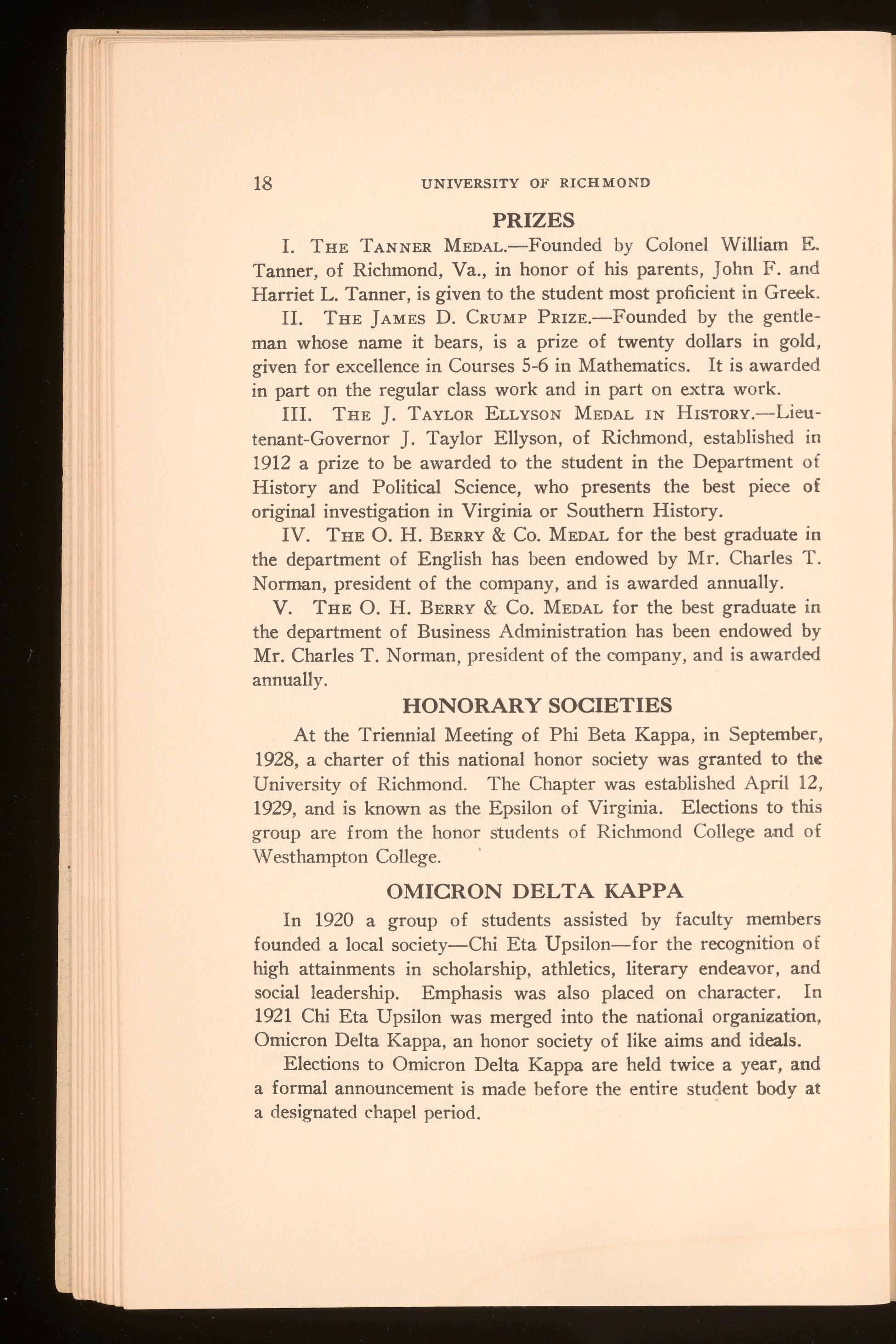
UNIVERSITYOF RICHMOND PRIZES
I. THE TANNER MEDAL.-Founded by Colonel William E Tanner, of Richmond, Va., in honor of his parents, John F. and Harriet L. Tanner, is given to the student most proficient in Greek.
II. THE JAMES D. CRUMP PRIZE.-Founded by the gentleman whose name it bears, is a prize of twenty dollars in gold , given for excellence in Courses 5-6 in Mathematics. It is awarded in part on the regular class work and in part on extra work.
III. THE J. TAYLORELLYSONMEDAL IN H1sTORY.-Lieutenant-Governor ]. Taylor Ellyson, of Richmond, established in 1912 a prize to be awarded to the student in the Department of History and Political Science, who presents the best piece of original investigation in Virginia or Southern History.
IV. THE 0. H. BERRY& Co. MEDALfor the best graduate in the department of English has been endowed by Mr. Charles T. Norman, president of the company, and is awarded annually.
V. THE 0. H. BERRY& Co. MEDALfor the best graduate in the department of Business Administration has been endowed by Mr. Charles T. Norman, president of the company, and is awarded annually.
HONORARY SOCIETIES
At the Triennial Meeting of Phi Beta Kappa, in September , 1928, a charter of this national honor society was granted to the University of Richmond. The Chapter was established April 12, 1929, and is known as the Epsilon of Virginia. Elections to this group are from the honor students of Richmond College and of Westhampton College. ·
OMICRON DELTA KAPPA
In 1920 a group of students assisted by faculty members founded a local society-Chi Eta Upsilon-for the recognition of high attainments in scholarship, athletics, literary endeavor, and social leadership. Emphasis was also placed on character. In 1921 Chi Eta Upsilon was merged into the nationai organi1Zation , Omicron Delta Kappa, an honor society of like aims and ideals. Elections to Omicron Delta Kappa are held twice a year, and a formal announcement is made before the entire student body at a designated chapel period.

RELIGIOUS SERVICES
Students have easy access to all the advantages afforded by the various city and suburban churches, with their Bible classes and Sunday schools. Prayer meetings conducted by the students themselves are held once, or oftener, every week. On Sundays, at 7 :00 P. M., Richm ond College and Westhampton College unite in a Vesper Service for praise and prayer and a brief spiritual message.
ASSEMBLIES
St u de n ts a nd Facult y will attend th e College assemblie s from 12 t o 12 :45 o'clock on Wednesdays and Friday s. The Wednesday m eetin g will be for Richmond College only; that of Friday a conver cat ion o f Richmond and Westhampton Colleges. Exercises will be cond u ct ed by th e Pre sid ent , Dean , or other members of the Faculty. Fro m tim e t o time speak e r s will be invited to discuss educational, civ ic and r elig iou s theme s.
THE THOMAS LEGrURES
These Lectures are provided by "The Thomas Museum Lecture Endowment" of $11 ,000 donated by his family in memory of the late president of the corporation, James Thomas, Jr. They are deliTered annually by eminent men on Science, Philosophy, Art or Literature and are open to the public without charg-e. Among the distinguished scholars who have delivered lectures on this Foundation are :
President Woodrow Wilson , Sir Robert Ball, Dr. Henry Van Dyke, Dr B. L. Gildersleeve, Dr. Walter Hines Page, Dr. George E. Vincent, Dr. Robert A. Millikan, Dr. J. Holland Rose and Dr. Stephen B. Leacock.
THE JACOB BILLIKOPF LECTURES
T he se public lectures in the field of the social sciences are prov ided by an alumnus of the University of Richmond, Jacob Billikopf , LL.D. , of Philadelphia. The first course was given in May , _ 1930, by Dr. John H. Finley, of the New York Times .
UNIVERSITY WEEK
University Week was organized in 1927, and has become an annual event. The object of University Week is to bring to the campus friends of the University, particularly alumni, and to offer them intellectual stimulus and entertainment.
The speakers in O ctober , 19 30, were: Dr. John Stewart Bryan , p ublisher o f the New s Leader; President Karl T. Compton, of M assachusetts Institut e of Technolog y ; Dr. Roscoe R. Spencer , Dir ector of the H ygienic Laboratory , U. S . Public Health Service; Dr George Howe , of the Universit y of North Carolina, and Dr. F ranco Brun o Averadi, of the Universit y of Turin. The dates for U niver sity W eek in 1930 are October 13th, 14th , 15th and 16th .
SOCIE11Y OF ALUMNI
The Alumni of the College have long been organized into a Society, which holds annual meetings to renew old associations, maintain a close connection with Alma Mater, and further the cause of education and letters. At the annual meeting in June, 1927, it was voted to change some of the plans of organization and the Executive Committee arranged to have a business meeting in the afternoon of Monday during Commencement Week and to hold a dinner in the evening of the same day. It was also voted to engage the services of an Alumni Secretary and to publish an Alumni Magazine. These changes were put into effect during 1928. The officers of the Society are :
W. L. 0 1FLAH ERTY
PARKE P DEA NS .•...............
L. H. WALTO N, D. D ..........
LEON BAZILE
H. B. HANDY , '06

President
.First Vice-President
Vice-President
Vice-President
etary-Treasurer
LOCAL CHAP'PERS
In May, 1898, there was organized in Louisville, Ky., a local chapter of the General Society of Alumni, to be called the "Kentucky Chapter." Since that time other chapters have been organ-
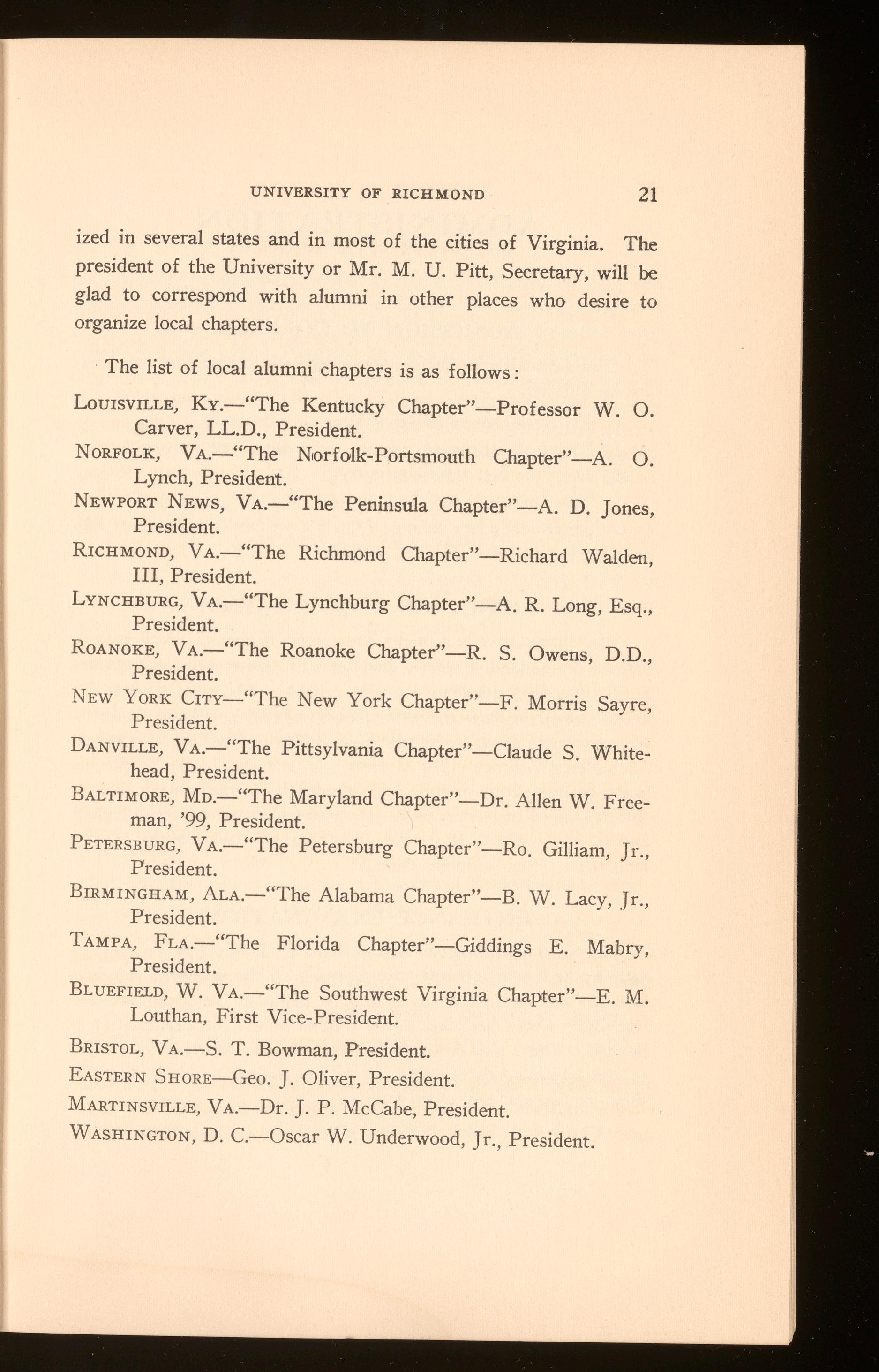
UNIVERSITYOF RICHMOND 21
ized in several states and in most of the cities of Virginia. The president of the University or Mr. M. U. Pitt, Secretary, will be glad to correspond with alumni in other places who desire to organize local chapters.
· The list of local alumni chapters is as follows :
LouISVILLE, KY.-"The Kentucky Chapter"-Professor W. 0. Carver, LL.D., President.
NORFOLK, VA.-"The Norfolk-Portsmouth Chapter"-A. 0. Lynch, President.
NEWPORTNEWS, VA.-"The Peninsula Chapter"-A. D. Jones, President.
RICHMOND, VA.-"The Richmond Chapter"-Richard Walden, III, President.
LYNCHBURG , VA.-"The Lynchburg Chapter"-A. R. Long, Esq., President.
RoANOKE, VA.-"The Roanoke Chapter"-R. S. Owens, D.D., President.
N Ew YORK CITY-"The New York Chapter"-F. Morris Sayre, President .
DANVILLE,VA.-"The Pittsylvania Chapter"-Claude S. Whitehead, President.
BALTIMORE,MD.-"The Maryland Chapter"-Dr. Allen W. Freeman, '99, President.
PETERSBURG , V A.-"The Petersburg Chapter"-Ro. Gilliam, Jr., President.
BIRMINGHAM , ALA.-"The Alabama Chapter"-B. W. Lacy, Jr., President.
TAMPA , FLA.-"The Florida Chapter"-Giddings E. Mabry, President.
BLUEFIELD , W. VA.-"The Southwest Virginia Chapter"-E. M. Louthan, First Vice-President.
BRISTOL,VA.-S. T. Bowman, President.
EASTERNSHORE-Geo. J. Oliver, President.
MARTINSVILLE,VA -Dr. J. P. McCabe, President.
WASHINGTON,D. C.-Oscar W. Underwood, Jr., President.

ADMINISTRATION
ADMISSION TO COLLEGE
For admission to Richmond College the general requirements are as follows :
1. The applicant must be at least sixteen years of age.
2. The applicant must present a certificate of honorable dismissal from the last school attended.
3. The applicant may be admitted ( 1) on a certificate from an accredited secondary school; (2) on a written examination; (3) on a transcript from another colle~e
ENTRANCE REQUIREMENTS
The entrance requirements are stated in units. A unit represents a standard session's study in any subject, and constitutes approximately a quarter of a year's work. The requirements are graduation from an accredited secondary school , with not less than fifteen acceptable units distributed as follows: English, 3; Algebra, 1_½; Plane Geometry , 1; History, 1; Science, 1; the remaining units elective from high school graduation requirements, except that not more than four units of vocational work will be accepted, and no credit will be allowed for less than two units in any foreign language. ( See footnote, page 33.)
ENTRANCE EXAMINATIONS
Entrance examinations will be held at the College on the two days immediately preceding the opening of the session. Application for such examination should be made to the Dean not less than four weeks previous to the time at which the examination is desired. There will be no charge for entrance examinations taken on the scheduled dates, but a fee of two dollars will be charged if they are taken at any other time.
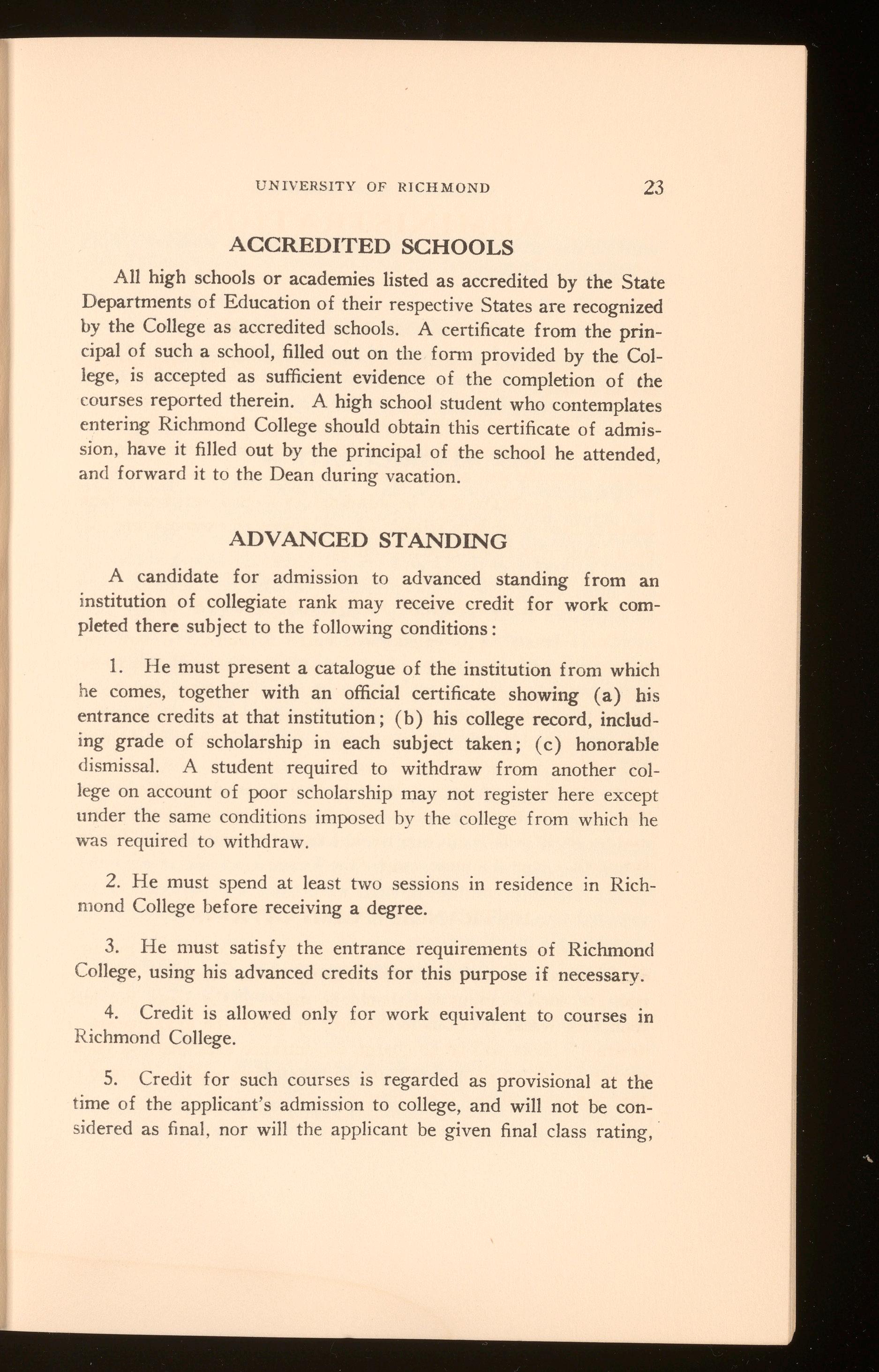
ACCREDITED SCHOOLS
All high schools or academies listed as accredited by the State Departments of Education of their respective States are recognized by the College as accredited schools. A certificate from the principal of such a school, filled out on the form provided by the College, is accepted as sufficient evidence of the completion of the courses reported therein. A high school student who contemplates entering Richmond College should obtain this certificate of admission, have it filled out by the principal of the school he attended, and forward it to the Dean during vacation.
ADVANCED STANDING
A candidate for admission to advanced standing from an institution of collegiate rank may receive credit for work completed there subject to the following conditions:
1. He must present a catalogue of the institution from which he comes, together with an official certificate showing (a) his entrance credits at that institution; (b) his college record, including grade of scholarship in each subject taken; (c) honorable dismissal. A student required to withdraw from another college on account of poor scholarship may not register here except under the same conditions imposed by the college from which he was required to withdraw.
2. He must spend at least two sessions m residence m Richmond College before receiving a degree.
3. He must satisfy the entrance requirements of Richmond College, using his advanced credits for this purpose if necessary.
4. Credit is allowed only for work equivalent to courses in Richmond College.
5. Credit for such courses is regarded as provisional at the time of the applicant's admission to college, and will not be considered as final, nor will the applicant be given final class rating, ·
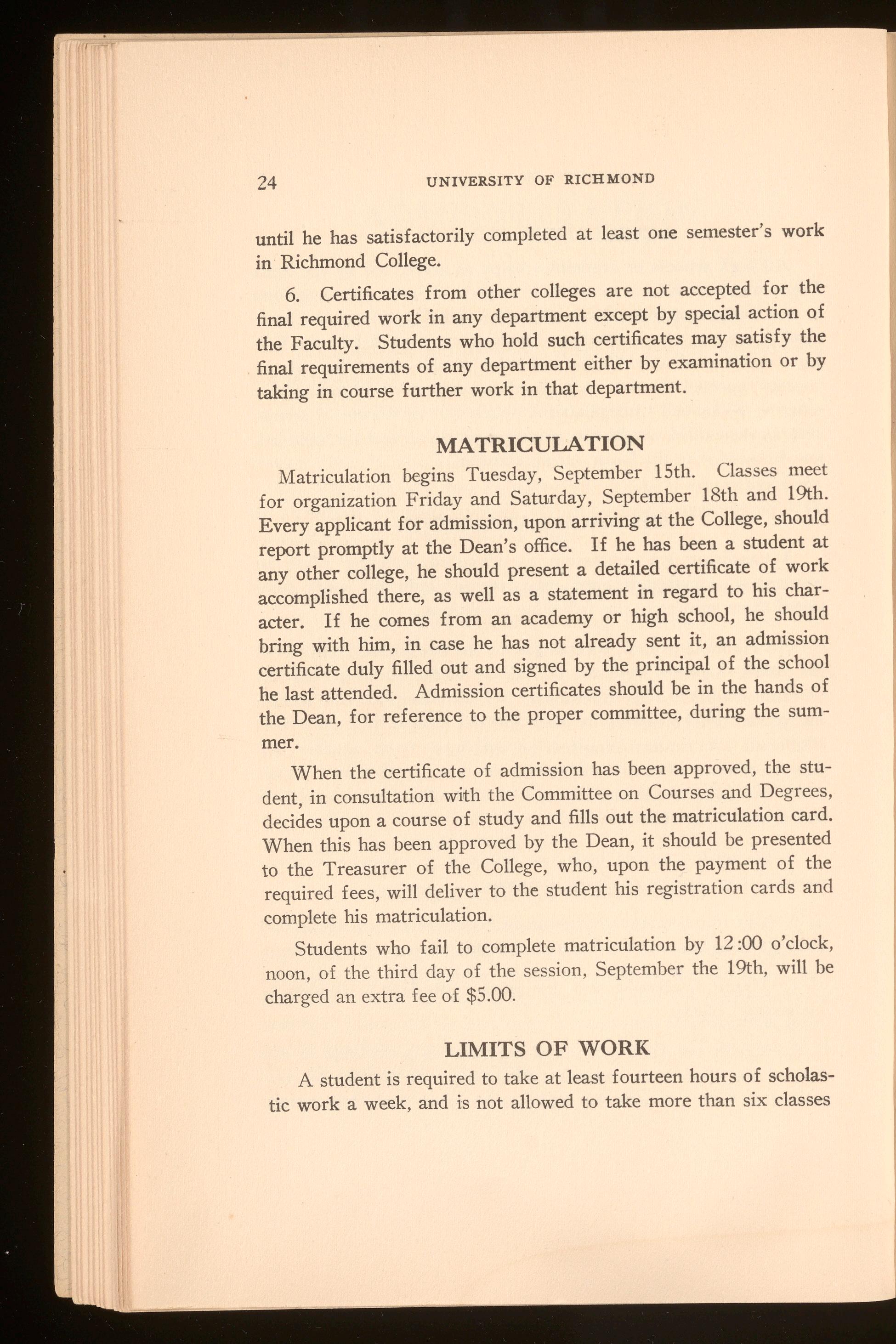
until he has satisfactorily completed at least one semester's work in Richmond College.
6. Certificates from other colleges are not accepted for the final required work in any department except by special action of the Faculty. Students who hold such certificates may satisfy the final requirements of any department either by examination or by taking in course further work in that department.
MATRICULATION
Matriculation begins Tuesday, September 15th. Classes meet for organization Friday and Saturday, September 18th and 19th. Every applicant for admission, upon arriving at the College, should report promptly at the Dean's office. If he has been a student at any other college, he should present a detailed certificate of work accomplished there, as well as a statement in regard to his character. If he comes from an academy or high school, he should bring with him, in case he has not already sent it, an admission certificate duly filled out and signed by the principal of the school he last attended. Admission certificates should be in the hands of the Dean, for reference to the proper committee, during the summer.
When the certificate of admission has been approved, the student, in consultation with the Committee on Courses and Degrees, decides upon a course of study and fills out the matriculation card. When this has been approved by the Dean, it should be presented to the Treasurer of the College, who, upon the payment of the required fees, will deliver to the student his registration cards and complete his matriculation.
Students who fail to complete matriculation by 12 :00 o'clock, noon , of the third day of the session , Sept ember the 19th, will be charged an extra fee of $5.00.
LIMITS OF WORK
A student is required to take at least fourteen hours of scholastic work a week, and is not allowed to take more than six classes
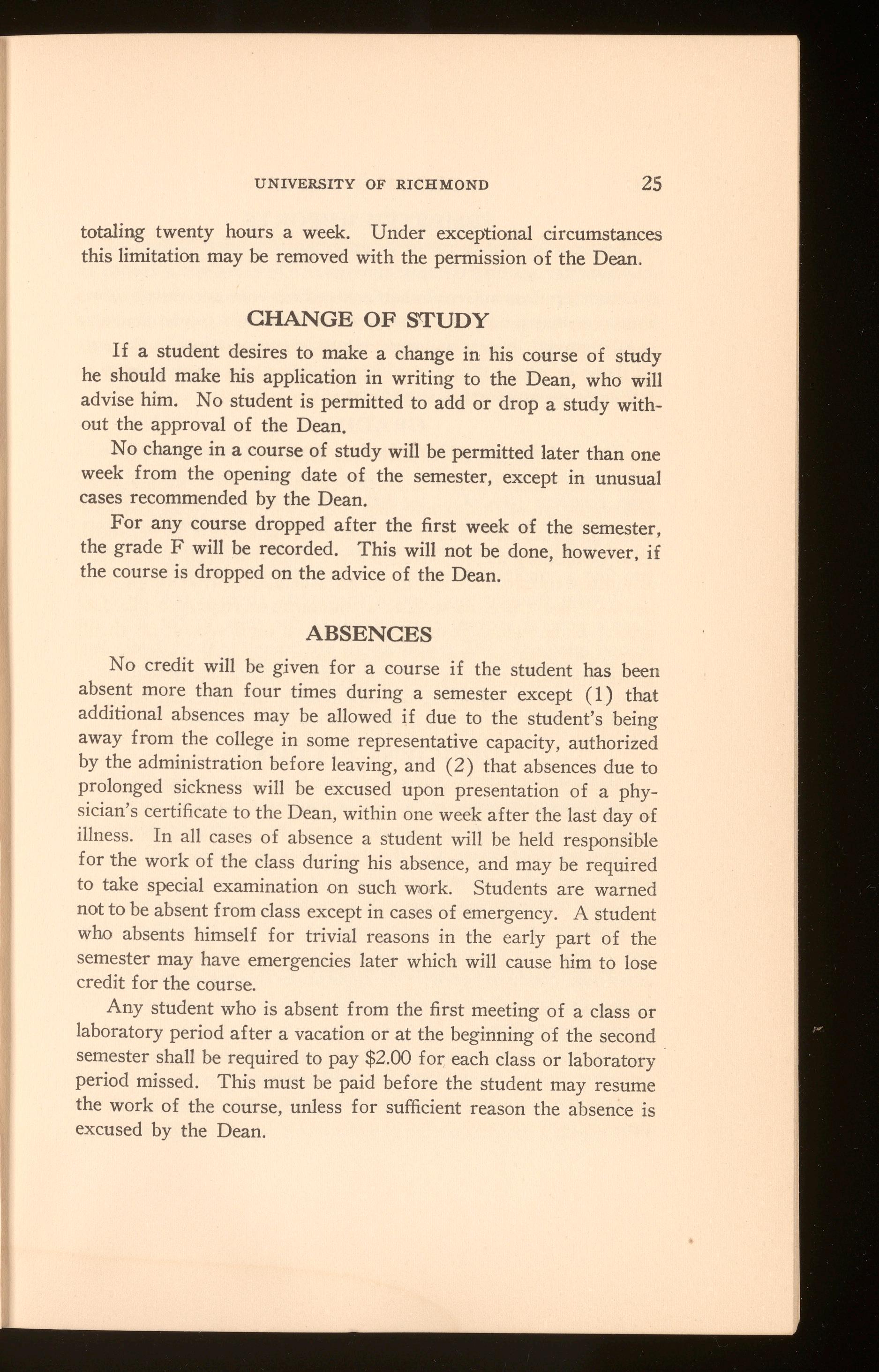
totaling twenty hours a week. Under exceptional circumstances this limitation may be removed with the permission of the Dean.
CHANGE OF STUDY
If a student desires to make a change in his course of study he should make his application in writing to the Dean, who will advise him. No student is permitted to add or drop a study without the approval of the Dean.
No change in a course of study will be permitted later than one week from the opening date of the semester, except in unusual cases recommended by the Dean.
For any course dropped after the first week of the semester, the grade F will be recorded. This will not be done, however, if the course is dropped on the advice of the Dean.
ABSENCES
No credit will be given for a course if the student has been absent more than four times during a semester except ( 1) that additional absences may be allowed if due to the student's being away from the college in some representative capacity, authorized by the administration before leaving, and (2) that absences due to prolonged sickness will be excused upon presentation of a physician ' s certificat e to the Dean, within one week after the last day of illne ss. In all cases of absence a student will be held responsible for the work of the class during his absence, and may be required to take special examination on such wiork. Students are warned not to be absent from class except in cases of emergency. A student who absents himself for trivial reasons in the early part of th e semester may have emergencies later which will cause him to lose credit for the course.
Any student who is absent from the first meeting of a class or laboratory period after a vacation or at the beginning of the second . semester shall be required to pay $2.00 for each class or laboratory period missed. This must be paid before the student may resume the work of the course, unless for sufficient reason the absence is excused by the Dean.
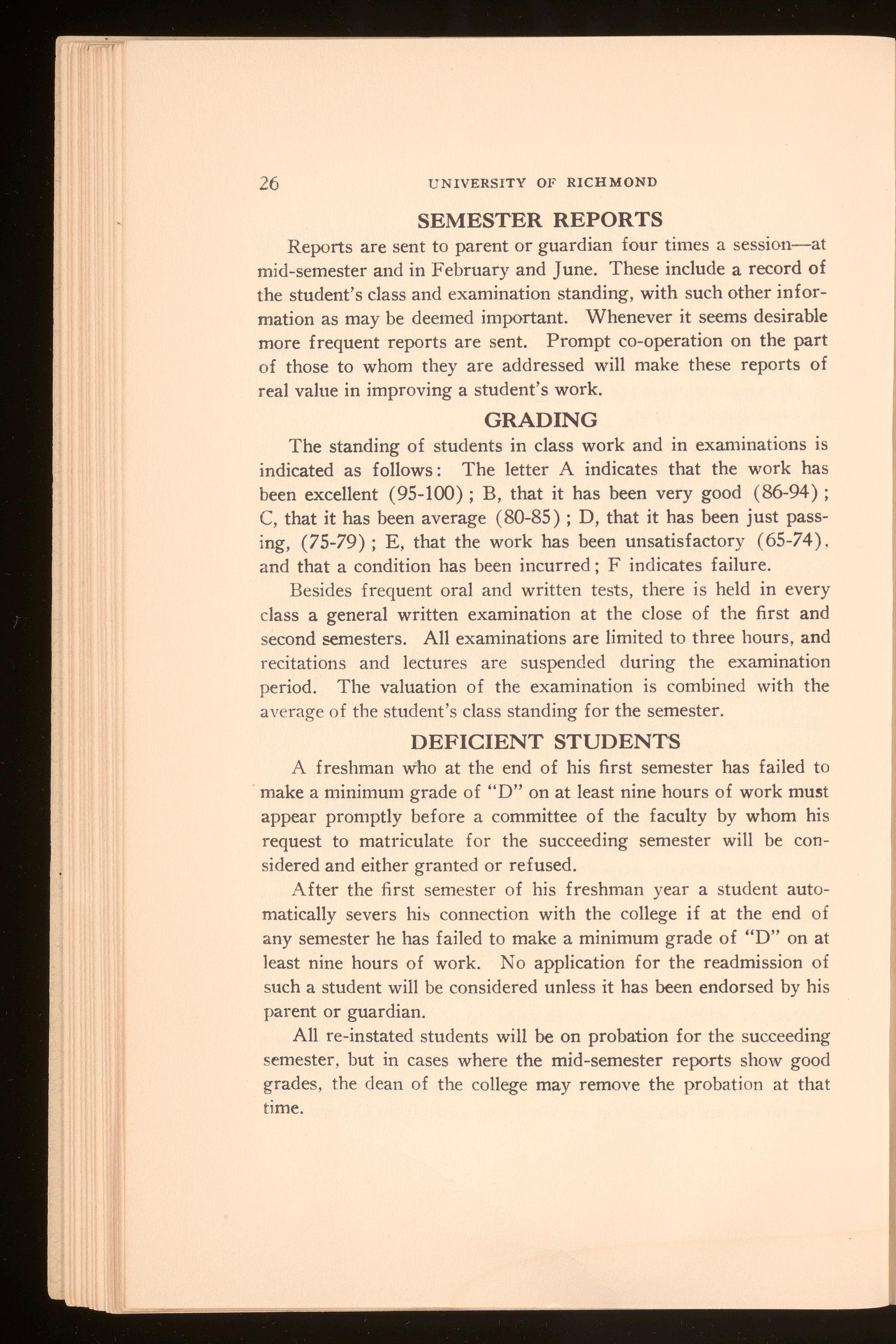
SEMESTER REPORTS
Reports are sent to parent or guardian four times a session-at mid-semester and in February and June. These include a record of the student's class and examination standing, with such other information as may be deemed important. Whenever it seems desirable more frequent reports are sent. Prompt co-operation on the part of those to whom they are addressed will make these reports of real value in improving a student's work.
GRADING
The standing of students in class work and in examinations is indicated as follows: The letter A indicates that the work has been excellent (95-100); B, that it has been very good (86-94); C, that it has been average (80-85) ; D, that it has been just passing, (75-79); E, that the work has been unsatisfactory (65-74). and that a condition has been incurred; F indicates failure.
Besides frequent oral and written tests, there is held in every class a general written examination at the close of the first and second semesters. All examinations are limited to three hours, and recitations and lectures are suspended during the examination period. The valuation of the examination is combined with the ave rag e of the student's class standing for the semester.
DEFICIENT STUDENTS
A freshman who at the end of his first semester has failed to make a minimum grade of "D" on at least nine hours of work must appear promptly before a committee of the faculty by whom his request to matriculate for the succeeding semester will be considered and either granted or refused.
After the first semester of his freshman year a student automatically severs hi~ connection with the college if at the end of any semester he has failed to make a minimum grade of "D" on at least nine hours of work. No application for the readmission of such a student will be considered unless it has been endorsed by his parent or guardian.
All re-instated students will be on probation for the succeeding semester, but in cases where the mid-semester repo -rts show good grades, the dean of the college may remove the probati on at that t ime.

PROBATION
A student whose class work is deficient should give extra time . to study. Consequently, while on probation, he is not permitted to participate in student activities, such as athletics, debating, dramatics and musical organizations, or to represent the coJlege in any public capacity. He is required to report periodically to his faculty adviser as to his progress in his studies.
When a student is put on probation, his parent or guardian will be immediately notified.
REMOVAL OF CONDITIONS
A student who has been conditioned on a semester's work must remove this condition before the beginning of the corresponding semester in the following college year, or the condition automatically becomes a failure. If both semesters of a course are conditioned, no special examination is allowed. The course must be repeated. Special examinations for the removal of conditions may be given only on the dates specified in the college calendar, and upon authorization from the Dean's office, preceded by the payment of a fee of two dollars. All arrangements for special examinations must be made at least two weeks before the date of the examination. A student is permitted only one special examination on any condition. Failure to pass this converts the condition into a failure.
All Seniors must make up all conditions of previous sessions by the end of the first semester. A Senior may not make up by special examination a deficiency on more than one subject taken in the Senior year, and this examination may not be given until the end of the second semester. If at the encl of the first semester a Senior has been conditioned on as many as two subjects, he cannot remain a member of the Senior Class without special action of the Faculty.
REGULATIONS GOVERNING ATHLETICS
1. The President of the University has general oversight and control of athletics, and is authorized to forbid any features in these exercises which endanger the health or morals of the participants.
2. Each team is allowed four trips from College, provided t hat these four trips do not involve being away from College more

UNIVERSITY
OF RICHMOND
than seven days, and that no one trip shall require more than three days' absence from College duties. At least one day before the departure of any team the coach, through the manager, must furnish the Dean of the College a list of the men who will compose the team.
3. Athletic teams are permitted to engage in contests away from Richmond only with teams from other institutions of learning.
Richmond College holds membership in the Virginia Inter-Collegiate Athletic Conference, and members of all teams are expected to conform to the following by-laws of the Conference:
ELIGIBILITY
SECTION1.-Bona Fide Students-Only bona fide students shall play in this conference. A bona fide student is one who is pursuing regularly a course of at least twelve hours of work a week in the college at which he is matriculated, and who shall have offered for college entrance at least fifteen Carnegie units made up from those subjects announced in the current catalogue of the college at which the student is matriculated, as accepted for entrance.
SECTION2.-The One Year Residence Rule-No student shall participate in any Varsity contest until he has been in residence one college year. A "college year" shall be construed to mean enrollment from September to June. This rule is to become effective October 1, 1928, except for Lynchburg College and Bridgewater College where it shall become effective October 1, 1932.
SECTION3.-The Migratory Rule-No student who has attended an institution of collegiate grade and while there participated in any varsity game or contest and thereafter enters a college of this conference shall be eligible. An institution of collegiate grade shall be understood to be one offering four years of coll ege w ork. Tran s fer s from a Junior college , or other institution not offering a four-year course may be allowed to continue their athletic careers at the institution to which they transfer, providing they conform to the one year residence rule
SECTION4 -Date of Matriculation--No student shall play in this conference during the college year unless he has matriculated for the current session on or before October 1st.
SECTION5.-Leaving College-No student who has participated in intercollegiate athletics and who for any cause fails to remain in coll ege the entire session may thereafter participate in intercollegiate athletics until he has been in residence an entir e college year reckoned from the date of his return to college. A "college year" shall here be construed to mean two consecutive semesters, or three quarters. Attendance at a summer session shall not be counted for the purpose cf this rule.
SECTION6.-Three-Year Limit-No student shall be eligible in this Conference who has participated in Varsity contests three years, irrespective of
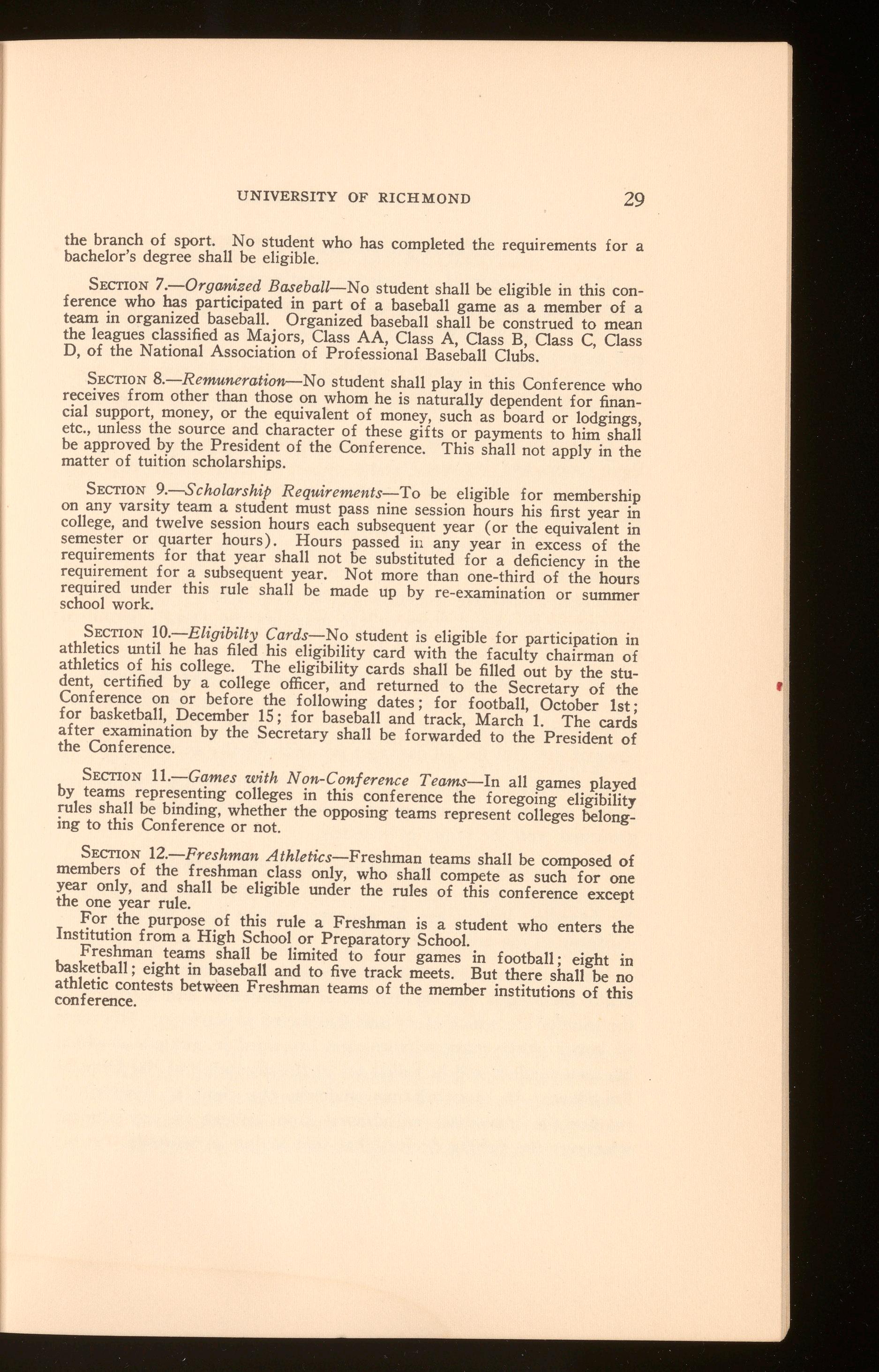
the branch of sport. No student who has completed the requirements for a bachelor 's degree shall be eligible.
SECTION7.-0rganized Baseball-No student shall be eligible in this con- ference who has participated in part of a baseball game as a member of a team in organized baseball. Organized baseball shall be construed to mean the leagues classified as Majors, Class AA, Class A, Class B, Oass C, Class D, of the National Association of Professional Baseball Clubs.
SECTION8.-Remuneration-No student shall play in this Conference who receives from other than those on whom he is naturally dependent for finan- cial support, money, or the equivalent of money, such as board or lodgings, etc., unless the source and character of these gifts or payments to him shall be approved by the President of the Conference This shall not apply in the matter of tuition scholarships.
SECTION9.-Scholarship Requirements-To be eligible for membership on any varsity team a student must pass nine session hours his first year in college, and twelve session hours each subsequent year ( or the equivalent in semester or quarter hours). Hours passed in any year in excess of the requirements for that year shall not be substituted for a deficiency in the requirement for a subsequent year. Not more than one-third of the hours required under this rule shall be made up by re-examination or summer school work.
SECTION10.-Eligibilty Cards-No student is eligible for participation in athletics until he has filed his eligibility card with the faculty chairman of athletics of his college The eligibility cards shall be filled out by the stu- dent, certified by a college officer, and returned to the Secretary of the Conference on or before the following dates ; for football, October 1st; for basketball, December 15 ; for baseball and track, March 1. The cards after examination by the Secretary shall be forwarded to the President of the Conference.
SECTION11.-Games with Non-Conference Teams-In all games played by teams representing colleges in this conference the foregoing eligibility rules shall be binding, whether the opposing teams represent colleges belong- ing to this Conference or not.
SECTION12.-Freshman Athletics-Freshman teams shall be composed of members of the freshman class only, who shall compete as such for one year only, and shall be eligible under the rules of this conference except the one year rule.
For the purpose of this rule a Freshman is a student who enters the Institution from a High School or Preparatory School.
Freshman teams shall be limited to four games in football; eight in basketball ; eight in baseball and to five track meets. But there shall be no athletic contests between Freshman teams of the member institutions of this conference.

GENERAL REGULATIONS
The deportment of a Christian gentleman is the standard to which every student is expected to conform. All appropriate means are used to develop and confirm a sense of personal honor and sacred regard for truth, as upon these rests the best reliance for good conduct. A few plain and reasonable rules are prescribed, and each matriculate must pledge himself to obey them .
1. Occupants will be held responsible for the good order of their rooms and for any damage or defacement. Changes from one room to another may be allowed by the Dean, but must not be made without his consent.
2. A resident student desiring to leave the premises during the hours when, by the schedule of recitations, he should be in hiii classes, shall get permission from the Dean. Any student desiring to be absent from college must get the Dean's permit in writing and show it to each of his professors.
3 If a student destroys, defaces, or in any way damages college property, or aids and abets others in so doing, he shall within twenty-four hours report the fact to the Dean. Students will be charged pro rata for all damages not individually accounted for.
4. No club or society may be formed unless the Faculty approves its plan and purpose, the rules by which it propoi;es to be governed, and the hours of meeting.
5. Resident students desiring to board elsewhere than on the college premises must first obtain the approval of the Dean . No boarding houses can be approved whose meal hours do not conform to the college schedule.
In the observance of these rules and in all matters not specifically mentioned, the deportment of a gentleman and a student is the standard to which every one is expected to conform. His sense of honor is the main reliance, and his word in matters touching his own conduct will be called for at the discretion of the Dean or President. In matriculating students, the right is reserved to require the immediate withdrawal from college of any student whenever the faculty decides that such action is desirable.
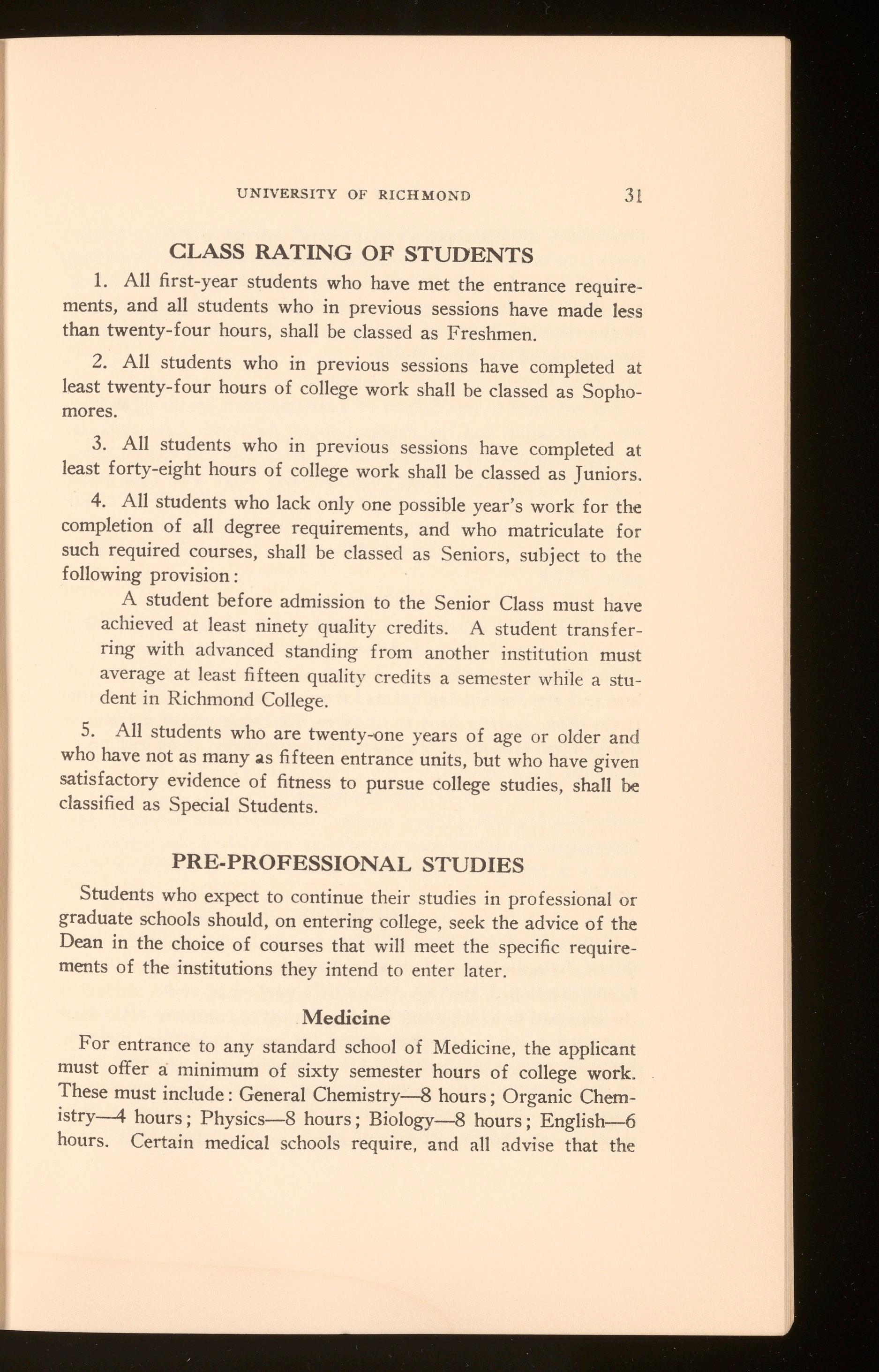
CLASS RA TING OF STUDENTS
1. All first-year students who have met the entrance requirements, and all students who in previous sessions have made less than twenty-four hours, shall be classed as Freshmen.
2. All students who in previous sessions have completed at least twenty-four hours of college work shall be classed as Sophomores.
3. All students who in previous sessions have completed at least forty-eight hours of college work shall be classed as Juniors.
4. All students who lack only one possible year's work for the completion of all degree requirements, and who matriculate for such required courses, shall be classed as Seniors, subject to the following provision :
A student before admission to the Senior Class must have achieved at least ninety quality credits. A student transferring with advanced standing from another institution must average at least fifteen quality credits a semester while a student in Richmond College.
5. All students who are twenty-one years of age or older and who have not as many as fifteen entrance units, but who have given satisfactory evidence of fitness to pursue college studies, shall be classified as Special Students.
PRE-PROFESSIONAL STUDIES
Students who expect to continue their studies in professional or graduate schools should, on entering college , seek the advice of the Dean in the choice of courses that will meet the specific requirements of the institutions they intend to enter later.
Medicine
For entrance to any standard school of Medicine, the applicant must offer a minimum of sixty semester hours of college work. These must include: General Chemistry-8 hours; Organic Chemistry-4 hours ; Physics-8 hours ; Biology-8 hours ; English-6 hours. Certain medical schools require, and all advise that the

UNIVERSITY OF RICHMOND
pre-medical student take three years in college ( ninety semester hours), to better meet the exacting demands of the modern science of Medicine. Attention is called to the opportunity of substituting one year's work at an approved medical school for twenty-four of the required hours of the degree of Bachelor of Science, as stated in detail on pages 34-35.
Law
For entrance to any School of Law approved by the America11 Bar Association and the Association of American Law Schools, the applicant must offer a minimum of sixty hours of college work. These may be so chosen that, together with forty additional hours in Richmond College and the first year in the T. C. Williams School of Law of the University of Richmond, they will meet the requirements for the degree of Bachelor of Arts, as stated on pages 33-34.
Dentistry
The entrance requirements for standard schools of Dentistry are a minimum of thirty semester hours, including : Chemistry-6 hours ; Biology-6 hours; English-6 hours, and Physics-6 hours, if the student has not had a unit of Physics in high school. If the three sciences have to be taken, the minimum time required is a regular session and a summer school session. Two full years in college are advised.
Engineering
By choosing the proper courses in Mathematics, Science and Languages, a student may transfer at the end of the sophomore year to a school of Engineering without loss of credits or class standing.
DEGREES
The following degrees are offered in Richmond College : Bachelor of Arts, Bachelor of Science, Bachelor of Science in Business Administration, Master of Arts, and Master of Science.
The academic requirements for the several degrees are stated in semester hours, one class period per week through a semester being the unit. Quality credits are calculated from academic hours on the following basis : A semester hour passed with grade A shall count three quality credits; with grade B, two quality credits; with grade C, one quality credit; with grade D, no quality credit. It is
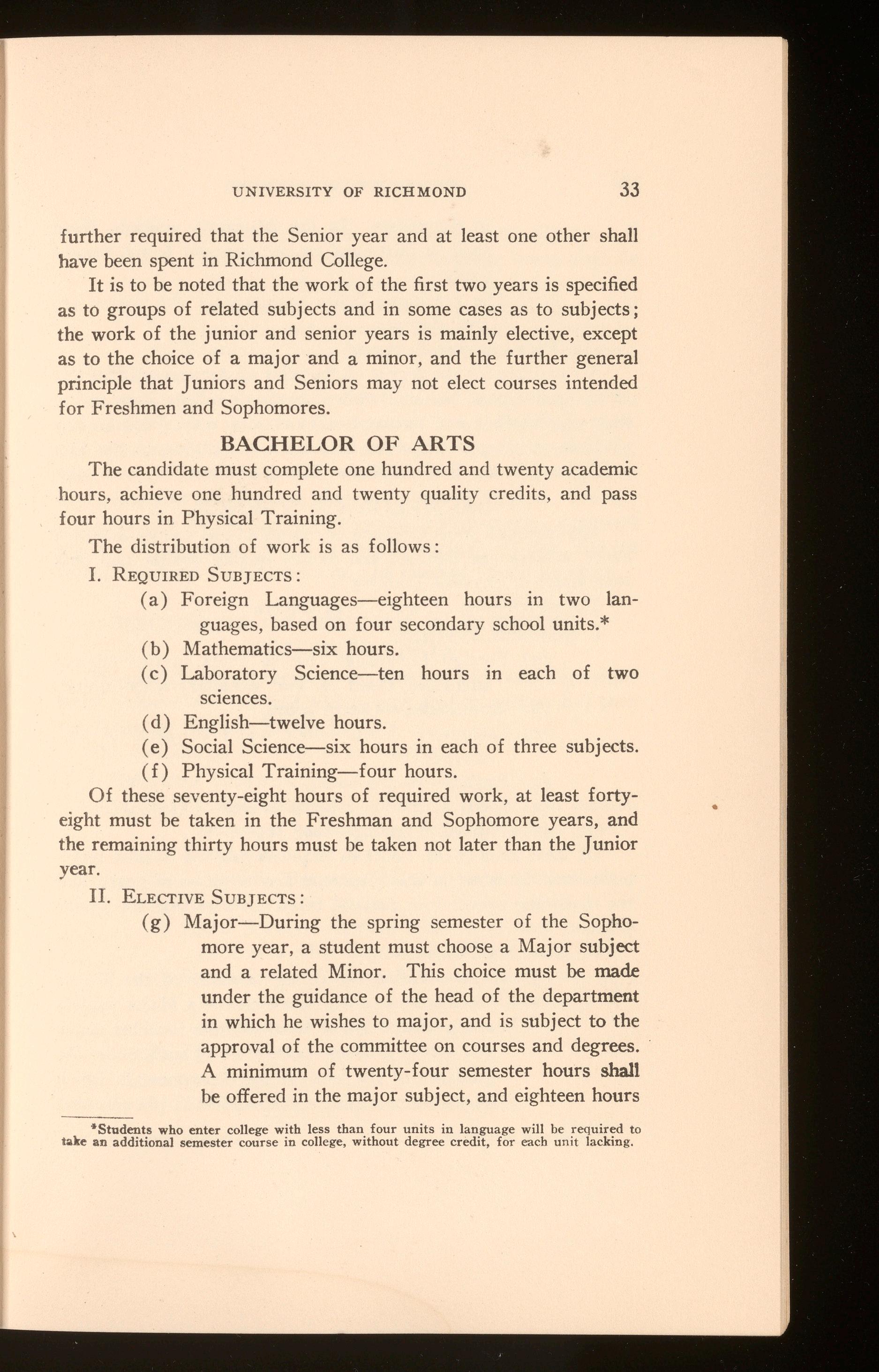
further required that the Senior year and at least one other shall have been spent in Richmond College.
It is to be noted that the work of the first two years is specified as to groups of related subjects and in some cases as to subjects; the work of the junior and senior years is mainly elective, except as to the choice of a major and a minor, and the further general principle that Juniors and Seniors may not elect courses intended for Freshmen and Sophomores.
BACHELOR OF ARTS
The candidate must complete one hundred and twenty academic hours, achieve one hundred and twenty quality credits, and pass four hours in Physical Training.
The distribution of work is as follows :
I. REQUIRED SUBJECTS:
(a) Foreign Languages-eighteen hours in two languages, based on four secondary school units.*
(b) Mathematics-six hours.
( c) Laboratory Science-ten hours in each of two sciences.
( d) English-twelve hours.
( e) Social Science-six hours in each of three subjects.
( f) Physical Training-four hours.
Of these seventy-eight hours of required work, at least fortyeight must be taken in the Freshman and Sophomore years, and the remaining thirty hours must be taken not later than the Junior year.
II ELECTIVE SUBJECTS:
(g) Major-During the spring semester of the Sophomore year, a student must choose a Major subject and a related Minor. This choice must be made under the guidance of the head of the department in which he wishes to major, and is subject to the approval of the committee on courses and degrees. A minimum of twenty-four semester hours shalt be offered in the major subject, and eighteen hours
•students who enter college with less than four units in language will be required to take an additional semester course in college, without degree credit, for each unit lacking.
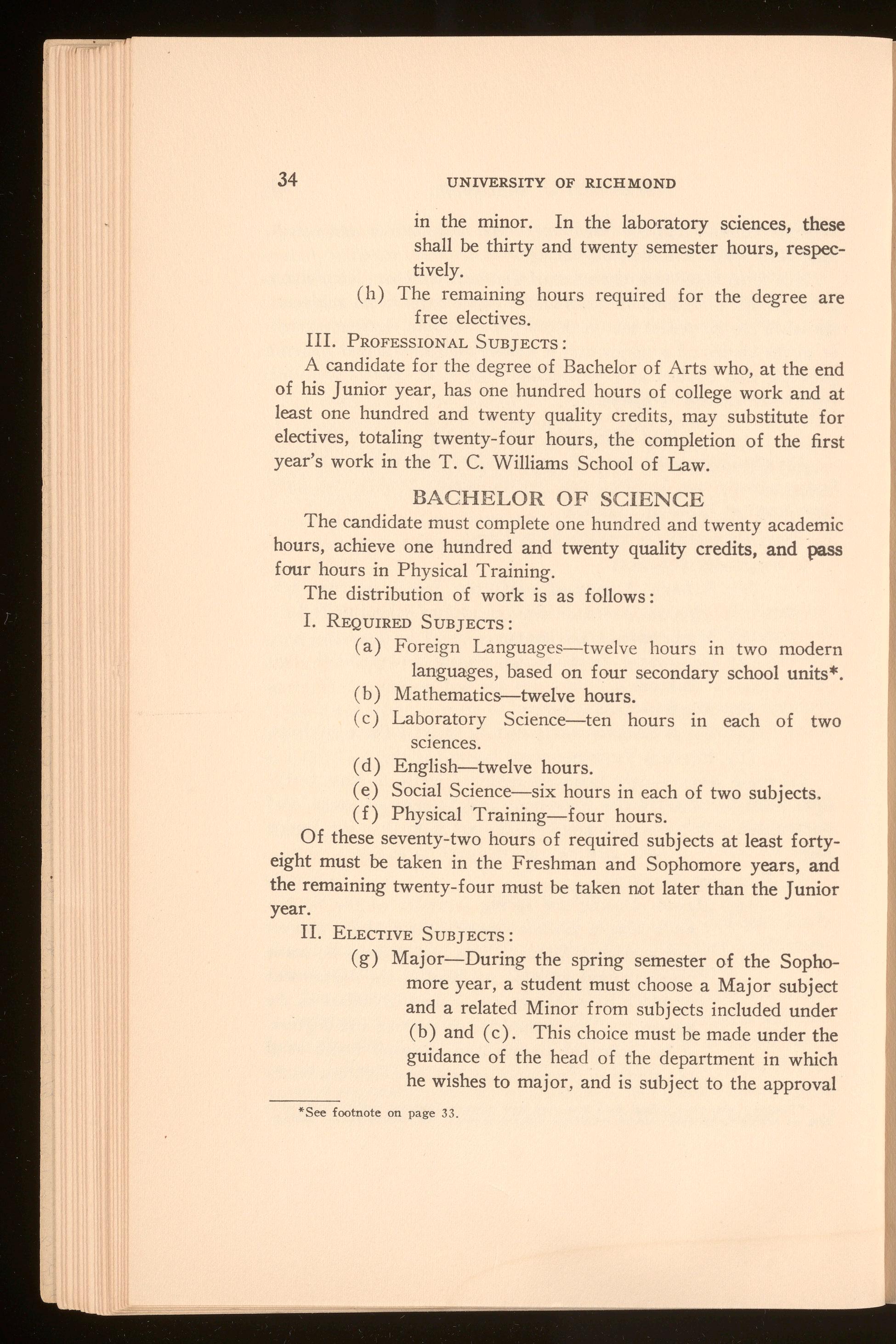
UNIVERSITY OF RICHMOND
in the minor. In the laboratory sciences, these shall be thirty and twenty semester hours, respectively.
( h) The remaining hours required for the degree are free electives.
III. PROFESSIONAL SUBJECTS:
A candidate for the degree of Bachelor of Arts who, at the end of his Junior year, has one hundred hours of college work and at least one hundred and twenty quality credits, may substitute for electives, totaling twenty-four hours, the completion of the first year's work in the T. C. Williams School of Law.
BACHELOR OF SC IENCE
The candidate must complete one hundred and twenty academic hours, achieve one hundred and twenty quality credits, and pass four hours in Physical Training.
The distribution of work is as follows:
I. REQUIRED SUBJECTS:
(a) Foreign Langua ge s-twelve hours in two modern languages, based on four secondary school units*.
( b) Mathematics-twelve hours.
( c) Laboratory Science-ten hours in each of two sciences.
( d) English-twelve hours.
( e) Social Science-six hours in each of two subjects .
(f) Physical Training-tour hours.
Of these seventy-two hours of required subjects at least fortyeight must be taken in the Freshman and Sophomore years, and the remaining twenty-four must be taken not later than the Junior year.
II. ELECTIVE SUBJECTS:
(g) Major-During the spring semester of the Sophomore year, a student must choose a Major subject and a related Minor from subjects included under (b) and ( c). This choice must be made under the guidance of the head of the department in which he wishes to major, and is subject to the approval
*See footnote on pag e 33
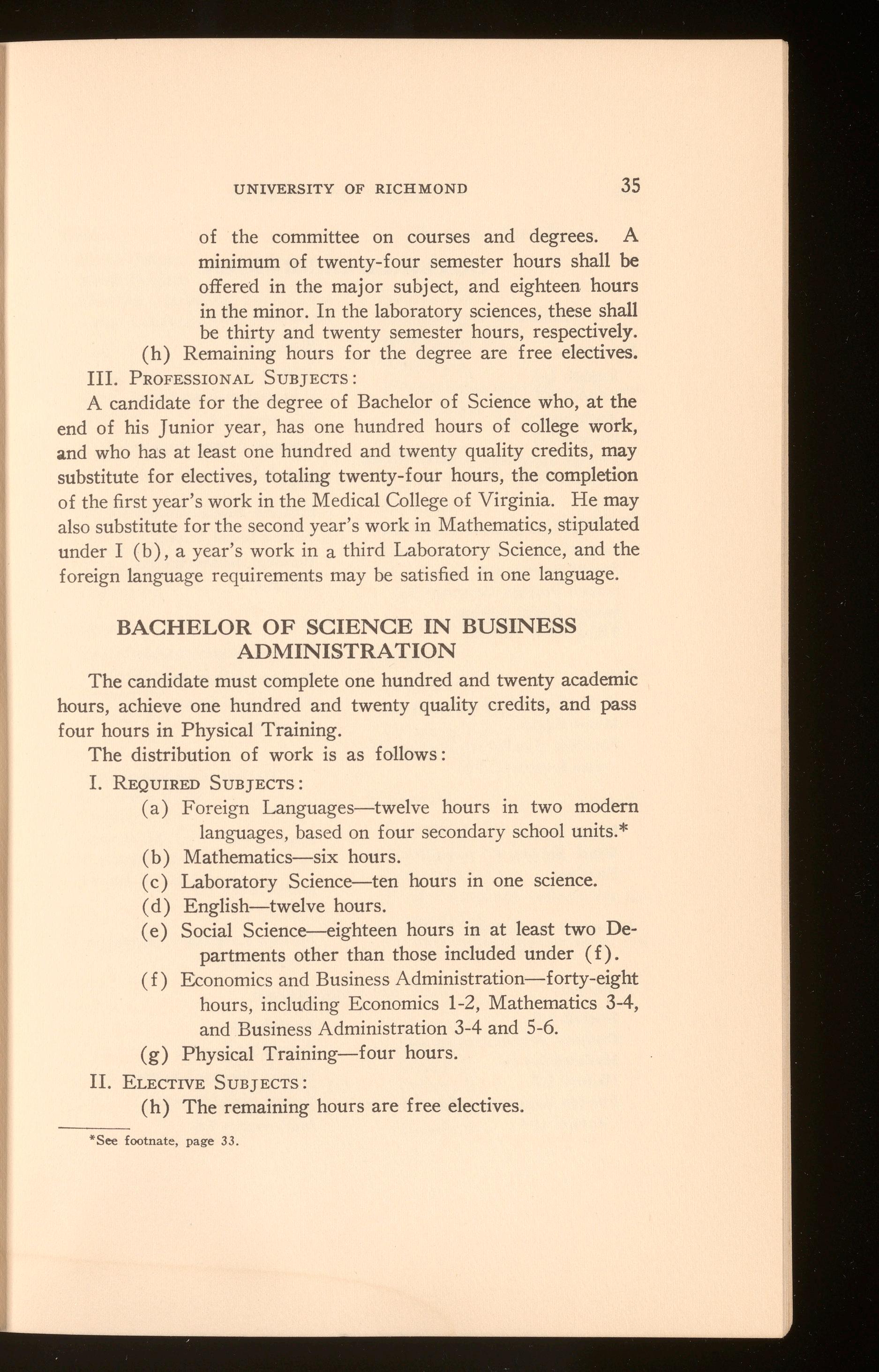
of the committee on courses and degrees. A minimum of twenty-four semester hours shall be offered in the major subject, and eighteen hours in the minor. In the laboratory sciences, these shall be thirty and twenty semester hours, respectively.
(h) Remaining hours for the degree are free electives.
III. PROFESSIONAL SUBJECTS:
A candidate for the degree of Bachelor of Science who, at the end of his Junior year , has one hundred hours of college work, and who has at least one hundred and twenty quality credits, may substitute for electives, totaling twenty-four hours, the completion of the first year's work in the Medical College of Virginia. He may also substitute for the second year's work in Mathematics, stipulated under I (b), a year's work in a third Laboratory Science, and the foreign language requirements may be satisfied in one language.
BACHELOR OF SCIENCE IN BUSINESS ADMINISTRATION
The candidate must complete one hundred and twenty academic hours, achieve one hundred and twenty quality credits, and pass four hours in Physical Training.
The distribution of work is as follows :
I. REQUIRED SUBJECTS:
(a) Foreign Languages-twelve hours in two modern languages, based on four secondary school units.*
(b) Mathematics-six hours.
( c) Laboratory Science-ten hours in one science.
( d) English-twelve hours.
(
e) Social Science-eighteen hours in at least two Departments other than those included under ( f).
( f) Economics and Business Administration-forty-eight hours, including Economics 1-2, Mathematics 3-4, and Business Administration 3-4 and 5-6.
(g) Physical Training-four hours.
II. ELECTIVE SUBJECTS:
(h) The remaining hours are free electives.
*See footnate, page 33

OUTLINED CURRICULA
BACHELOR OF ARTS
Freshman:
English 1-2
Science 1-2
Mathematics 1-2
History 1-2
Foreign Language (offered for entrance) 3-4
Sophomore:
English J-4
Second Science 1-2
Second Foreign Language 1-2
Second Social Science
Third Social Science
Junior:
Major Subject
Minor Subject
Electives (including Second Foreign Language 3-4)
Senior:
Major Subject
Minor Subject (if necessary)
Electives
BACHELOR OF SCIENCE IN BUSINESS ADMINISTRATION
Freshman:
English 1-2
Business Administration 1-2
Mathematics 1-2
History 1-2
Foreign Language ( offered for entrance) 3-4
Sophomore:
English 3-4
Science 1-2
Foreign Language 5-6
Economics 1-2
Business Administration 5-6
Junior:
Business Administration 3-4
Second Social Science
Business Administration
Electives
Senior:
Business Administration
Business Administration
Third Social Science
Electives.
BACHELOR OF SCIENCE
Freshman:
English 1-2
Science 1-2
Mathematics 1-2
History 1-2
Foreign Language ( offered for entrance) 3-4
Sophomore:
English J-4
Second Science 1-2
Second Foreign Language 1-2
Second Social Science
Mathematics 5-6
UNIVERSITY OF RICHMOND

Jtmior:
Major Subject
Minor Subject
Electives (including Second Foreign Language 3-4)
Senior:
Major Subject
Minor Subject (if necessary) Electives
BACHELOR OF SCIENCE (Major in Chemistry, Minor in Medicine)
Freshman: English 1-2
Chemistry 1-2
Mathematics 1-2
Physics 1-2
Sophomore:
English 3-4
Chemistry 5-6
German 1-2
Zoology 1-2
Junior:
Chemistry 3-4
Chemistry 11-12
Chemistry 8
German 3-4
Psychology 1- 2
Second Social Science 1-2
Senior : Medicine.
PRE-LAW(Two Years)
Freshman:
English 1-2
History 1-2
Mathematics 1-2
Science 1-2
Foreign Language (offered for en~ trance) 3-4
Sophomore:
English 3-4
Economics 1-2
Business Administration 5-6
Government 1-2
Psychology 1-2
PRE-ENGINEERING ( Two Years)
Freshman:
English 1-2
Mathematics 1-2 Chemistry 1-2
Physics 1-2
Sophomore: Mathematics 5-6
Physics 5-6
Economics 1-2
Foreign Language (offered for entrance) 3-4
Business Administration 3-4 or 5-6
PRE-MEDICAL ( Two Years)
Freshman: English 1-2 Physics 1-2
Mathematics 1-2
Chemistry 1-2
Sophomore: Chemistry 3-4
Botany 2
German 1-2
Psychology Zoology 1

GRADUATE DEGREES
The University of Richmond offers the degrees of Master of Arts and Master of Science to graduates of standard colleg,eswhose requirements and courses of study are substantially equivalent in extent and thoroughness to those of Richmond College and West, hampton College for the Bachelor's degrees. Men and women alike are admitted to candidacy for these degrees, and are registered as students of the University of Richmond, and not of the separate Colleges as is the case with undergraduates. Such students, therefore, may choose courses in either college or in both colleges.
All candidates for graduate degrees must make application to the Committee on Graduate Studies of the University Senate for its approval of their admission as graduate students and of their courses of study for a Master's degree.
For the degree of Master of Arts or Master of Science there is required one full year's work, all of which must be taken after the Bachelor's degree has been conferred. The year's work must include one graduate major course, one graduate minor course, in a related field, and two elective courses. The applicant must secure in advance approval of the entire year's work and in order to win the degree must do work of superior quality in all of his courses. A thesis may be required in the major course.
EXPENSES
1. RESIDENT STUDENTS
The expenses of students residing in College dormitories, payable at the Treasurer's office, which also include room and board, vary from *$500 to $535 for the college session, September to June, and are divided as follows:
College fee .............................
Contingent fee. .

$ 35.00
5.00
*Tuition ............................... 150.00
tLaboratory fee, Biology, Physics, or Chemistry, each............................. 10.00
(Advanced Chemistry, $15.00)
Athletic fee
. . . . 15.00
Furnished room and table board, depending on size and location of room, from $295.00 to 320.00
( This charge includes medical attention, heat, light, etc.)
Terms of Payment
Payable on Entrance-
College fee, in full ......................
Contingent fee, in full.
*Tuition, one-half. .
$ 35.00
. 5.00
75.00
tLaboratory fee, one-half................. 5.00
Athletic fee, in full.
. 15.00
Furnished room and table board, one-halffrom $147.50 to 160.00
Payable February lst-
Tuition, one-half. ....................... $ 75.00
Furnished room and table board, one-halffrom $147.50 to 160.00
Laboratory fee, one-half.
5.00
*Students who have been awarded major scholarships receive credit for the entire tuition charge of $150; those who have been awarded minor scholar• ships receive credit for one-half, or $75.00. tDeduct this charge if no labocatory is taken.
UNIVERSITY OF RICHMOND
In making an estimate of cost for the session, the student should also take into consideration other expenses which are not paid at the Treasurer's office, such as books, laundry and personal incidentals.
2. NON-RESIDENT STUDENTS
Expenses of the College SessionCollege fee ............................. $ 35.00
Contingent fee.......................... 5.00
*Tuition ................................ 150.00
tLaboratory fee, Biology, Physics, or Chemistry, each. .
(Advanced Chemistry, $15.00) Athletic fee. .
Terms of Payment
Payable on Entran<;e-
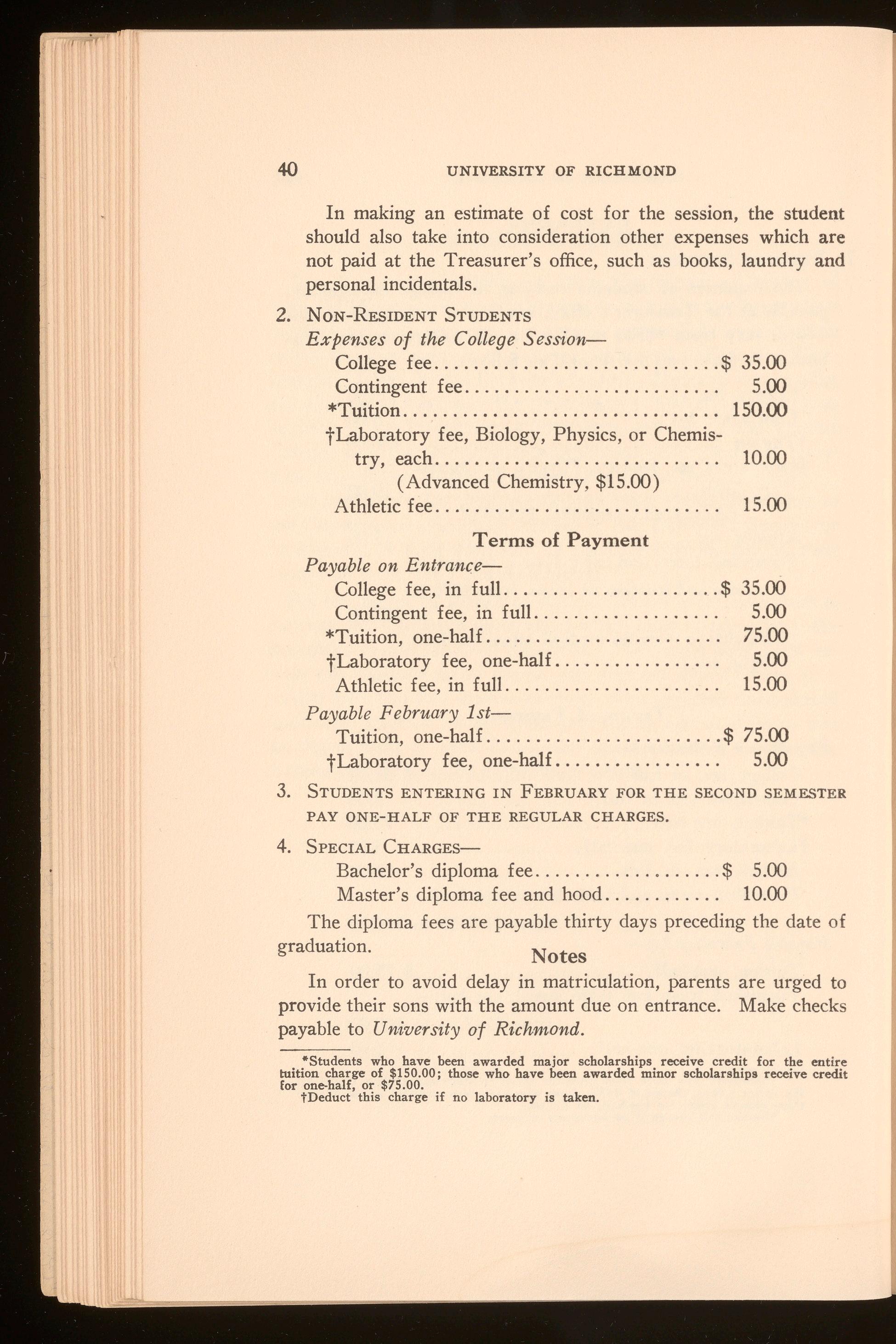
10.00
15.00
College fee, in full ...................... $ 35.00
Contingent fee, in full. .
*Tuition, one-half. . .
5.00
75.00
tLaboratory fee, one-half................. 5.00 Athletic fee, in full.
Payable February lstTuition, one-half ........................ $ 75.00 t Laboratory fee, one-half.
3. STUDENTS ENTERING IN FEBRUARY FOR THE SECOND SEMESTER PAY ONE-HALF OF THE REGULAR CHARGES.
4. SPECIAL CHARGES-
Bachelor's diploma fee ................... $ 5.00 Master's diploma fee and hood. . .
10.00
The diploma fees are payable thirty days preceding the date of graduation.
Notes
In order to avoid delay in matriculation, parents are urged to provide their sons with the amount due on entrance. Make checks payable to University of Richmond.
*Students who have been awarded major scholarships receive credit for the entire tuition charge of $150.00; those who have been awarded minor scholarships receive credit for one-half, or $75.00.
tDeduct this charge if no laboratory is taken.
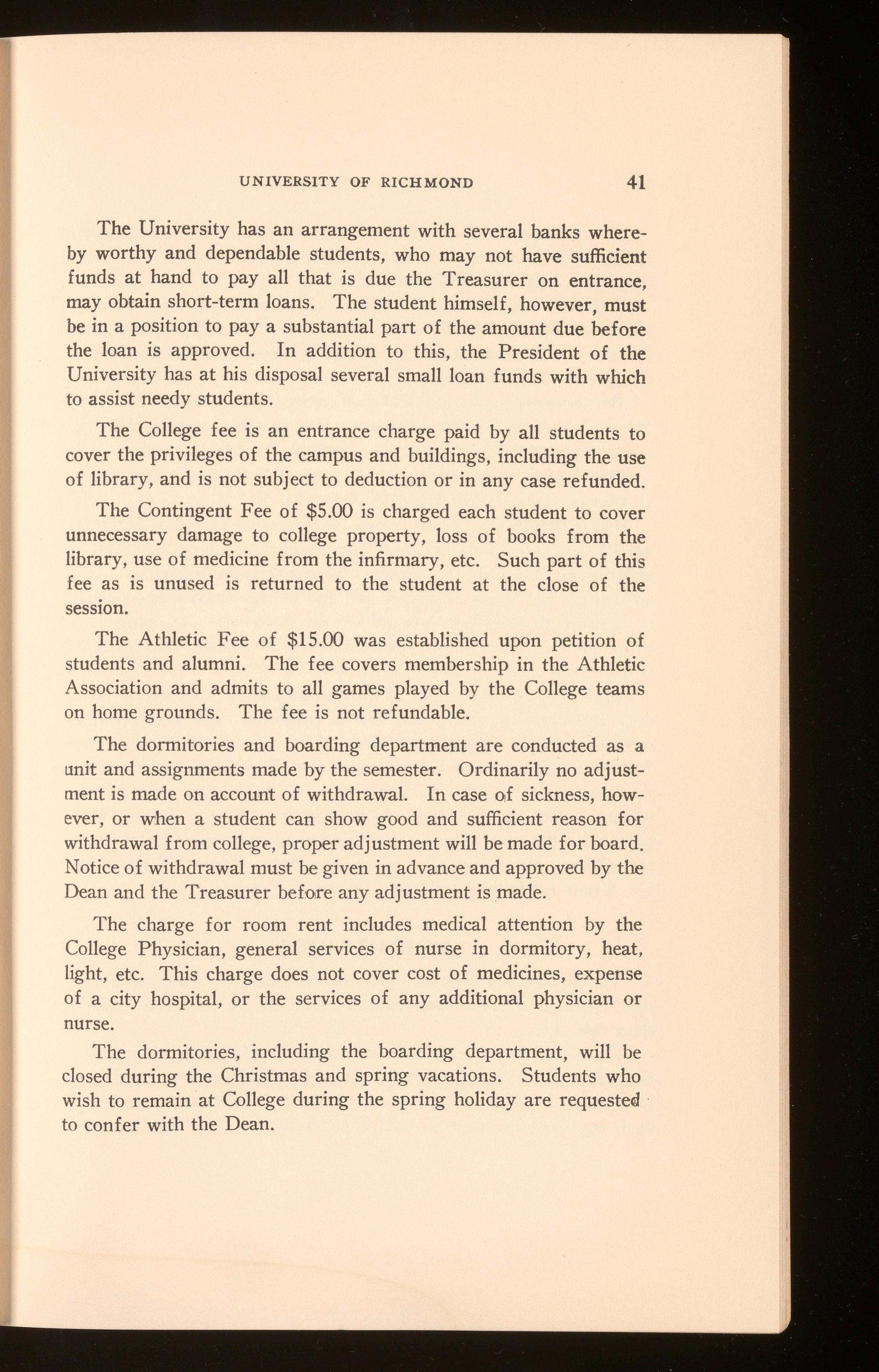
The University has an arrangement with several banks whereby worthy and dependable students, who may not have sufficient funds at hand to pay all that is due the Treasurer on entrance, may obtain short-term loans. The student himself, however, must be in a position to pay a substantial part of the amount due before the loan is approved. In addition to this, the President of the University has at his disposal several small loan funds with which to assist needy students.
The College fee is an entrance charge paid by all students to cover the privileges of the campus and buildings, including the use of library, and is not subject to deduction or in any case refunded.
The Contingent Fee of $5.00 is charged each student to cover unnecessary damage to college property, loss of books from the library, use of medicine from the infirmary, etc. Such part of this fee as is unused is returned to the student at the close of the sess10n.
The Athletic Fee of $15.00 was established upon petition of students and alumni. The fee covers membership in the Athletic Association and admits to all games played by the College teams on home grounds. The fee is not refundable.
The dormitories and boarding department are conducted as a unit and assignments made by the semester. Ordinarily no adjustment is made on account of withdrawal. In case of sickness, however, or when a student can show good and sufficient reason for withdrawal from college, proper adjustment will be made for board. Notice of withdrawal must be given in advance and approved by the Dean and the Treasurer before any adjustment is made.
The charge for room rent includes medical attention by the College Physician, general services of nurse in dormitory, heat, light, etc. This charge does not cover cost of medicines, expense of a city hospital, or the services of any additional physician or nurse.
The dormitories, including the boarding department , will be closed during the Christmas and spring vacations. Students who wish to remain at College during the spring holiday are requested · to confer with the Dean.

The College supplies students' rooms with bedstead, mattress, dresser, chairs, and clothes closet. Each student provides his own bed furnishings and toilet articles.
Students are matriculated for a full session. In the event of withdrawal on account of the student's sickness, proportionate deduction will be made in the charge for board, but not in other charges or for other causes.
Students are given until October 1st of the first semester and to March 1st of the second semester to adjust their laboratory work and no refund is made for laboratory fees after these dates.
No diploma is granted or credit given for session's work until all charges have been satisfactorily settled.
The Student Government Fee-In order to finance in a businesslike manner their publications, literary societies, and other general organizations, the students have adopted a budget to cover all expenses of these organizations, and to this fund each student is expected to contribute ten dollars for the year. This money is collected and disbursed by student officials through the Student Government Association.
Ministers of the Gospel of all denominations, and young men duly approved by their churches as pre-ministerial students are admitted free of charge for tuition. They pay all other fees. The Board of Missions and Education of the Virginia Baptist General Association will render further assistance to worthy young men recommended by churches which contribute to the Board, and accepted after examination. For further information on this matter, address Mr. Frank T. Crump, Secretary, Education Committee, Grace-American Building, Richmond, Va.
DORMITORIES
The college dormitories open for reception of students Tuesday, September 15th. Students are advised not to arrive earlier than this date.
Rooms in dormitories will be assigned in the order of application after May 1st. Application should be addressed to the Dean of Richmond College. A deposit of ten dollars must be made by each applicant in order to hold a particular room. This fee will
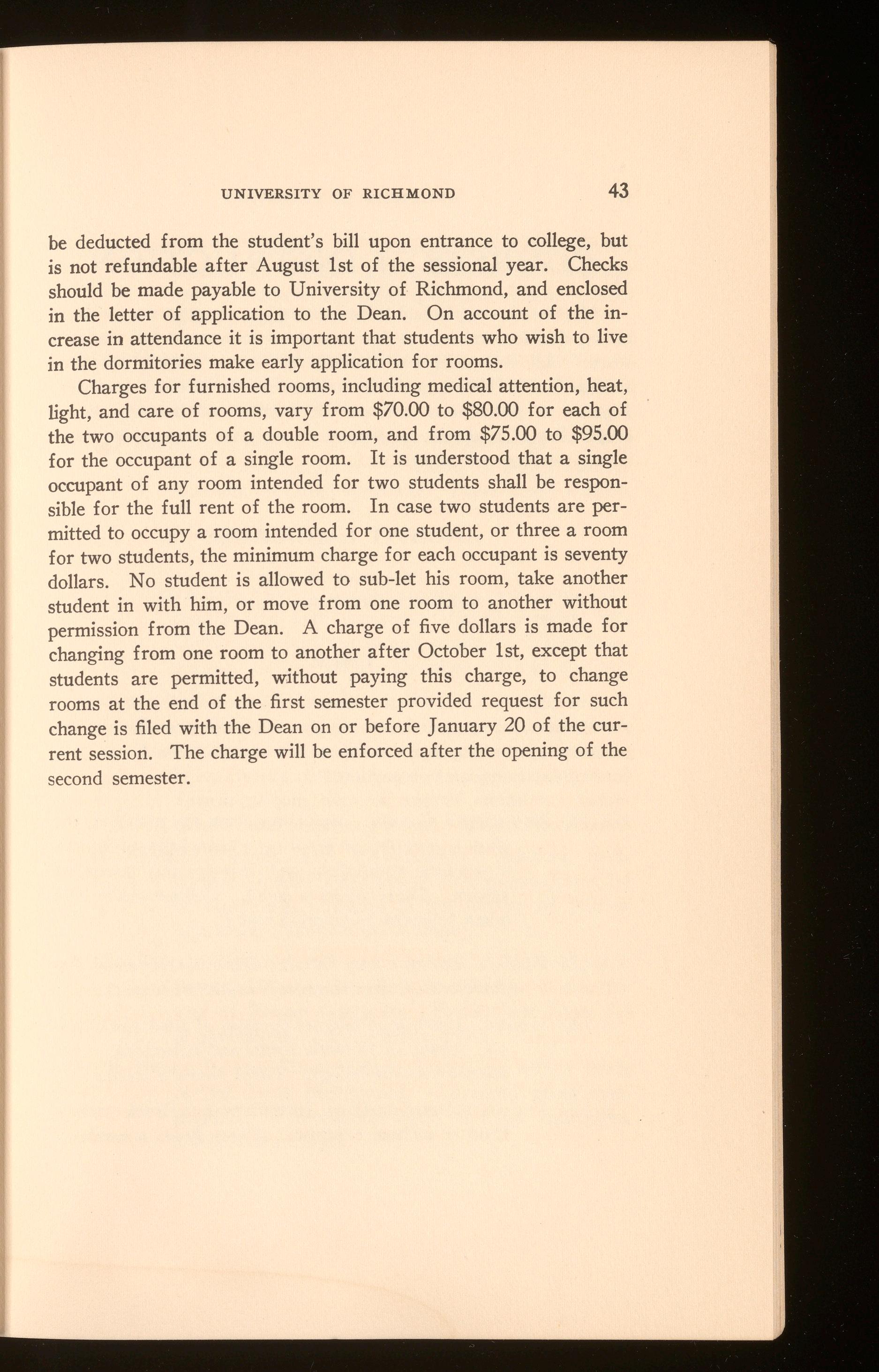
be deducted from the student's bill upon entrance to college, but is not refundable after August 1st of the sessional year. Checks should be made payable to University of Richmond, and enclosed in the letter of application to the Dean. On account of the increase in attendance it is important that students who wish to live in the dormitories make early application for rooms.
Charges for furnished rooms, including medical attention, heat, light, and care of rooms, vary from $70.00 to $80.00 for each of the two occupants of a double room, and from $75.00 to $95.00 for the occupant of a single room. It is understood that a single occupant of any room intended for two students shall be responsible for the full rent of the room. In case two students are permitted to occupy a room intended for one student, or three a room for two students, the minimum charge for each occupant is seventy dollars. No student is allowed to sub-let his room, take another student in with him, or move from one room to another without permission from the Dean. A charge of five dollars is made for changing from one room to another after October 1st, except that students are permitted, without paying this charge, to change rooms at the end of the first semester provided request for such change is filed with the Dean on or before January 20 of the current session. The charge will be enforced after the opening of the second semester.

COURSES of INSTRUCTION
All courses are planned to run through a semester except those having double numbers. A double number indicates a full session's work. All odd-numbered courses are given during the first semester, and even-numbered courses in the second semester. Figures in parenthesis indicate the number of semester hours credit allowed, and also, in the case of semester courses, the number of meetings per week.
ANCIENT LANGUAGES
PROFESSORHARRIS
Assoc1ATE PROFESSORHACKLEY
Greek
The object of this Department is to introduce the student to the literature of ancient Greece, to give him an appreciation of the precision of the language, and a consciousness of the Greek love for artistic beauty and proportion.
1-2 ( 6) BEGINNER'SCouRSE. Beginning with the alphabet, the class is occupied in securing a knowledge of forms, a working vocabulary and fundamental points of syntax. Three hours a week. College credit only when followed by Greek 3 and 4.
3 (3) PLATO'SAPOLOGYAND CRITO. Grammar reviewed and extended. Composition. Three hours a week.
4 ( 3) Ho MER. Reading of selected portions of Iliad and Odyssey. Study of Homeric forms and inflections. Conferences on mythology. Three hours a week.
5 (3) LYSIAS.Selected orations. Introduction to Greek oratory. Oral or written exercises. Three hours a week.

UNIVERSITYOF RICHMOND
6 (3) HISTORY. One book of Thucydides read and selected portions of others. Conferences on and readings from Herodotus and other historical writers. Three hours a week.
7 (3) ORATORY. Demosthenes' De Corona. Conferences on Greek oratory or orators. Lectures on grammar. Three hours a w1111k
8 (3) DRAMA. A play of Sophocles or Euripides read. Study of the development of the drama. Parallel reading. Lectures on Greek literature. Three hours a week.
Latin
1-2 (6) CICEROANDVIRGIL. Cicero's orations, with prose composition the first semester. Virgil's Aeneid, with Greek mythology the second semester. Three hours a week. College credit only when folowed by Latin 3-4.
3-4 (6) ROMANHISTORYANDPOETRY. Livy, prose composition, and Roman private life the first semester. Selections from Horace, Catullus, and the elegiac poets, with Roman private life the second semester. Prerequisite Latin 1-2 or equivalent. Three hours a week.
5 ( 3) ROMAN SATIRE AND PHILOSOPHY. Authors read: Horace, Juvenal, and Cicero. Prerequisite Latin 3-4 or equivalent. Studies in the history of Roman Literature. Three hours a week.
6 (3) ROMAN PHILOSOPHY AND COMEDY. Authors read: Seneca, Plautus, and Terence. Studies in the history of Roman Literature. Prerequisite Latin 3-4 or equivalent. Three hours a week.
7 (3) EARLY ROMAN PHILOSOPHY. Lucretius, with a study of the Greek background. Advanced prose composition. Prerequisite Latin 3-4 or equivalent. Three hours a week.
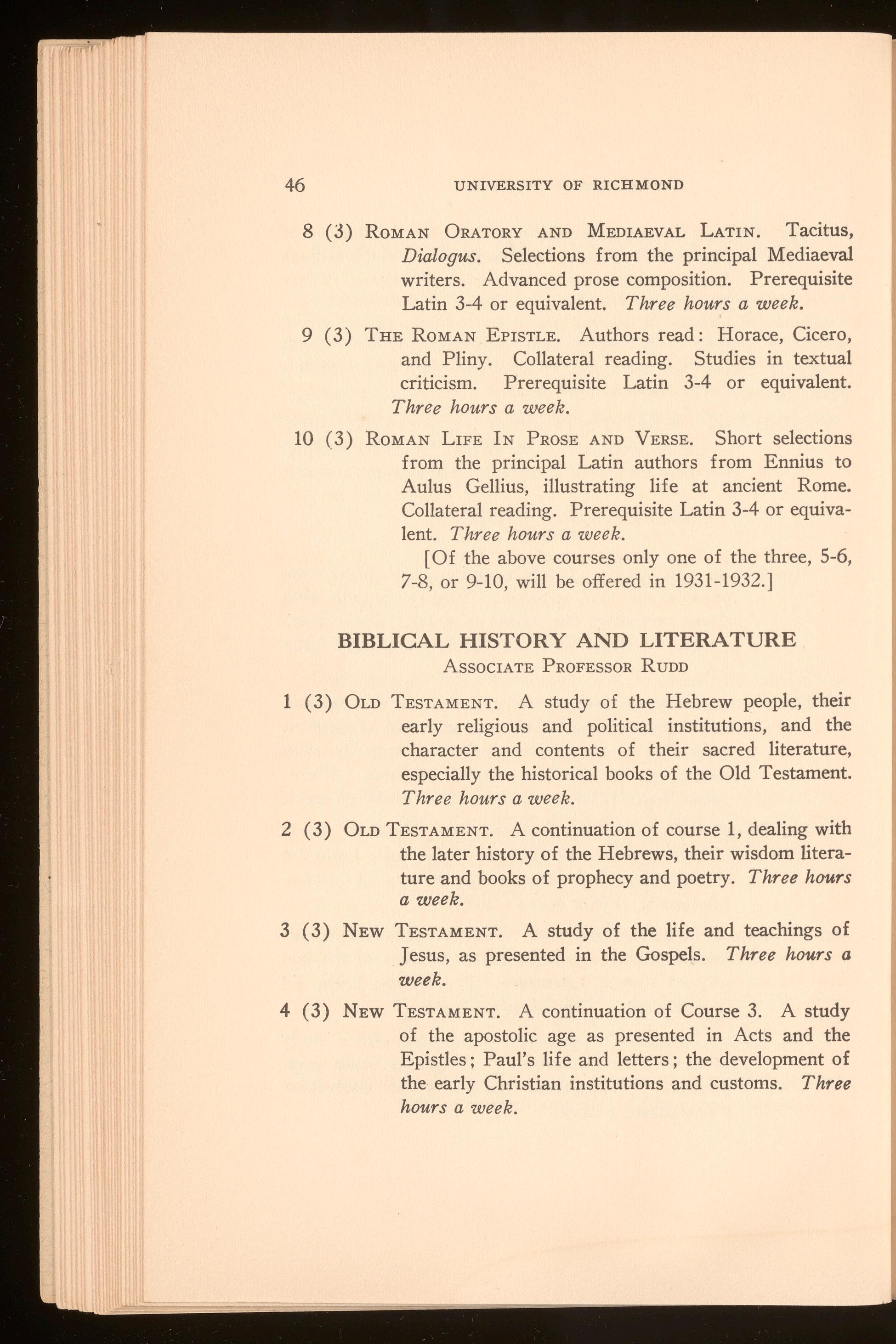
8 (3) ROMAN ORATORYAND MEDIAEVALLATIN. Tacitus, Dia/,ogus. Selections from the principal Mediaeval writers. Advanced prose composition. Prerequisite Latin 3-4 or equivalent. Three hours a week.
9 ( 3) THE Ro MAN EPISTLE. Authors read : Horace, Cicero, and Pliny. Collateral reading. Studies in textual criticism. Prerequisite Latin 3-4 or equivalent. Three hours a week.
10 ( 3) RoMAN LIFE IN PROSE AND VERSE. Short selections from the principal Latin authors from Ennius to Aulus Gellius, illustrating life at ancient Rome. Collateral reading. Prerequisite Latin 3-4 or equivalent. Three hours a week.
[Of the above courses only one of the three, 5-6, 7-8, or 9-10 , will be offered in 1931-1932.]
BIBLICAL HISTORY AND LITERATURE AssocIATE PROFESSORRuDD
1 (3) OLD TESTAMENT. A study of the Hebrew people, their early religious and political institutions, and the character and contents of their sacred literature, especially the historical books of the Old Testament. Three hours a week.
2 (3) OLD TESTAMENT. A continuation of course 1, dealing with the later history of the Hebrews, their wisdom literature and books of prophecy and poetry. Three hours a week.
3 (3) NEW TESTAMENT. A study of the life and teachings of Jesus, as presented in the Gospels. Three hours a week.
4 (3) NEW TESTAMENT. A continuation of Course 3. A study of the apostolic age as presented in Acts and the Epistles; Paul's life and letters; the development of the early Christian institutions and customs. Three hours a week.
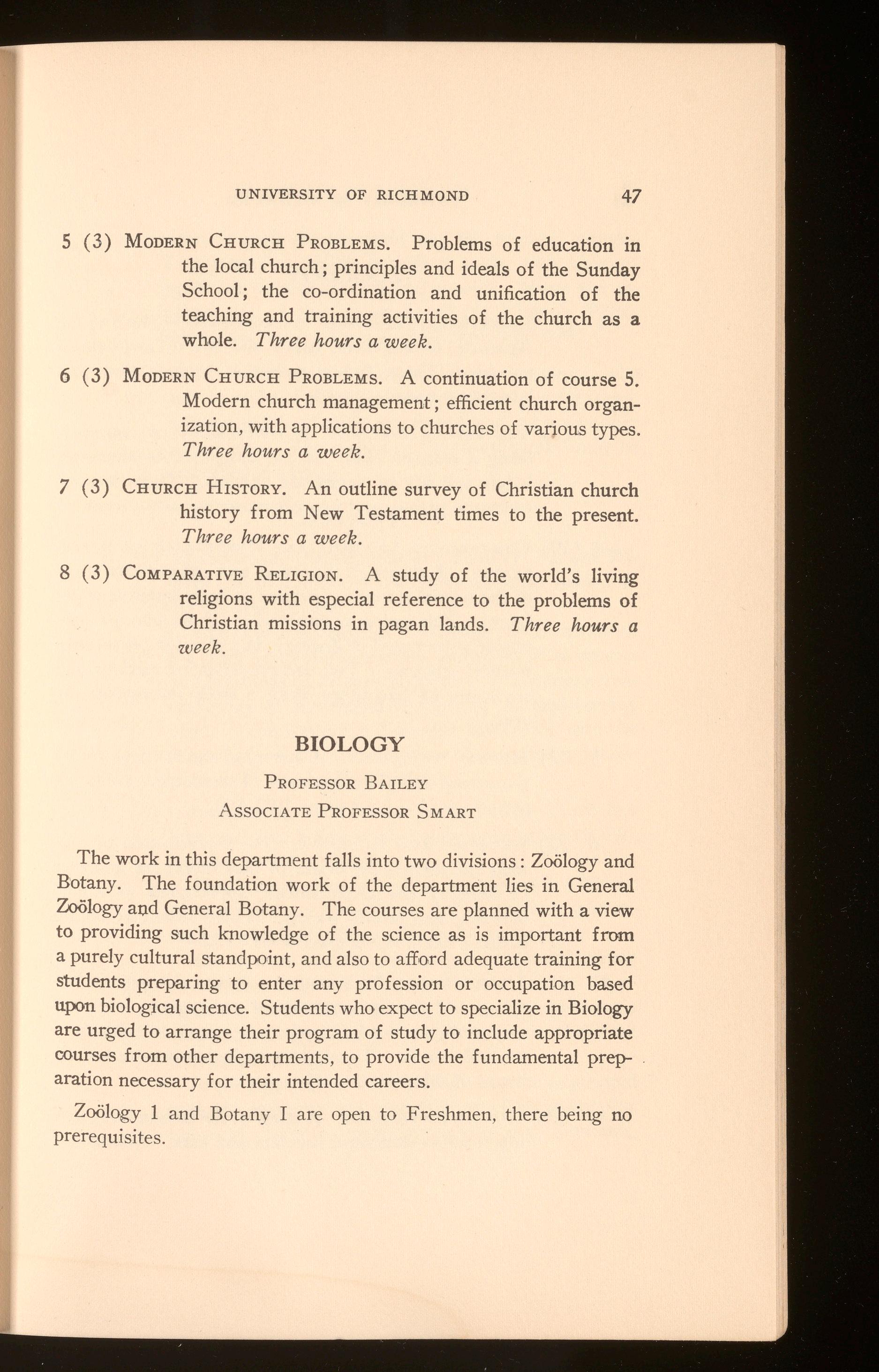
5 ( 3) MODERNCHURCH PROBLEMS. Problems of education in the local church; principles and ideals of the Sunday School; the co-ordination and unification of the teaching and training activities of the church as a whole. Three hours a week.
6 ( 3) MODERNCHURCH PROBLEMS. A continuation of course 5. Modern church management; efficient church organization, with applications to churches of various types. Three hours a week.
7 (3) CHURCH HISTORY. An outline survey of Christian church history from New Testament times to the present. Three hours a week.
8 (3) COMPARATIVERELIGION. A study of the world's living religions with especial reference to the problems of Christian missions in pagan lands. Three hours a week.
BIOLOGY
PROFESSORBAILEY ASSOCIATEPROFESSORSMART
The work in this department falls into two divisions : Zoology and Botany. The foundation work of the department lies in General Zoology and General Botany. The courses are planned with a view to providing such knowledge of the science as is important from a purely cultural standpoint, and also to afford adequate training for students preparing to enter any profession or occupation based upon biological science. Students who expect to specialize in Biology are urged to arrange their program of study to include appropriate courses from other departments, to provide the fundamental preir aration necessary for their intended careers.
Zoology 1 and Botany I are open to Freshmen, there being no prerequisites .
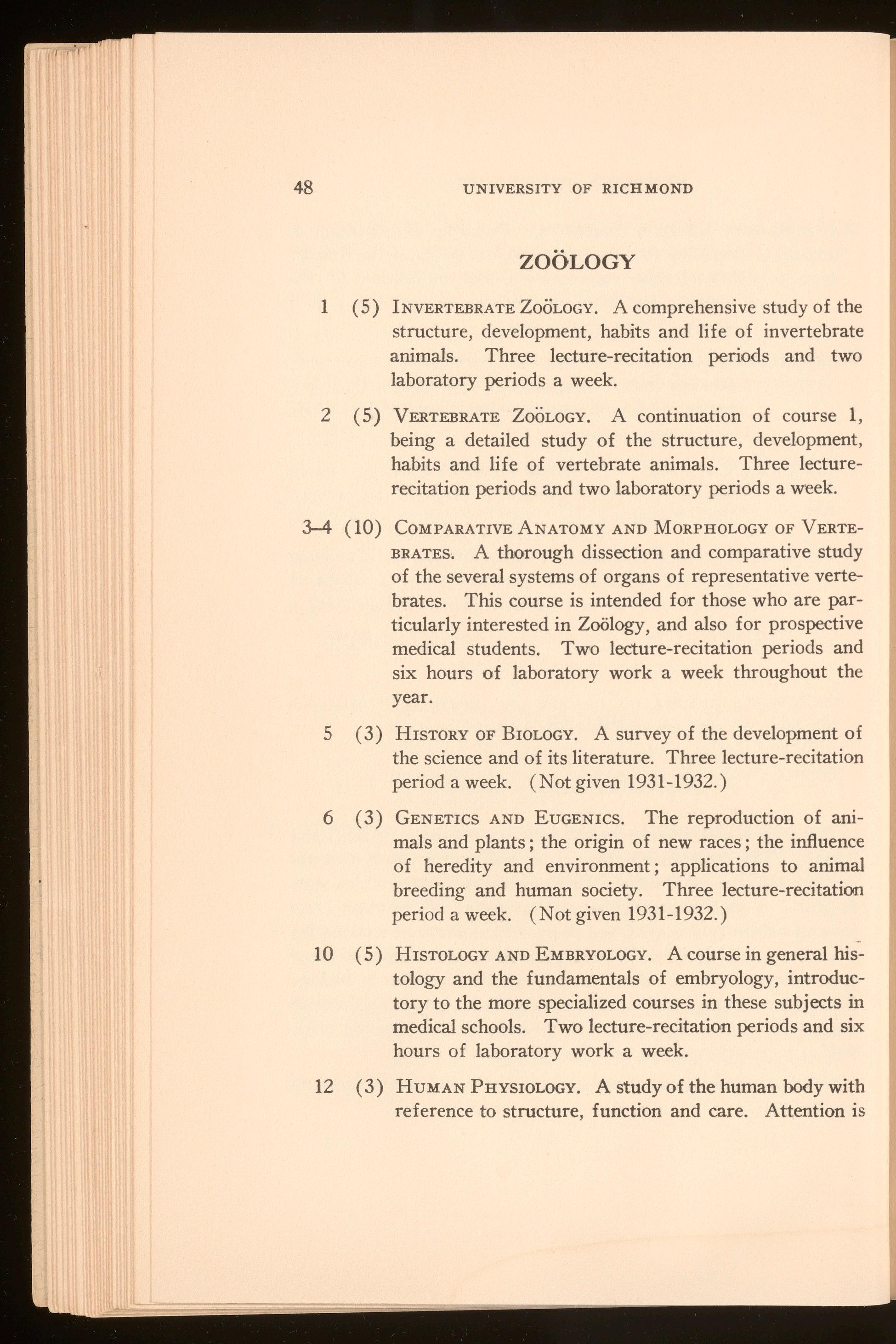
ZOOLOGY
1 (5) INVERTEBRATEZooLOGY. A comprehensive study of the structure, development, habits and life of invertebrate animals. Three lecture-recitation periods and two laboratory periods a week.
2 ( 5) VERTEBRATEZooLOGY. A continuation of course 1, being a detailed study of the structure, development, habits and life of vertebrate animals. Three lecturerecitation periods and two laboratory periods a week.
J-4 (10) COMPARATIVEANATOMYANDMORPHOLOGYOF VERTEBRATES. A thorough dissection and comparative study of the several systems of organs of representative vertebrates. This course is intended for those who are particularly interested in Zoology, and also for prospective medical students. Two lecture-recitation periods and six hours of laboratory work a week throughout the year.
5 ( 3) HISTORYOF BIOLOGY.A survey of the development of the science and of its literature. Three lecture-recitation period a week. (Not given 1931-1932.)
6 (3) GENETICSAND EUGENICS. The reproduction of animals and plants; the origin of new races; the influence of heredity and environment ; applications to animal breeding and human society. Three lecture-recitation period a week. (Notgiven 1931-1932.)
10 ( 5) HISTOLOGYANDEMBRYOLOGY.A course in general histology and the fundamentals of embryology, introductory to the more specialized courses in these subjects in medical schools. Two lecture-recitation periods and six hours of laboratory work a week.
12 ( 3) HUMAN PHYSIOLOGY.A study of the human body with reference to structure, function and care. Attention is

UNIVERSITYOF RICHMOND
given to both the anatomic and the hygienic aspects. Two lecture-recitation periods a week, with assigned topics for outside reading and reports. Meets the requirements of the "West Law" for Virginia Public School teachers. (Given FIRST term 1931-1932.)
13-14 ( 10) SPECIALPROBLEMS : For graduates or for seniors who have completed a Zoology major. A subject for investigation will be chosen or assigned, and pursued under supervision. The results of the investigation must be embodied in a thesis.
BOTANY
1 (S) ELEMENTARYPHANEROGAMICBOTANY. Three lectures and four hours of laboratory work per week during the first semester.
This course is designed to acquaint the student with the plant as a living organism, and with the structures and functions of its several organs. It includes a general study of representative types of the seed-bearing plants. The student will acquire familiarity with the compound microscope and some of the simpler fundamentals of laboratory technique.
2 (5) INTRODUCTIONTO ToxoNOMIC BOTANY. Three lectures and four hours of laboratory work per week during the second semester.
This course gives a general acquaintance with the plant groups and is recommended for students who intend to take up biology, agriculture, or medicine.
The lectures are designed to give a general survey of the plant kingdom. Consideration is given to Cryptogams in their relation to man, for example, to bacteria and fungi as agents of decay and as causes of disease in animals and plants.
In the laboratory the student will become acquainted · with the structure and reproduction of representative types of bacteria, moulds, mushrooms, seaweeds,
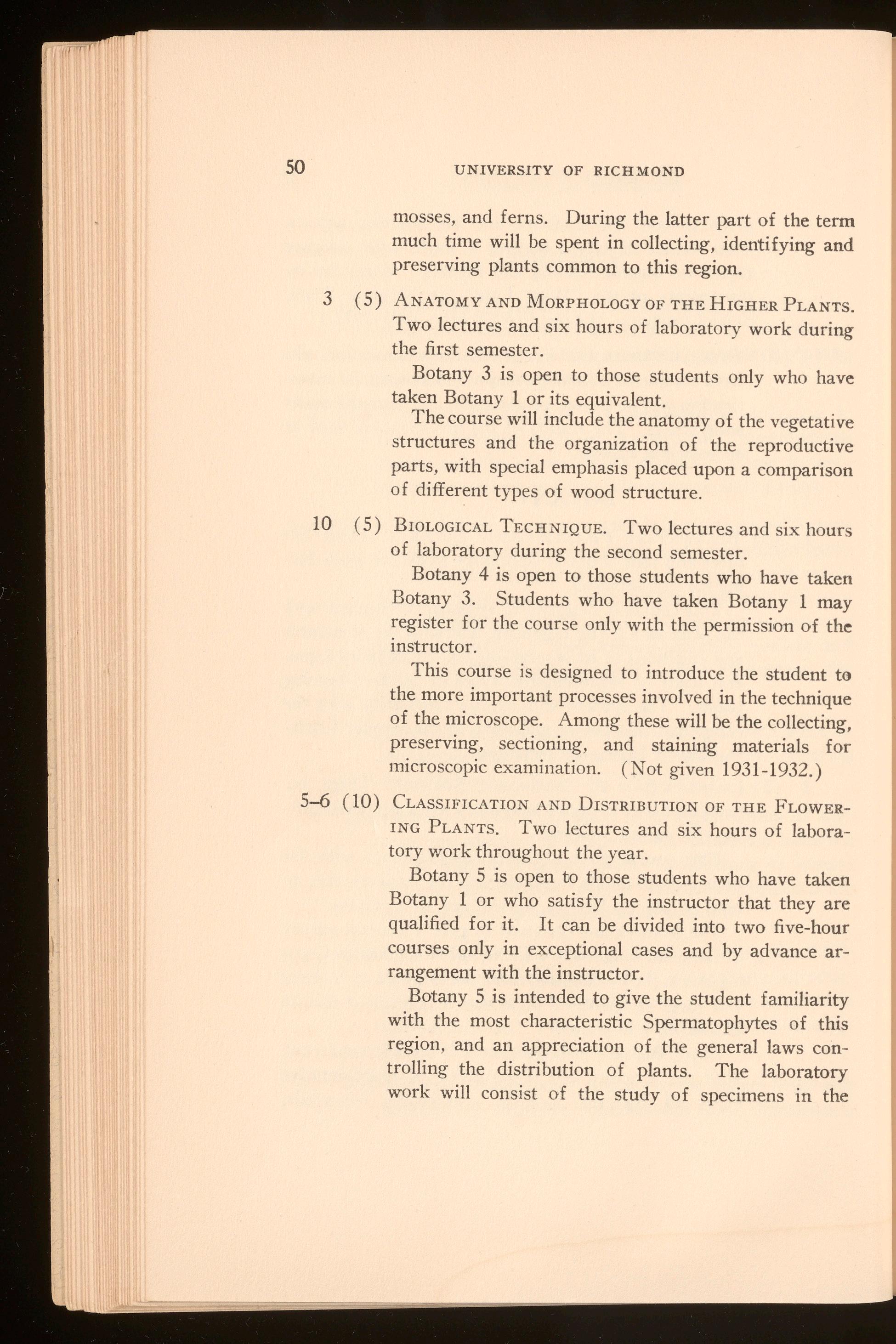
UNIVERSITYOF RICHMOND
mosses, and ferns. During the latter part of the term much time will be spent in collecting, identifying and preserving plants common to this region.
3 ( 5) ANATOMYANDMORPHOLOGYOF THE HIGHER PLANTS. Two lectures and six hours of laboratory work during the first semester.
Botany 3 is open to those students only who have taken Botany 1 or its equivalent.
The course will include the anatomy of the vegetative structures and the organization of the reproductive parts, with special emphasis placed upon a comparison of different types of wood structure.
10 ( S) BIOLOGICALTECHNIQUE. Two lectures and six hours of laboratory during the second semester.
Botany 4 is open to those students who have taken Botany 3. Students who have taken Botany 1 may register for the course only with the permission of the instructor.
This course is designed to introduce the student to the more important processes involved in the technique of the microscope. Among these will be the collecting, preserving, sectioning, and staining materials for microscopic examination. (Not given 1931-1932.)
5-6 ( 10) CLASSIFICATIONAND DISTRIBUTIONOF THE FLOWERING PLANTS. Two lectures and six hours of laboratory work throughout the year.
Botany S is open to those students who have taken Botany 1 or who satisfy the instructor that they are qualified for it. It can be divided into two five-hour courses only in exceptional cases and by advance arrangement with the instructor.
Botany S is intended to give the student familiarity with the most characteristic Spermatophytes of this region, and an appreciation of the general laws controlling the distribution of plants. The laboratory work will consist of the study of specimens in the

UNIVERSITYOF RICHMOND
laboratory, together with the preparation of a private collection of the plants found on and about the campwt. During the year several excursions will be planned for the class as a whole.
SPECIALPROBLEMS.For graduates or for seniors who have completed a Botany major. A subject for research will be assigned or chosen, and pursued und« supervision. The results of the research must be embodied in a thesis.
Hours and credit to be arranged with the instructor.
BUSINESS ADMINISTRATION
PROFESSORSEAy
PROFESSORMEAD
PROFESSORRUSSELL
PROFESSORPINCHBECK
ASSOCIATEPROFESSORTHOMAS
MR. MAYS
MR. BRONSON
Business Administration has witnessed a more rapid development in the past fifteen years than any other field of collegiate study. Up until that time it was generally felt that training for a business career could be acquired only by experience; that it was not like medicine, law and other professions. Since that time, however, business organizations of all kinds have come to recognize that business itself is not able to furnish the extensive training now required and are co-operating more fully each year with colleges and universities to develop their schools of business. These schools now have become one of the chief sources from which business fills its increasing need for trained men, qualified by education, to fit themselves most quickly and efficiently into the complex system of modern organization.
The city of Richmond is one of the finest fields in the South for the training of those young people who expect to enter the business profession. It is primarily to meet the growing demand of the community that this Department of Richmond College and also the Evening School of Business are being developed.

1-2 (6) PRINCIPLESOF BUSINESSPRACTICE. An introductory course, designed to acquaint the student with the economic background of business and the inter-relationship of the numerous phases of commercial activity. The first semester is devoted to the various business aspects of numerous industries, a study of the forms of business organization, and various buying and selling agencies. The second semester is devoted to problems of finance, labor, and transportation, business records and government regulation. Prerequisite to other courses in the department except by permission of the Head of the Department. Three hours a week.
3-4 (6) BUSINESSLAW. Practically all business relationships have a legal background in that they involve some contractual undertaking. Business Law, therefore, constitutes an essential part of business training. The first semester will include the study of contracts sales, agency, negotiable instruments and insurance During the second semester, partnerships, corporations, property, wills, etc., will be covered. This course is required for the degree. Not open to Freshmen. Prerequisite, Business Administration 1-2. Three hours a week.
5-6 (6) PRINCIPLESOF AccouNTING. An introduction to the study of accounitng, designed to meet the needs of the general student of business as well as of those seeking to specialize in accounting. The first semester: the uses of accounting, the preparation and interpretation of financial statements and practice in making the application of the principles of double entry bookkeeping to the sole proprietorship and to the partnership forms of business organization. In the second semester, work upon financial statements is continued in relation to the manufacturing type of business and to the corporate form of organiza-
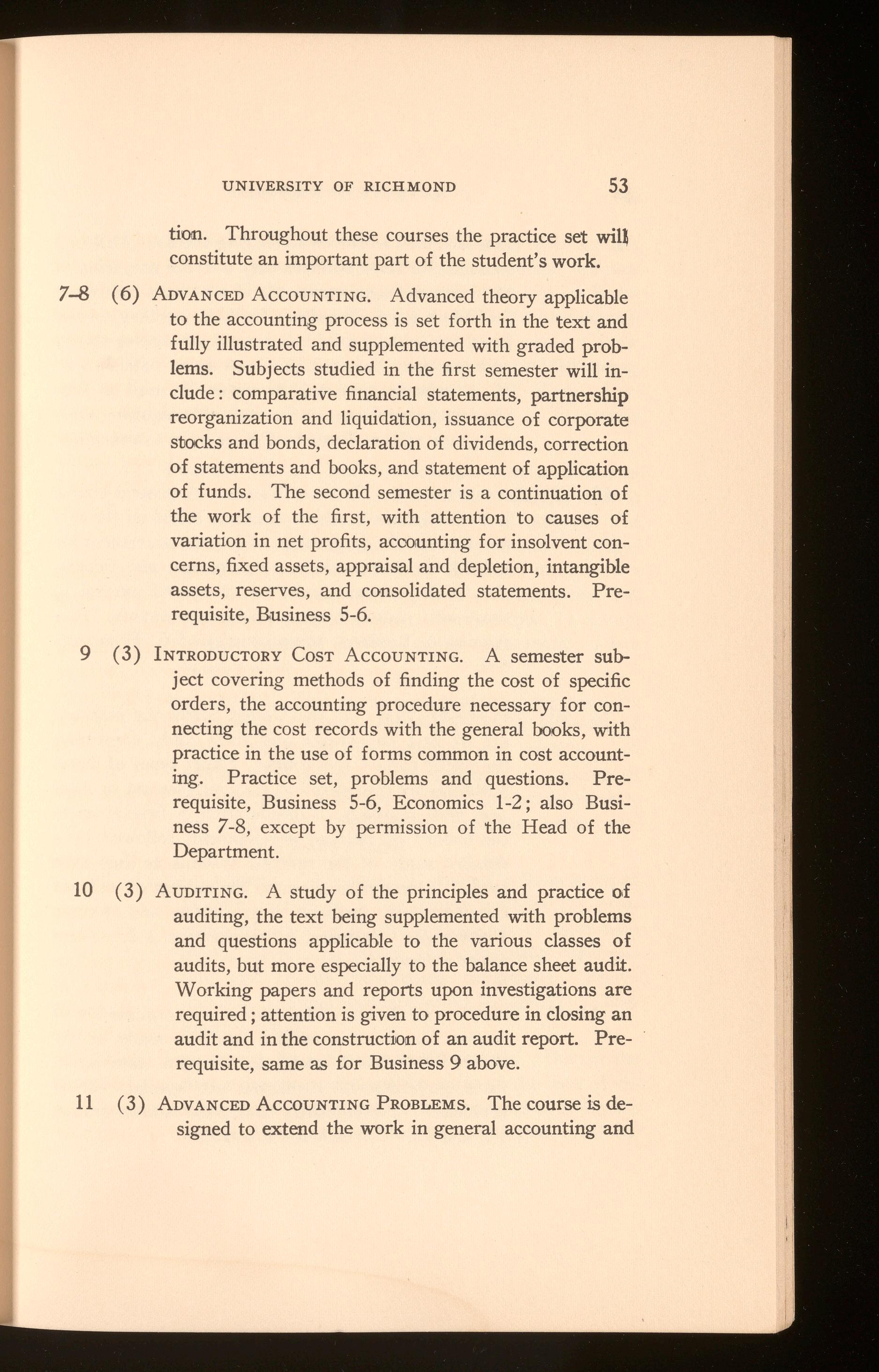
tioo. Throughout these courses the practice set wil~ constitute an important part of the student's work.
7-8 (6) ADVANCEDAccouNTING. Advanced theory applicable to the accounting process is set forth in the text and fully illustrated and supplemented with graded problems. Subjects studied in the first semester will include : comparative financial statements, partnership reorganization and liquidation, issuance of corporate stocks and bonds, declaration of dividends, correction of statements and books, and statement of application of funds. The second semester is a continuation of the work of the first, with attention to causes of variation in net profits, accounting for insolvent concerns, fixed assets, appraisal and depletion, intangible assets, reserves, and consolidated statements. Prerequisite, Business 5-6.
9 (3) INTRODUCTORYCosT AccouNTING. A semester subject covering methods of finding the cost of specific orders, the accounting procedure necessary for connecting the cost records with the general books, with practice in the use of forms common in cost accountmg. Practice set, problems and questions. Prerequisite, Business 5-6, Economics 1-2; also Business 7-8, except by permission of the Head of the Department.
10 (3) AUDITING. A study of the principles and practice of auditing, the text being supplemented with problems and questions applicable to the various classes of audits, but more especially to the balance sheet audit. Working papers and reports upon investigations are required ; attention is given to procedure in closing an audit and in the construction of an audit report. Prerequisite, same as for Business 9 above.
11 (3) ADVANCEDAccouNTING PROBLEMS.The course is designed to extend the work in general accounting and
12 ( 3)

UNIVERSITYOF RICHMOND
as a review of advanced accounting theory. Although intended for those students only who are preparing to make accounting a vocation and who have completed 5-6-7-8, it is not offered as a C. P.A. coaching course, being limited to the field of general accounting theory and practice. Selected problems from published C. P. A. examinations will, however, be used to supplement the problems of the text. Prerequisite, average grade of Bin Business 7-8, or upon examination.
AccouNTING FORFEDERALTAXES.
A general course in Federal taxes in which emphasis is laid on the current law and the preparation of income tax returns for individuals, partnerships, corporations, and fiduciaries.. The course should be of special interest to those who plan to beoome public accountants. Prerequisites, Business administration 5-6, Economics 5-6.
13 (3) TRANSPORTATION.In the United States the railroads are of first importance and their study constitutes the major part of this course. Other types of transportation are considered as they supplement or compete with railroads. Consideration is first given to the history of railroad development, followed by a detailed study of the railroad systems as they exist today. Attention is given to the subject of railroad consolidations, financial organization and service. Prerequisite, Business Administration 1-2. Three hours a week.
14 (3) TRAFFICANDRATES. This course is a continuation of course 13. In it a careful study is made of the theory of railroad rates, classification, rate structures, governmental regulation and special railroad problems. Prerequisites, Business Administration 1-2 and 13. Three hours a week.

15 ( 3) ECONOMICGEOGRAPHY This course includes a study of the natural environment and the economic development of the countries with which the United States has large commercial relations and a detailed consideration of the international trade of each of these countries. The time is about equally divided among Europe, Latin-America and the Far East. Prerequisites, Business Administration 1-2, Economics 1-2. Three hours a week.
16 ( 3) FOREIGNTRADE. This course begins with a consideration of the theory of foreign trade. Analysis is made of our foreign trade, both imports and exports. The technical requirements for carrying on such trade and peculiar conditions affecting different markets are studied . Prerequisites, Business Administration 1-2, Economics 1-2, Business Administration 15 except by permi'Ssion of the Head of the Department. Three hours a week.
17 ( 3) MARKETING. This oourse aims to give a comprehensive knowledge of efficient methods for the distribution of both agricultural and manufactured products. A special study is made of the marketing of a variety of · commodities . Attention is given to specific marketing problems. Prerequisite , Business Administra1-2. Three hours a week.
18 ( 3) ADVERTISING . This course is studied in its relation to modern marketing. The course includes the principles of advertising, the preparation of advertisements, advertising media, the advertising organization and specific advertising campaigns. Prerequisites, Business Administration 1-2 and 17. Three hours a week.
21-22 ( 6) INSURANCEPRINCIPLESAND PRACTICES During the first semester studies will be made of the uses of insurance, its fundamental principles, types of insurance organizations, organization and management of the

insurance business, types of life insurance policies, the computation of life insurance premiums, reserves, surrender values, loan values, surplus and dividends. Special forms of life insurance, accident and health insurance, and liability and compensation insurance will be studied during the first semester, along with the legal fundamentals relating to contracts, agency, insurable interest, rates, insurance investments and related matters.
The second semester is devoted to a study of fire and property insurance, marine insurance, and casualty insurance. The latter will include particular study of automobile, title, credit and casualty insurances. ·Careful study will be made of the contracts, laws, salesmanship, settlement of claims, reserves, rates, investments and management of fire, marine and casualty insurance businesses.
During both semesters emphasis will be placed on the uses of insurance to its consumer as well as the technical details and usages of the insurance companies. Prerequisities, Economics 1 and 2. Three hours a rweek.
23-24 (6) CORPORATIONFINANCE. This is an advanced course dealing with the financial problems confronting business men as a result of the tremendous growth in the size of modern industrial organizations. The first semester comprises a study of underlying problems: conditions to be met, capitalization, types of securities, legal aspects encountered, etc. The second semester is devoted more to security marketing and the functions of underwriting, brokerage houses and stock exchanges. Prerequisities, Business Administration 1-2, 3-4, 5-6, Economics 1-2. Three hours a week.
27 (3) LABORPROBLEMS. This subject is one which is approached from several points of view, depending on
28 ( 3)
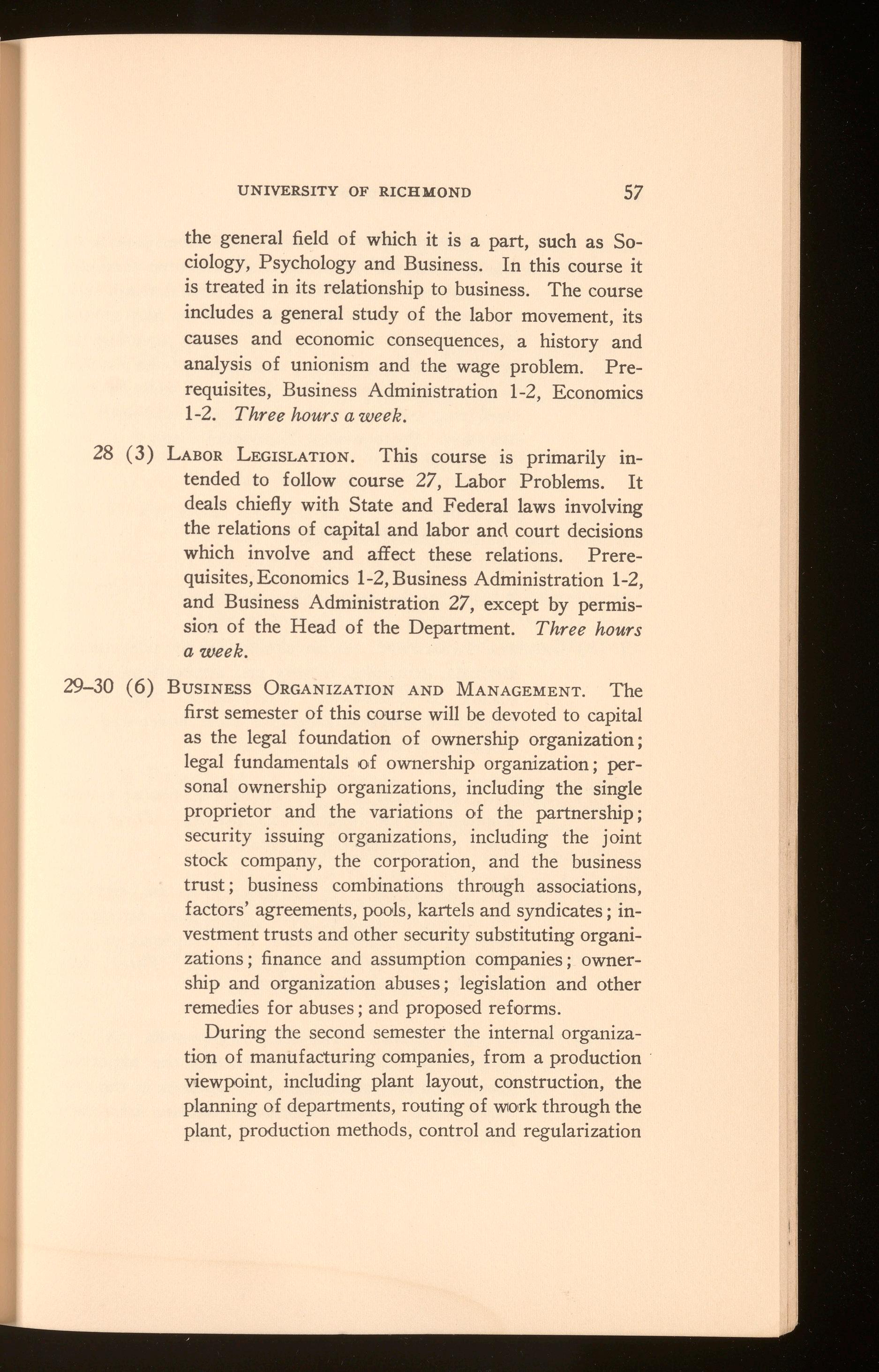
29-30 (6)
the general field of which it is a part, such as Sociology, Psychology and Business. In this course it is treated in its relationship to business. The course includes a general study of the labor movement, its causes and economic consequences, a history and analysis of unionism and the wage problem. Prerequisites, Business Administration 1-2, Economics 1-2. Three hours a week.
LABOR LEGISLATION.
This course is primarily intended to follow course 27, Labor Problems. It deals chiefly with State and Federal laws involving the relations of capital and labor an<l court decisions which involve and affect these relations. Prerequisites, Economics 1-2, Business Administration 1-2, and Business Administration 27, except by permission of the Head of the Department. Three hours a week.
BusINESS ORGANIZATIONAND MANAGEMENT.
The first semester of this course will be devoted to capital as the legal foundation of ownership organization ; legal fundamentals of ownership organization; personal ownership organizations, including the single proprietor and the variations of the partnership; security issuing organizations, including the joint stock company, the corporation, and the business trust; business combinations through associations, factors' agreements, pools, kartels and syndicates; investment trusts and other security substituting organizations ; finance and assumption companies; ownership and organization abuses; legislation and other remedies for abuses; and proposed reforms.
During the second semester the internal organization of manufacturing companies, from a production · viewpoint, including plant layout, construction, the planning of departments, routing of wiork through the plant, production methods, control and regularization
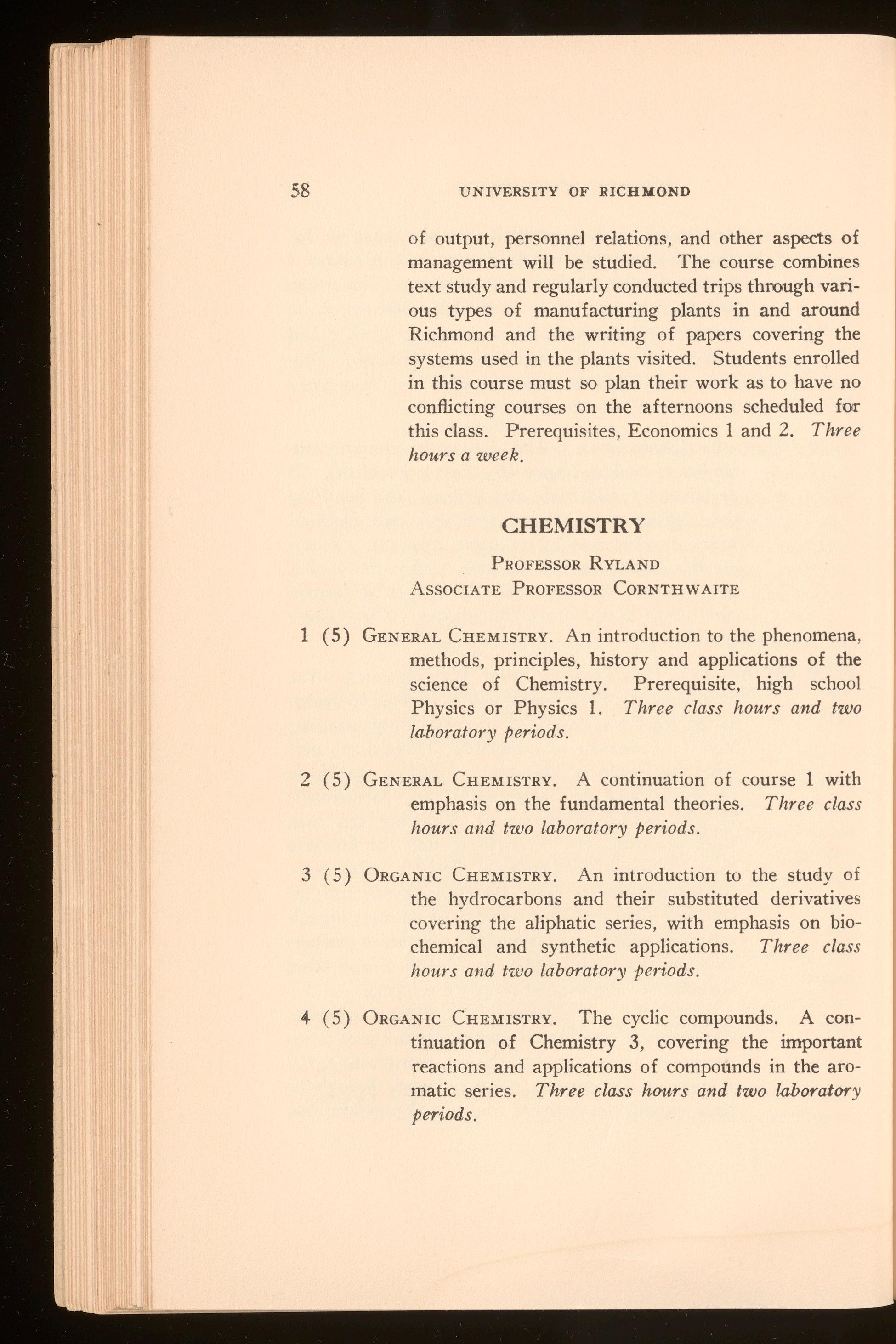
UNIVERSITYOF RICHMOND
of output, personnel relations, and other aspects of management will be studied. The course combines text study and regularly conducted trips through various types of manufacturing plants in and around Richmond and the writing of papers covering the systems used in the plants visited. Students enrolled in this course must so plan their work as to have no conflicting courses on the afternoons scheduled foc this class. Prerequisites, Economics 1 and 2. Three hours a week.
CHEMISTRY
PROFESSORRYLAND
ASSOCIATEPROFESSORCORNTHWAITE
1 ( 5) GENERALCHEMISTRY. An introduction to the phenomena, methods, principles, history and applications of the science of Chemistry. Prerequisite, high school Physics or Physics 1. Three class hours and two laboratory periods.
2 (S) GENERAL CHEMISTRY. A continuation of course 1 with emphasis on the fundamental theories. Three class hours and two laboratory periods.
3 ( 5) ORGANIC CHEMISTRY. An introduction to the study of the hydrocarbons and their substituted derivatives covering the aliphatic series, with emphasis on biochemical and synthetic applications. Three class hours and two laboratory periods.
4 ( 5) ORGANIC CHEMISTRY. The cyclic compounds. A continuation of Chemistry 3, covering the important reactions and applications of compounds in the aromatic series. Three class hours and two laboratory periods.
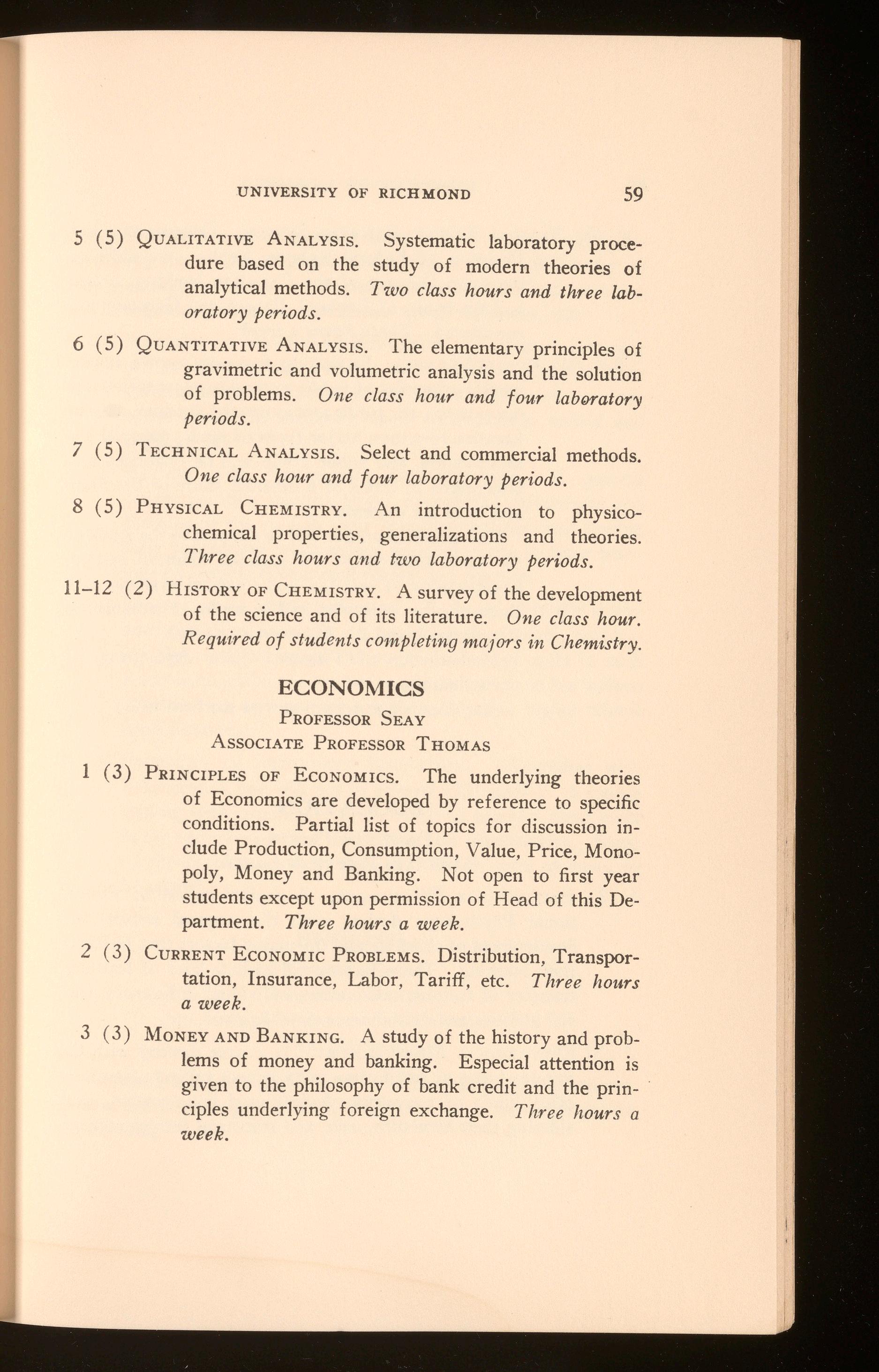
5 (5) QUALITATIVE ANALYSIS. dure based on the Systematic laboratory procestudy of modern theories of Two class hours and three lab-
6 (5) analytical methods. oratory periods. QUANTITATIVEANALYSIS. The elementary principles of gravimetric and volumetric analysis and the solution of problems. One class hour and four labMatory periods.
7 (5) TECHNICAL ANALYSIS. Select and commercial methods. One class hour and four laboratory periods.
8 ( S) PHYSICAL CHEMISTRY. An introduction to physicochemical properties, generalizations and theories. Three class hours and two laboratory periods.
11-12 (2) HISTORYOF CHEMISTRY. A survey of the development of the science and of its literature. One class hour. Required of students completing majors in Chemistry.
ECONOMICS
PROFESSORSEAy
ASSOCIATEPROFESSORTHOMAS
1 ( 3) PRINCIPLES OF EcoNOMICS. The underlying theories of Economics are developed by reference to specific conditions. Partial list of topics for discussion include Production, Consumption, Value, Price, Monopoly, Money and Banking. Not open to first year students except upon permission of Head of this Department. Three hours a week.
2 ( 3) CuRRENT ECONOMICPROBLEMS.Distribution, Transportation, Insurance, Labor, Tariff, etc. Three hoi.rs a week.
3 ( 3) Mo NEYANDBANKING. A study of the history and problems of money and banking. Especial attention is given to the philosophy of bank credit and the prin- · ciples underlying foreign exchange. Three hours a week.

UNIVERSITYOF RICHMOND
4 (3) FEDERALRESERVEBANKINGSYSTEM. Organization and Function of Federal 'Reserve Banks. In addition, the main features of the Canadian banking system and the banks of England, France and Germany are considered. Three hours a week.
5--0 (6) PUBLICFINANCE. During the first semester the fundamental principles of public expenditures, taxation and tax systems, the public and industrial domains, administrative revenues, major types of taxes, financial administration, and public credit will be examined and interpreted in terms of a detailed study of the State and local tax systems.
The second semester will be devoted to the study of the same features of the national financial system. Comparisons of our tax and financial systems with those of other countries will be made. Prerequisites, Economics 1 and 2. Three hours a week.
Mathematics of Finance : ( See department of mathematics.)
Statistics : ( See department of mathematics.)
EDUCATION
PROFESSORPRINCE ASSOCIATEPROFESSORGLICK
1 (3) EDUCATIONALPSYCHOLOGY.A general course of Educational Psychology, dealing with the original nature and development of children, and the major factors that facilitate their learning. These factors will include laws of learning, transfer of training, motivation, individual differences, special abilities and disabilities, mental hygiene, etc.
2 (3) EDUCATIONALMEASUREMENT.A course dealing with the various types of intelligence tests, school subjects tests, and other kinds of measuring devices used in education, considering their structure, uses, and statistical interpretation.

3 (3) PRINCIPLES OF SECONDARYEDUCATION. A course presenting the major principles underlying a sound philosophy of secondary education. These principles include population, organization, aims, functions, social outcomes, etc.
4 (3) METHODSIN SECONDARYEoucATION. A course presenting a characteristic range of the most effective group and individual methods appropriate for educational activities on the secondary level, including their relationships, values and applications.
5 (3) HISTORY AND PHILOSOPHY OF EDUCATION. A general course pointing out the larger educational movements and theories of the past in their historical settings, and tracing their subsequent relationships and influences to their bearings on present educational theory and practice.
6 (3) EDUCATIONALADMINISTRATION. A course of public school administration from the standpoint of the teacher, portraying the organization of the major functional units in such a way as to enable the teacher to adjust himself in his various relationships with greater understanding and higher ethical considerations.
8 (3) PROBLEMS IN SECONDARYEDUCATION. (Alternates with Education 4, and will not be offered 1931-1932.) A course dealing with specific problems which all teachers must meet in the secondary school in their various relationships. Some of the problems will be presented in the form of cases to be solved.
ENGLISH PROFESSORGOODE
PROFESSORHANDY
ASSOCIATEPROFESSORCANNADAY MR. DOERING
Course 1-2 is prerequisite to all other courses in the department. Course 3-4 is prerequisite to all other courses in literature in the department.
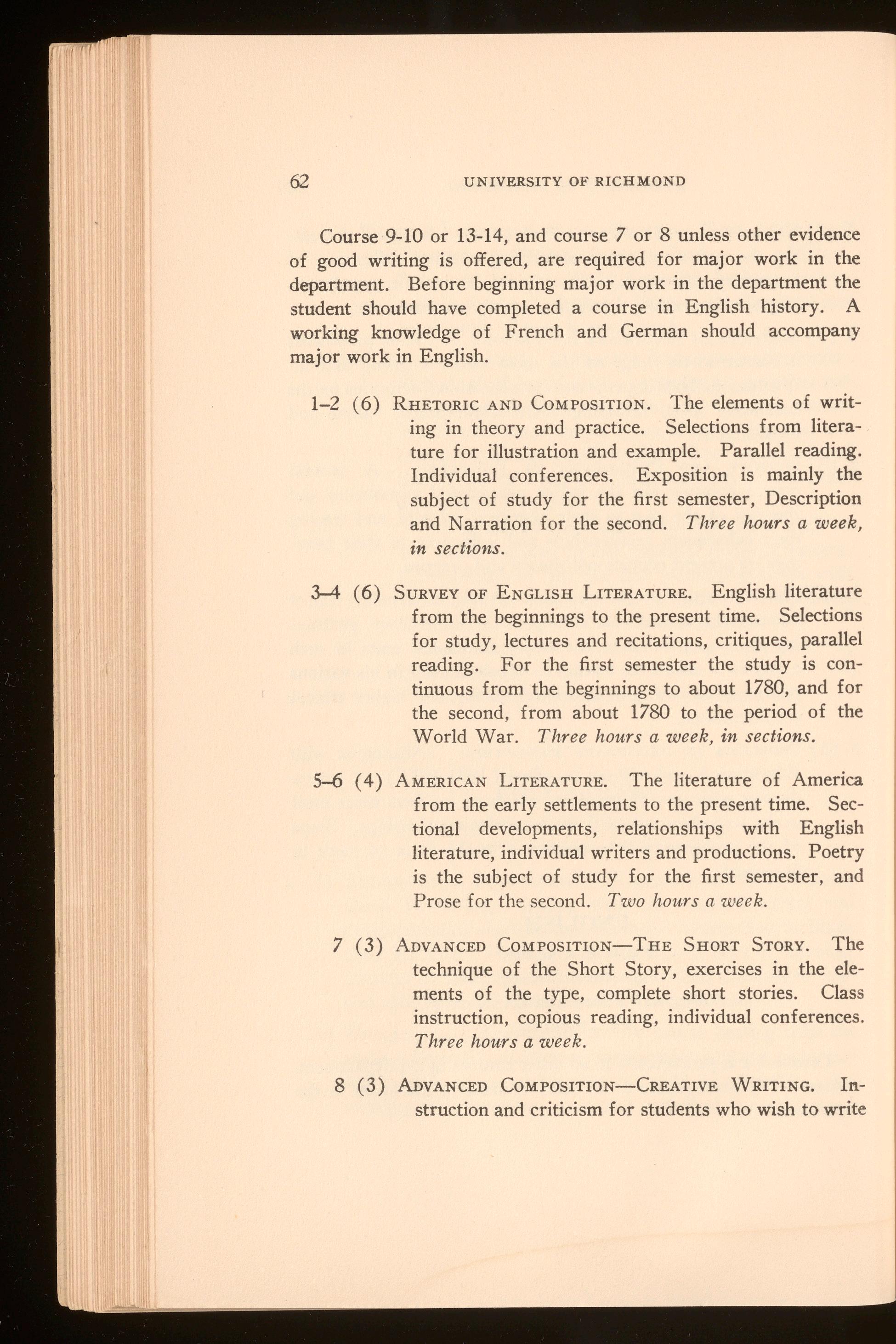
UNIVERSITYOFRICHMOND
Course 9-10 or 13-14, and course 7 or 8 unless other evidence of good writing is offered, are required for major work in the department. Before beginning major work in the department the student should have completed a course in English history. A working knowledge of French and German should accompany major work in English.
1-2 (6) RHETORICAND CoMPOSITION. The elements of writing in theory and practice. Selections from literature for illustration and example. Parallel reading. Individual conferences. Exposition is mainly the subject of study for the first semester, Description arid Narration for the second. Three hours a week , in sections.
3-4 (6) SURVEYOF ENGLISH LITERATURE. English literature from the beginnings to the present time. Selections for study, lectures and recitations, critiques, parallel reading. For the first semester the study is continuous from the beginnings to about 1780, and for the second, from about 1780 to the period of the World War. Three hours a week, in sections.
5-6 ( 4) AMERICANLITERATURE. The literature of America from the early settlements to the present time. Sectional developments, relationships with English literature, individual writers and productions. Poetry is the subject of study for the first semester, and Prose for the second . Two hours a we ek.
7 (3) ADVANCEDCoMPOSITION-THE SHORT STORY. The technique of the Short Story, exercises in the elements of the type, complete short stories. Class instruction, copious reading, individual conferences. Three hours a week.
8 (3) ADVANCEDCOMPOSITION-CREATIVEWRITING. Instruction and criticism for students who wish to write
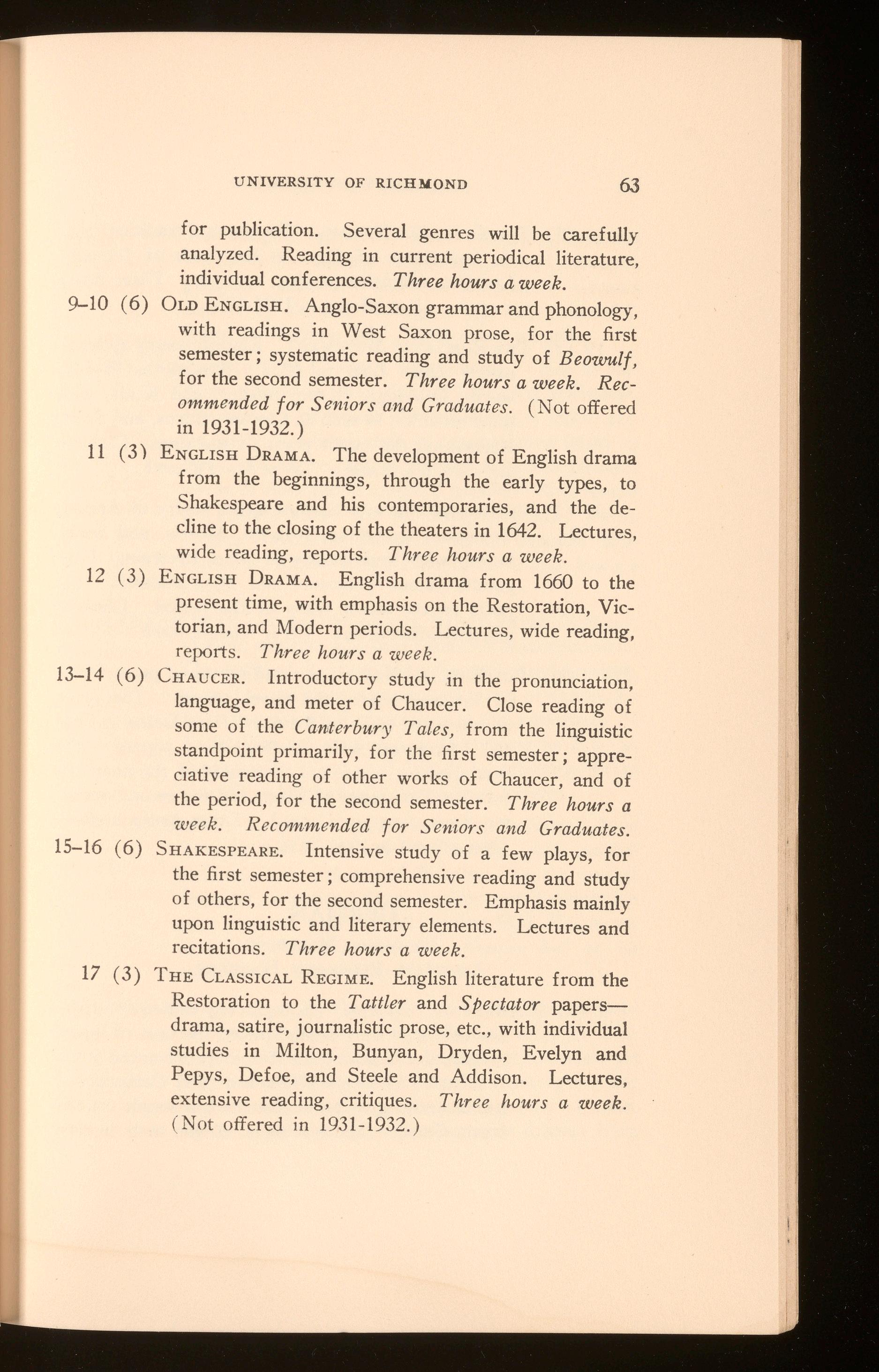
for publication. Several genres will be carefully analyzed. Reading in current periodical literature, individual conferences. Three hours a week.
9-10 (6) OLD ENGLISH. Anglo-Saxon grammar and phonology, with readings in West Saxon prose, for the first semester; systematic reading and study of Beowulf, for the second semester. Three hours a week. Recommended for Seniors and Graduates. (Not offered in 1931-1932.)
11 ( 3) ENGLISH DRAMA. The development of English drama from the beginnings, through the early types, to Shakespeare and his contemporaries, and the decline to the closing of the theaters in 1642. Lectures, wid e reading, reports. Three hours a week.
12 ( 3) ENGLISH DRAMA. English drama from 1660 to the present time, with emphasis on the Restoration, Victorian, and Modern periods. Lectures, wide reading, reports. Three hours a w eek.
13-14 ( 6) CHAUCER. Introductory study in the pronunciation, language, and meter of Chaucer. Close reading of some of the Canterbury Tales, from the linguistic standpoint primarily, for the first semester; appreciative reading of other works of Chaucer, and of the period, for the second semester. Three hours a we ek. Rec01nmended for Seniors and Graduates.
15-16 ( 6) SHAKESPEARE. Intensive study of a few plays, for the first semester; comprehensive reading and study of others, for the second semester. Emphasis mainly upon linguistic and literary elements. Lectures and recitations. Three hours a week.
17 ( 3) THE CLASSICALREGIME. English literature from the Restoration to the Tattler and Spectator papersdrama, satire, journalistic prose, etc., with individual studies in Milton, Bunyan, Dryden, Evelyn and Pepys, Defoe, and Steele and Addison. Lectures, extensive reading, critiques. Thr ee hours a week. ( Not offered in 1931-1932.)

18 ( 3) THE CLASSICALREGIME. The classical tradition from the appearance of Pope to the death of Johnson. Lectures, extensive reading, critiques. Three hours a week. (Not offered in 1931-1932.)
19 (3) THE ROMANTICMovEMENT. English poetry approximately from 1780 to 1825. Studies in Wordsworth, Coleridge, Byron, Shelley, and Keats, with some attention to such as Cowper, Burns, and Scott. Reports on the minor poets of the time. Lectures and class discussions. Three hours a week.
:>O (3) VICTORIANPOETRY. Studies in the poetry of Arnold, Tennyson, Browning, Rossetti, Morris, and Swinburne, with sonie notice of Mrs. Browning, Fitzgerald, James Thomson, and Miss Rossetti. Reports on the minor poets of the period. Lectures and class discussions. Three hours a week.
21-22 (6) THE ENGLISH NovEL. A rapid survey of prose fiction in England before the novel proper. The great novelists and types of the novel from Defoe to Conrad. Lectures, wide reading, class papers. The first semester is devoted to a study of the novel before the appearance of Scott, and the second semester, from Scott to Conrad. Three hours a week. (Not offered in 1931-1932.)
GERMAN PROFESSORMEREDITH
AssocIA TE PROFESSORHACKLEY
1-2 (6) ELEMENTARYGERMAN. A beginning course for those students who have never studied German or whose preparation is inadequate for more advanced work. It includes Elementary Grammar and Composition; special training in pronunciation and simple conversation German ; the reading of simple texts in class
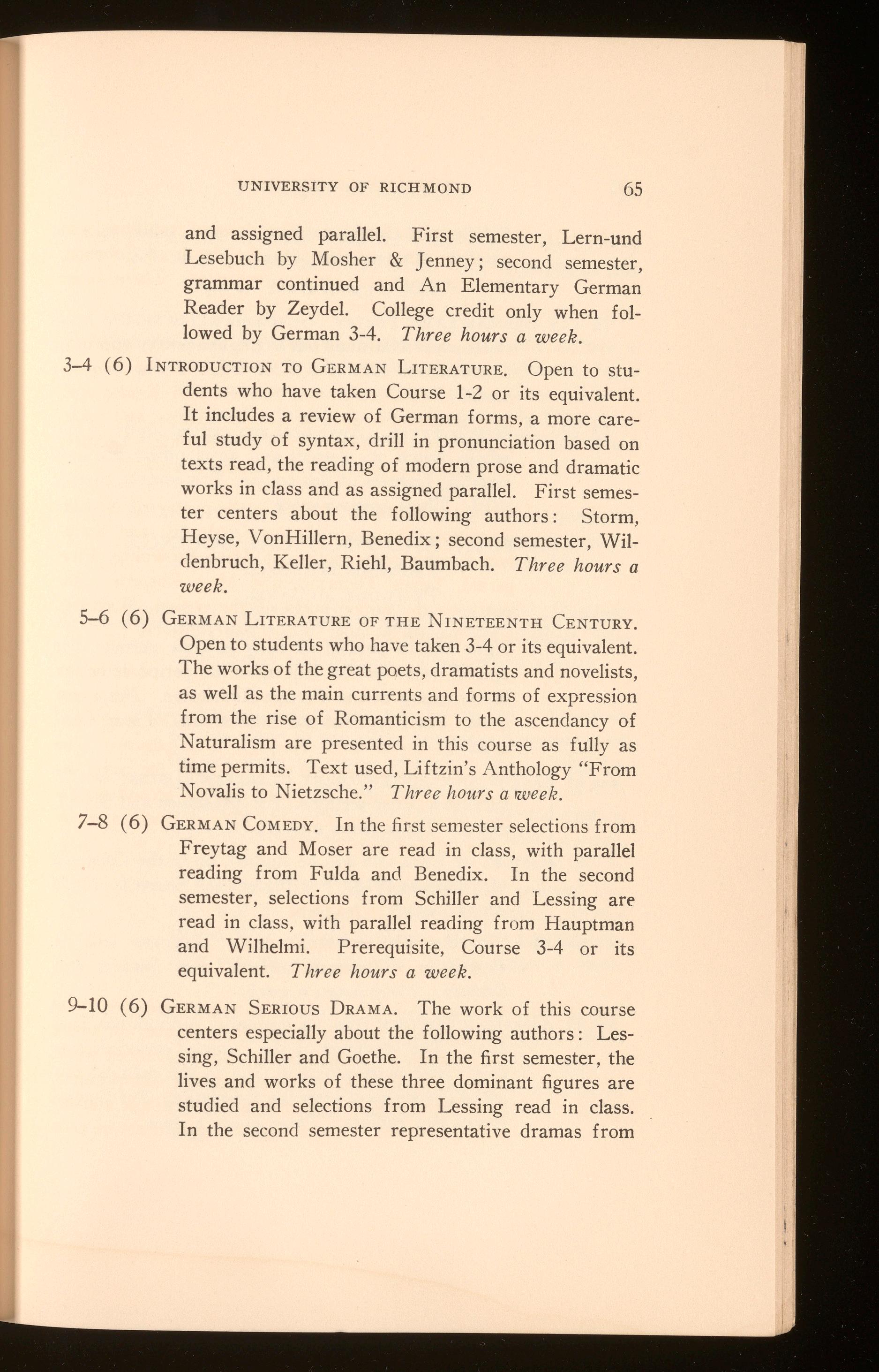
UNIVERSITYOF RICHMOND
65 and assigned parallel. First semester, Lern-und Lese bu ch by Mosher & Jenney ; second semester, grammar continued and An Elementary German Reader by Zeydel. College credit only when followed by German 3-4. Three hours a week.
3-4 (6) INTRODUCTIONTO GERMANLITERATURE. Open to students who have taken Course 1-2 or its equivalent. It includes a review of German forms, a more careful study of syntax, drill in pronunciation based on texts read, the reading of modern prose and dramatic works in class and as assigned parallel. First semester centers about the following authors : Storm, Heyse, VonHillern, Benedix; second semester, Wildenbruch, Keller, Riehl, Baumbach. Three hours a week.
5-6 (6) GERMANLITERATUREOFTHE NINETEENTH CENTURY. Open to students who have taken 3-4 or its equivalent. The works of the great poets, dramatists and novelists, as well as the main currents and forms of expression from the rise of Romanticism to the ascendancy of Naturalism are presented in this course as fully as time permits. Text used, Liftzin's Anthology "From Novalis to Nietzsche." Thre e hours a rweell.
7-8 (6) GERMANCOMEDY. In the first semester selections from Freytag and Moser are read in class, with parallel reading from Fulda and Benedix. In the second semester, selections from Schiller and Lessing are read in class, with parallel reading from Hauptman and Wilhelmi. Prerequisite, Course 3-4 or its equivalent. Three hours a week.
9-10 (6) GERMAN SERIOUSDRAMA. The work of this course centers especially about the following authors : Lessing, Schiller and Goethe. In the first semester, the lives and works of these three dominant figures are studied and selections from Lessing read in class. In the second semester representative dramas from
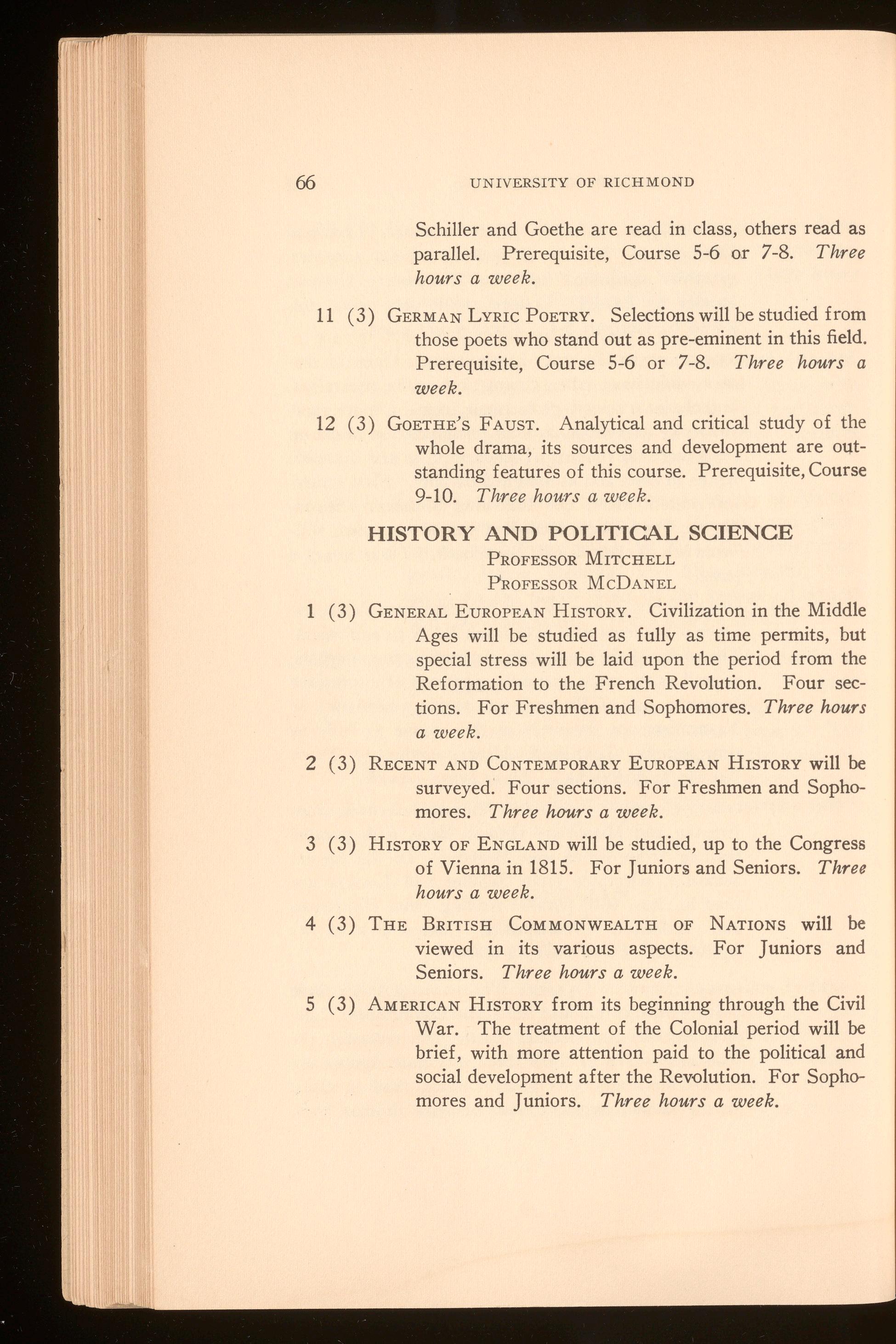
UNIVERSITYOF RICHMOND
Schiller and Goethe are read in class, others read as parallel. Prerequisite, Course 5-6 or 7-8. Three hours a week.
11 ( 3) GERMANLYRIC PoETRY. Selections will be studied from those poets who stand out as pre-eminent in this field. Prerequisite, Course 5-6 or 7-8. Three hours a week.
12 (3) GOETHE'S FAUST. Analytical and critical study of the whole drama, its sources and development are oqtstanding features of this course. Prerequisite, Course 9-10. Three hours a week.
HISTORY AND POLITICAL SCIENCE
PROFESSORMITCHELL
PROFESSORMcDANEL
1 (3) GENERALEUROPEANHISTORY. Civilization in the Middle Ages will be studied as fully as time permits, but special stress will be laid upon the period from the Reformation to the French Revolution. Four sections. For Freshmen and Sophomores. Three hours a week.
2 ( 3) RECENT AND CONTEMPORARYEUROPEANHISTORYwill be surveyed. Four sections. For Freshmen and Sophomores. Three hours a week.
3 ( 3) HISTORYOF ENGLANDwill be studied, up to the Congress of Vienna in 1815. For Juniors and Seniors. Three hours a week.
4 (3) THE BRITISH COMMONWEALTHOF NATIONS will be viewed in its various aspects. For Juniors and Seniors. Three hours a week.
5 ( 3) AMERICANHISTORY from its beginning through the Civil War. The treatment of the Colonial period will be brief, with more attention paid to the political and social development after the Revolution. For Sophomores and Juniors. Three hours a week.

6 ( 3) AMERICAN HISTORY from the Civil War to the present time will be studied in detail. For Sophomores and Juniors. Three hours a week.
7 (3) AMERICAN DIPLOMATIC HISTORY. This will include a detailed study of American foreign relations, from the Revolution to the present time. This course is designed primarily for those majoring in History or Government. For Juniors and Seniors. Three hours a wee k. (Not offered in 1931-1932.)
8 (3) INTERNATIONALLAW. The public laws of nations studied through text and cases. For Juniors and Seniors. Three hours a week. (Not offered in 1931-1932.)
9 (3) AMERICAN GovERNMENT will be discussed, National, State and Local, both in theory and practice. For Sophomores and Juniors. Three hours a week.
10 ( 3) INTERNATIONALRELATIONS will be studied. An effort will be made to articulate important happenings of the day with the course of study. Special attention will be given to such agencies as the League of Nations and Permanent Court of International Justice. For Sophomores and Juniors. Three hours a week.
11 ( 3) EUROPE SINCE 1870. The diplomatic and political history will be stressed. Causes and events of the World War and the problems of post-war Europe. For Juniors and Seniors. Three hours a week.
12 (3) GovERNMENT OF VIRGINIA. A brief summary of the history of Virginia government with particular attention to the present day problems. This course is intended primarily for those majoring in History or Government. For Juniors and Seniors. Three hours a week.

UNIVERSITYOF
MATHEMATICS
PROFESSORGAINES
ASSOCIATEPROFESSORWHEELER
1 ( 3) COLLEGEALGEBRA. This course includes quadratic equations, determinants, logarithms, solution of higher equations, permutations and combinations, probability, and infinite series. Given in both semesters.
2 (3) MATHEMATICSANALYSIS. An elementary course including functions and graphs, rate problems, simple differentiation and integration, trigonometry, and rectangular coordinates. Given in the second semester
3 (3) MATHEMATICSOF FINANCE. Annuities, amortization of debts, sinking funds, bond valuation, depreciation and life insurance.
4 (3) STATISTICS. The mathematical principles of statistics and the application of statistical methods in various fields.
5 (3) ANALYTICALGEOMETRY. Construction and discussion of loci and a detailed study of the straight line and circle and of the simpler properties of the parabola, ellipse and hyperbola.
6 (3) CALCULUS. An elementary course in differential and integral calculus.
7 (3) CALCULUS. An advanced course m differential and integral calculus.
8 (3) ANALYTICAL GEOMETRY. Advanced course following Course 5.
9 (3) DIFFERENTIALEQUATIONS. Open to students who have completed courses 7 and 8.
10 ( 3) INFINITE SERIES AND PRODUCTS. Courses 7 and 8 are prerequisite to this course.

UNIVERSITYOF RICHMOND
PHILOSOPHY
PROFESSORHOLTZCLAW
1 ( 3) INTRODUCTIONTO PHILOSOPHY. A general survey of the field of philosophy, its aims, methods and meaning; a study of the various types of metaphysical theory; and an introduction to the major problems of philosophy, such as the nature of matter, life and mind; the existence of God; the relation of mind and body; freedom and determinism; and the status of values in the cosmos. Three hours a week.
2 ( 3) ETHICS. A study of the development of moral conceptions, an examination of the different types of ethical theory, and an attempt to determine the valid principles of right conduct. Three how.rsa rzveek.
3 ( 3) HISTORY OF ANCIENT AND MEDIEVALPHILOSOPHY. This course offers a survey of the doctrines of the great thinkers of classical antiquity and of the middle ages, with especial emphasis on the teachings of Plato and Aristotle and a study of selections from their writings. Three hours a week.
4 ( 3) HISTORYOF MODERNPHILOSOPHY. A study of the development of European philosophy since the Renaissance; the philosophy of Descartes and the rationalistic movement on the continent; English empiricism; the system of Kant and the German idealistic movement; Schopenhauer and Spencer. Three hours a week.
5 ( 3) PHILOSOPHYOFRELIGION . This course includes a brief survey of comparative religion and the psychology of the religious experience, and seeks to determine the validity of fundamental religious ideas, examining such questions as the existence and nature of God, His relation to the world, the problem of evil, human freedom, salvation and immortality . Thlree hours a w eek
6 ( 3) CONTEMPORARYPHILOSOPHY. A study of recent movements in philosophy; idealism since Hegel; James, Dewe y and the pragmatic philosophy; Bergson's vitalism; and contemporary realism Thr ee hours a w eek.
7 ( 3) EsTHETICS. A study of the various types of esthetic theory and their leading exponents, with an attempt to determine the nature and function of art in human experience. Three hours a week. (Not given in 1931-1932.)
8. ( 3) LoGIC. A study of the methods by which the mind arrives at scientific truth; the rules and presuppositions of inductive and deductive thinking, with an introduction to the various types of logical theory. Three hours a week. (Not given in 1931-1932.)
PHYSICAL TRAINING
F. M. DoBSON, Director
M. U. PITT, Associate Director
A minimum of two semester hours in Physical Training is required of all degree candidates, and a maximum of four semester hours may be offered. The program embraces various forms of athletics, making it possible for every student to participate in one or more sports. The following credits are offered :
FRESHMAN-
Football-½ sem. hr .
Baseball-½ sem. hr.
Basketball-½ sem. hr.
Track-½ sem. hr.
Tennis-½ sem. hr.

VARSITY-
Football-½ sem. hr.
Baseball-½ sem. hr
Basketball-½ sem. hr.
Track-½ sem. hr.
Tennis-½ sem. hr.
Compulsory Track (12 weeks)-1 sem. hr.
INFORMAL
Fraternity and Oass Basketball-½ sem hr.
Fraternity and Oass Track Meet-½ sem. hr.
Volley Ball-½ sem. hr.
Band-½ sem. hr.

UNIVERSITYOF RICHMOND
PHYSICS
PROFESSORLOVING
ASSOCIATEPROFESSORALBRIGHT
1 ( 5) GENERAL PHYSICS. This course embraces Mechanics, Wave Motion and Sound, and Heat. Lectures, demonstrations, and problems. Three lecture hours and two laboratory periods per week.
2 (5) GENERALPHYSICS. A continuation of course 1, embracing Light, Electricity, and Magnetism. Three lecture hours and two laboratory periods per week.
3 ( 3) MODERNPHYSICS. Embraces Thermionic Effect, Photoelectric effect, X-rays, and Crystal Structure. Prerequisites, Physics 1 and 2, and Mathematics 1 and 2. Three lecture hours per week.
4 ( 3) MODERNPHYSICS. A continuation of course 3, embracing Radio-activity, Electron Theory of Matter, and an Optional Subject. Prerequisites, same as for course 3. Three lecture hours per week.
5 (5) ELECTRICITYAND MAGNETISM. Theory and Measurements. Prerequisites, Physics 1 and 2, and Mathematics 1 and 2. Three lecture hours and two laboratory periods per week.
6 ( 5) DIRECT CURRENTCIRCUITS. Theory and Testing. Prerequisites, same as for course 5. Three lecture hours and two laboratory p eriods per week.
7 ( 5) MECHANICS. Fundamental Laws of Force and Motion. Prerequisites, Physics 1 and 2, and Mathematics 5 and 6. Three lecture hours and two laboratory periods per week.
8 (5) HEAT AND LIGHT. Thermodynamics and Wave Theory. Prerequisites, same as for course 7. Three lecture hours and two laboratory periods per week.

UNIVERSITYOF RICHMOND
9 ( 5) ELECTRICALWAVES AND OscILLATIONS. Theory and Measurements. Prerequisites, Physics 1 and 2, and Mathematics 5 and 6. Three lecture hours and two laboratory periods per week. (Not given in 19311932.)
10 ( 5) ALTERNATINGCURRENTCIRCUITS. Theory and Testing. Prerequisites, same as for course 9. Three lecture hours and two laboratory periods per week. (Not given in 1931-1932.)
N. B.: Courses 7 and 8 are required for all majors in Physics, and are essential to all students who will take graduate work in Physics or Engineering.
PSYCHOLOGY
PROFESSORAsTROP
1-2 (6) GENERALPSYCHOLOGY.Normal adult human psychology. The work of the first semester will be given over to a study of the anatomy, histology, and physiology of the nervous system and the simpler psychological functions, sensation and perception. During the second semester, the more complex psychological processes involved in human consciousness and behaviour will be considered ; imagination, attention, reasoning, will, instinct, habit, feeling, and emotion. Stress will be put upon experimental findings throughout. Three howrs a week. Not open to Freshmen.
3 ( 3) EXPERIMENTAL PSYCHOLOGY. Laboratory psychology. Experiments will be performed in such psychological processes as sensation, perception, imagination, memory, association. This course is intended to give the student a foundation in the experimental methods of the subject. One lecture and four hours laboratory a week. Laboratory hours to be arranged. Prerequisite, Psychology 1-2.
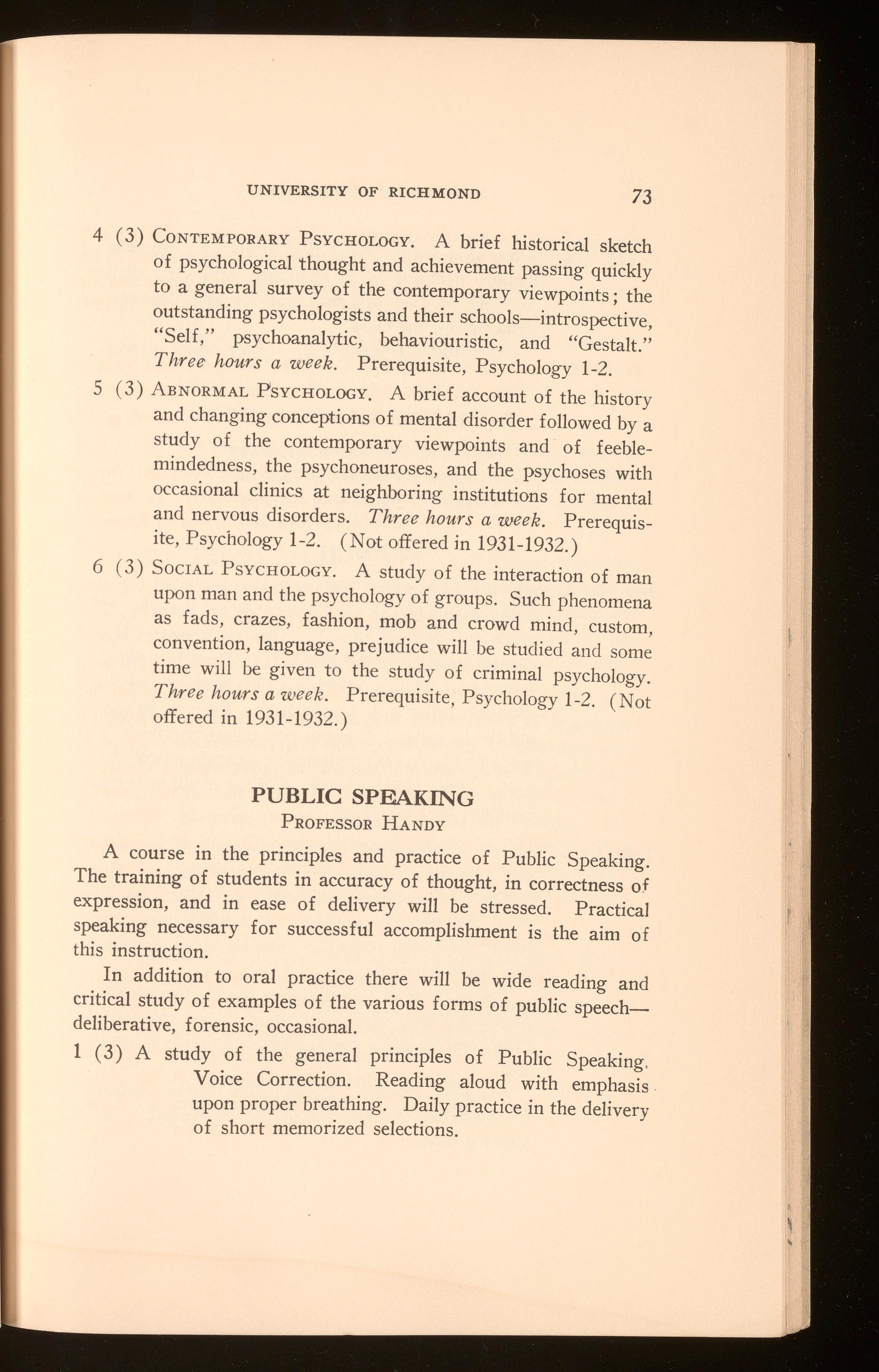
4 ( 3) CONTEMPORARYPSYCHOLOGY.A brief historical sketch of psychological thought and achievement passing quickly to a general survey of the contemporary viewpoints; the outstanding psychologists and their schools-introspective, "Self," psychoanalytic, behaviouristic, and "Gestalt." Three hours a week. Prerequisite, Psychology 1-2.
5 ( 3) ABNORMALPSYCHOLOGY.A brief account of the history and changing conceptions of mental disorder followed by a study of the contemporary viewpoints and of feeble- mindedness, the psychoneuroses, and the psychoses with occasional clinics at neighboring institutions for mental and nervous disorders. Three hours a week. Prerequis- ite, Psychology 1-2. (Not offered in 1931-1932.)
6 ( 3) SOCIAL PSYCHOLOGY.A study of the interaction of man upon man and the psychol ogy of group s. Such phenomena as fads, crazes, fashion, mob and crowd mind, custom , convention, language, prejudice will be studied and some time will be given to the study of criminal psychology. Thre e hours a w eek. Prerequisite, Psychology 1-2. (Not offered in 1931-1932 )
PUBLIC SPEAKING
PROFESSORHANDY
A course in the principles and practice of Public Speaking. The training of students in accuracy of thought, in correctness of expression, and in ease of delivery will be stressed. Practical speaking necessary for successful accomplishment is the aim of this instruction.
In addition to oral practice there will be wide reading and critical study of examples of the various forms of public speech- deliberative, forensic, occasional.
1 ( 3) A study of the general principles of Public Speaking Voice Correction. Reading aloud with emphasis . upon proper breathing. Daily practice in the delivery of short memorized selections.
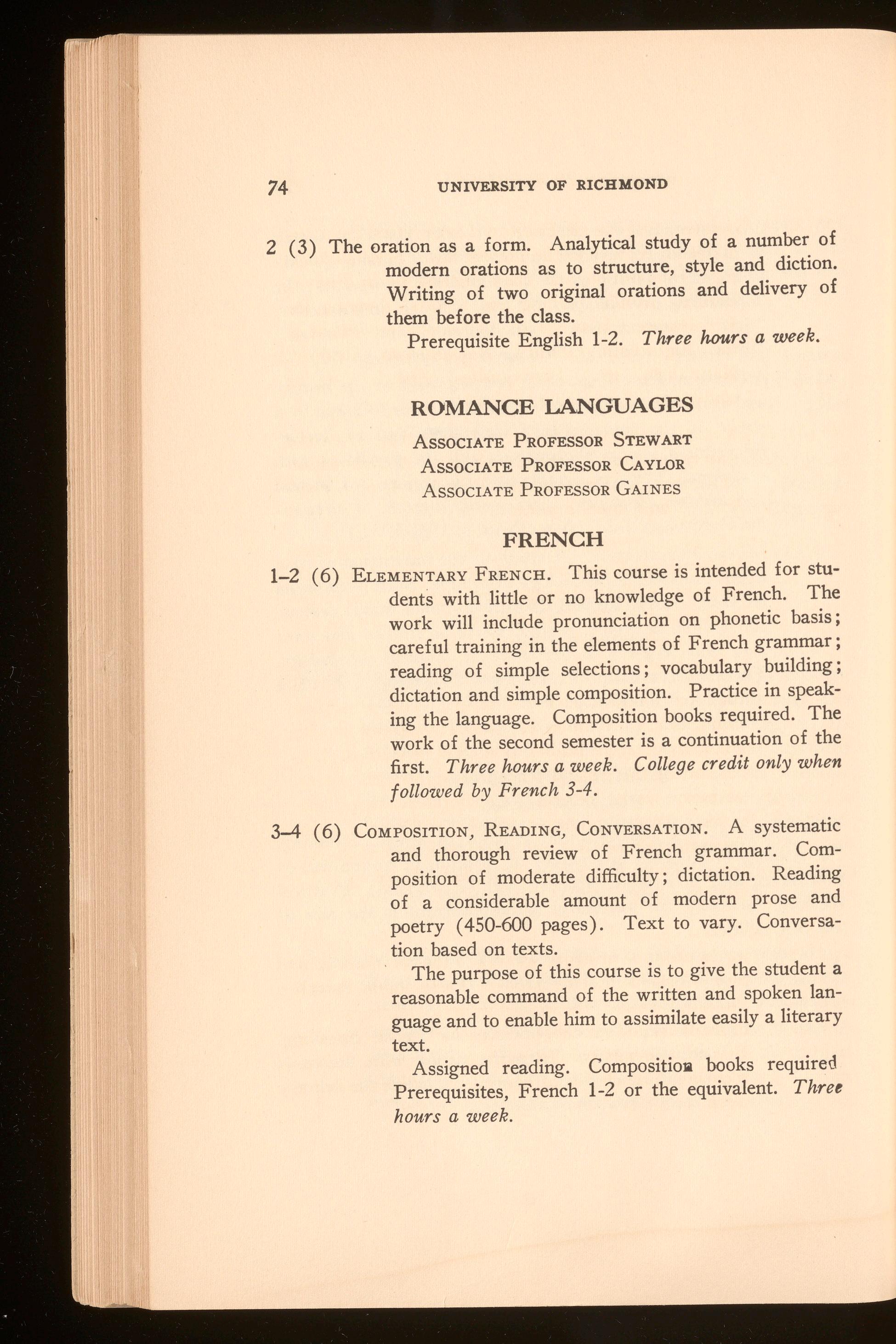
2 ( 3) The oration as a form. Analytical study of a number of modern orations as to structure, style and diction. Writing of two original orations and delivery of them before the class.
Prerequisite English 1-2. Three hours a week.
ROMANCE LANGUAGES
ASSOCIATEPROFESSORSTEWART
ASSOCIATEPROFESSORCAYLOR
ASSOCIATEPROFESSORGAINES
FRENCH
1-2 (6) ELEMENTARYFRENCH. This course is intended for students with little or no knowledge of French. The work will include pronunciation on phonetic basis; careful training in the elements of French grammar; reading of simple selections; vocabulary building; dictation and simple composition. Practice in speaking the language. Composition books required. The work of the second semester is a continuation of the first. Three hours a week. College credit only when followed by French 3-4.
3-4 (6) COMPOSITION,READING,CONVERSATION.A systematic and thorough review of French grammar. Composition of moderate difficulty; dictation. Reading of a considerable amount of modern prose and poetry ( 450-600 pages). Text to vary. Conversation based on texts.
The purpose of this course is to give the student a reasonable command of the written and spoken language and to enable him to assimilate easily a literary text.
Assigned reading. Compositio:a books required Prerequisites, French 1-2 or the equivalent. Three hours a week.

UNIVERSITYOF RICHMOND
5 (3) A GENERALSURVEYOF FRENCH LITERATUREfrom the sixteenth century to the present day. Selected read- ings, composition and class discussions in French, lectures, parallel reading and reports, covering the Renaissance, Classicism, the philosophic movement of the Eighteenth Century, Romanticism, Realism, Naturalism, etc. Prerequisites, French 3-4, or equivalent. Three hours a week.
6 ( 3) A GENERALSuRv11:YOF FRENCH LITERATUREfrom the sixteenth century to the present day. A continuation of Course 5. Prerequisites, French 3-4, or equiva- lent. ThJree hours a week.
7 (3) THE FRENCH NOVEL. A study of the most important writers from Rousseau to the present time. Analysis of texts. Collateral reading and reports. Conducted largely in French. Prerequisites, French 3-4, or the the equivalent, and a complete reading knowledg,e. Three hours a week.
8 ( 3) HISTORYOF FRENCH LYRIC POETRY. The principles, elements and evolution of French versification with emphasis upon the leading poets will be studied. Discussion of the general tendencies in French poetry. Memory work, lectures. Collateral reading. Reports. To be conducted largely in French. Pre- requisites, French 3-4, and a complete reading knowl- edge. Three hours a week. (Not offered in 1931- 1932.)
10 ( 3) CLASSICISM"L'age d'or de la litterature francaise." Reading in class the principal writers of the seventeen cen- tury ( Corneille, Racine, Moliere, La Fontaine, Pascal, Bioleau, Boussuet, the women writers, and the writers of memoirs and maxims) ; discussions and lectures in French, one-half parallel reading and reports. Pre- requisite, French 5-6 or equivalent. Three hours a week.

UNIVERSITYOF RICHMOND
SPANISH
1-2 (6) ELEMENTARYSPANISH. A course for students of little or no knowledge of Spanish. It deals with the elements of grammar and simple composition. Special attention is paid to pronunciation, conversation, dictation, fluency in reading and practical use of the language. Three hours a week. College credit only when followed by Spanish 3-4.
3-4 (6) INTERMEDIATESPANISH. This course deals with a systematic review of grammar, dictation and composition of moderate difficulty. Reading of typical works by modern poets and prose writers ( 450-600 pages). Text to vary. Attention is given to conversation and discussion in Spanish, based upon the texts studied and upon topics of practical every-day Spanish. Assigned reading. Spanish will be the language of the classroom.
Prerequisites, Spanish 1-2 or the equivalent. Three hours a week.
S (3) ADVANCEDREADING,CONVERSATIONAND COMPOSITION. A study of the modern Spanish writers, such as Gald6s, Alarcon, Valera, Valdes and Ibanez. The outstanding works of the above authors will be used as texts. Students are expected to write themes and reading reports in Spanish. Collateral Reading. To be conducted largely in Spanish.
Prerequisites, Spanish 3-4 or the equivalent. Three hours a wee k
6 (3) MODERNSPANISH DRAMA AND POETRY. A study of the drama and poetry in the XVIII, XIX, and XX centuries . Assigned collateral reading, reading r eports, lectures. The themes must be written in Spanish.
7-8 (3) EL SIGLO DE ORO. A study of the most prominent writers and their works. Special attention is placed
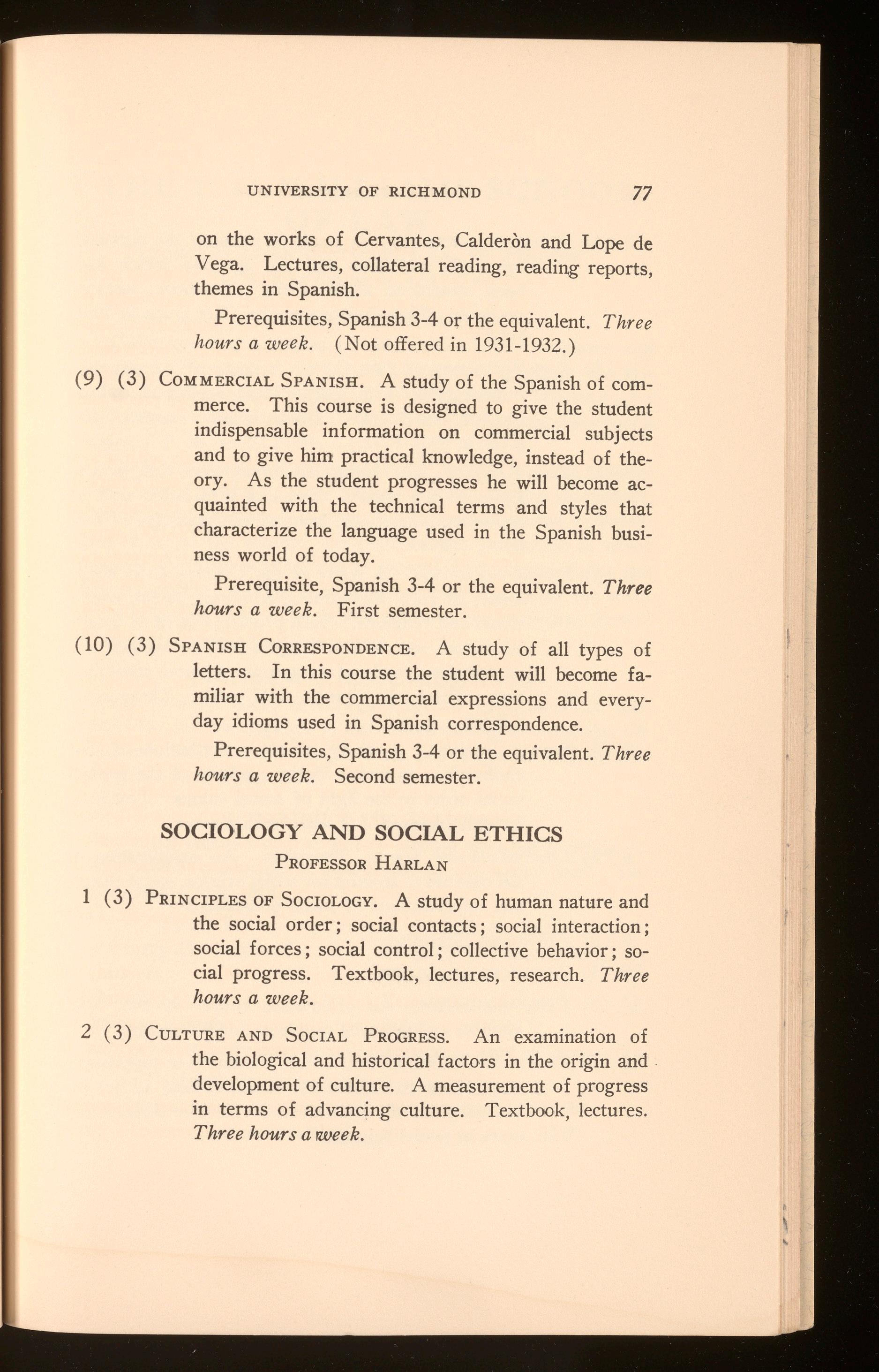
UNIVERSITYOF RICHMOND 77
on the works of Cervantes, Calderon and Lope de Vega. Lectures, collateral reading, reading reports, themes in Spanish.
Prerequisites, Spanish 3-4 or the equivalent. Thr ee hours a week. (Not offered in 1931-1932.)
( 9) (3) COMMERCIALSPANISH. A study of the Spanish of commerce. This course is designed to give the student indispensable information on commercial subjects and to give him practical knowledge, instead of theory. As the student progresses he will become acquainted with the technical terms and styles that characterize the language used in the Spanish business world of today.
Prerequisite, Spanish 3-4 or the equivalent. Three hours a week . First semester.
(10) (3) SPANISH CORRESPONDENCE.A study of all types of letters. In this course the student will become familiar with the commercial expressions and everyday idioms used in Spanish correspondence.
Prerequisites, Spanish 3-4 or the equivalent. Three lwurs a week. Second semester.
SOCIOLOGY AND SOCIAL ETHICS
PROFESSORHARLAN
1 (3) PRINCIPLESOF SocIOLOGY. A study of human nature and the social order ; social contacts ; social interaction ; social forces; social control; collective behavior; social progress. Textbook, lectures, research. Three hours a week.
2 ( 3) CULTUREAND SocIAL PROGRESS. An examination of the biological and historical factors in the origin and • development of culture. A measurement of progress in terms of advancing culture. Textbook, lectures . Three hours a rweek.
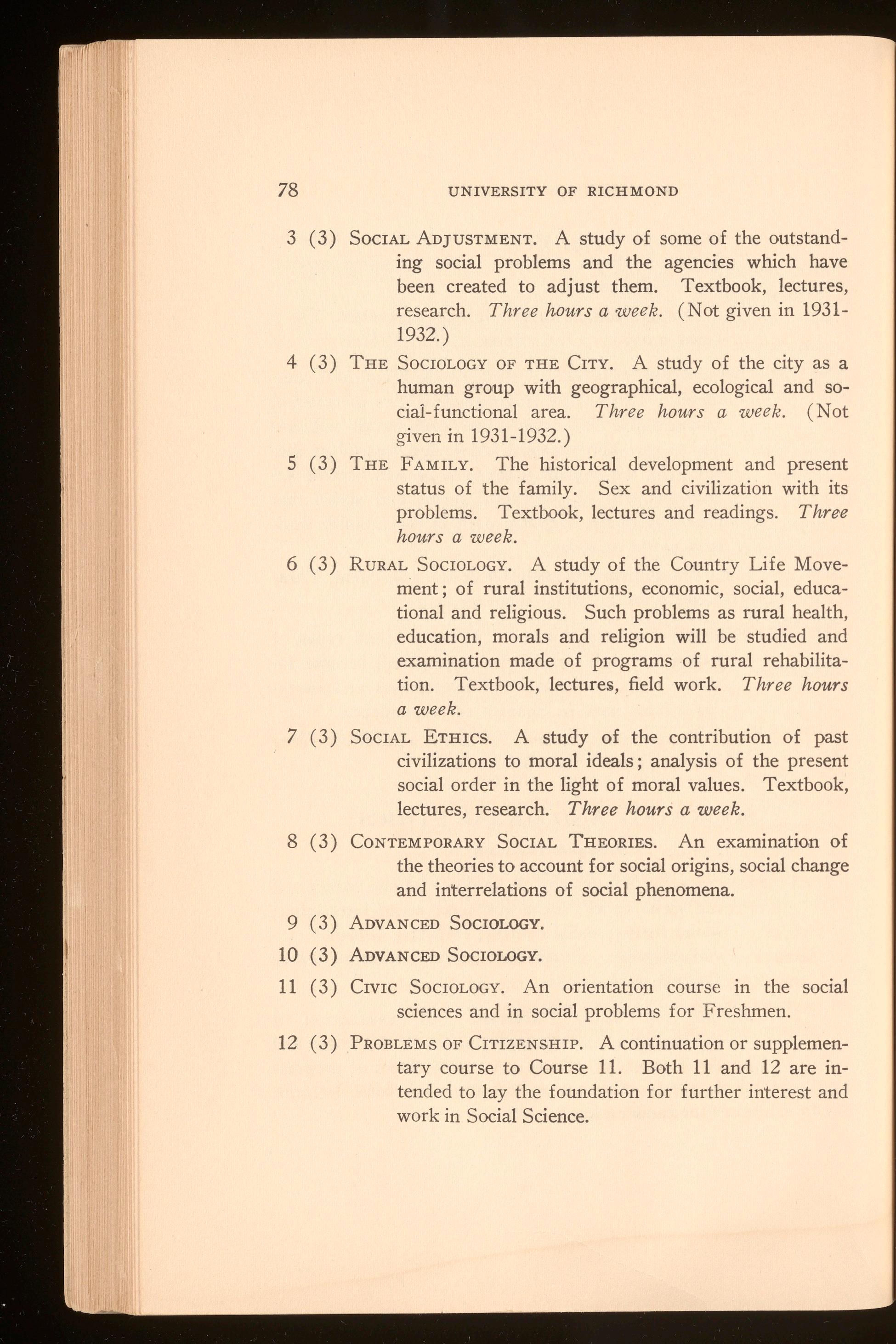
3 ( 3) SocIAL ADJUSTMENT. A study of some of the outstanding social problems and the agencies which have been created to adjust them. Textbook, lectures, research. Three hours a •week. (Not given in 19311932.)
4 (3) THE SocIOLOGYOF THE CITY. A study of the city as a human group with geographical, ecological and sociai-functional area. Three hours a week. (Not given in 1931-1932.)
5 (3) THE FAMILY. The historical development and present status of the family. Sex and civilization with its problems. Textbook, lectures and readings. Three hours a week.
6 ( 3) RuRAL SocIOLOGY. A study of the Country Life Movement; of rural institutions, economic, social, educational and religious. Such problems as rural health, education, morals and religion will be studied and examination made of programs of rural rehabilitation. Textbook, lectures, field work. Three hours a week.
7 ( 3) Soc1AL ETHICS. A study of the contribution of past civilizations to moral ideals; analysis of the present social order in the light of moral values. Textbook, lectures, research. Three hours a week.
8 ( 3) CONTEMPORARYSocIAL THEORIES. An examination of the theories to account for social origins, social change and interrelations of social phenomena.
9 (3) ADVANCEDSOCIOLOGY.
10 (3) ADVANCEDSOCIOLOGY.
11 ( 3) CIVIC SocIOLOGY. An orientation course in the social sciences and in social problems for Freshmen.
12 (3) PROBLEMSOF CITIZENSHIP. A continuation or supplementary course to Course 11. Both 11 and 12 are intended to lay the foundation for further interest and work in Social Science.
THE T. C. WILLIAMS SCHOOL OF LAW
FREDERICWILLIAM BOATWRIGHT,LL. D. President
M. RAY DOUBLES,J.D., Dean
COURSES OF STUDY
There are two divisions of the School, viz.: Forenoon and Evening. The courses in both divisions are given in the law building on the campus in the city of Richmond. The hours for the forenoon classes are from 9 A. M. to 1 P. M.; for the evening classes, 7 P. M. to 10 P. M.
The Forenoon division requires three, and the Evening requires four, years of work leading to the law degree. Regular attendance, satisfactory class room recitations, and approved written examinations in all of the subjects are required for graduation in either division. No degree candidate is permitted to advance from one class to another, without having successfully completed the work of the preceding class either in this school or the equivalent thereof cit some other accredited law school.
ENTRANCE REQUIREMENTS
Sixty semester hours of college work are required of all candidates for the law degree. A law school catalogue containing detailed information ooncerning courses and expenses will be sent upon application to the Dean.
SUMMER LAW SCHOOL
The usual summer course will be offered covering a period of twelve weeks, consisting of two terms of six weeks each. The course begins June 15th.
FIRST TERM
Property II-first half.
Carriers
Bankruptcy
Bills and Notes

SECONDTERM
Property II-second half. Damages.
Criminal Procedure
Sales Wills
A period of forty-four hours is devoted to each subject.
FEES OF SUMMER LAW SCHOOL
Matriculation ( one fee covers both terms) ... $10.00 Tuition ( for each subject) . . . . . . . . . . . . . . . . 20.00

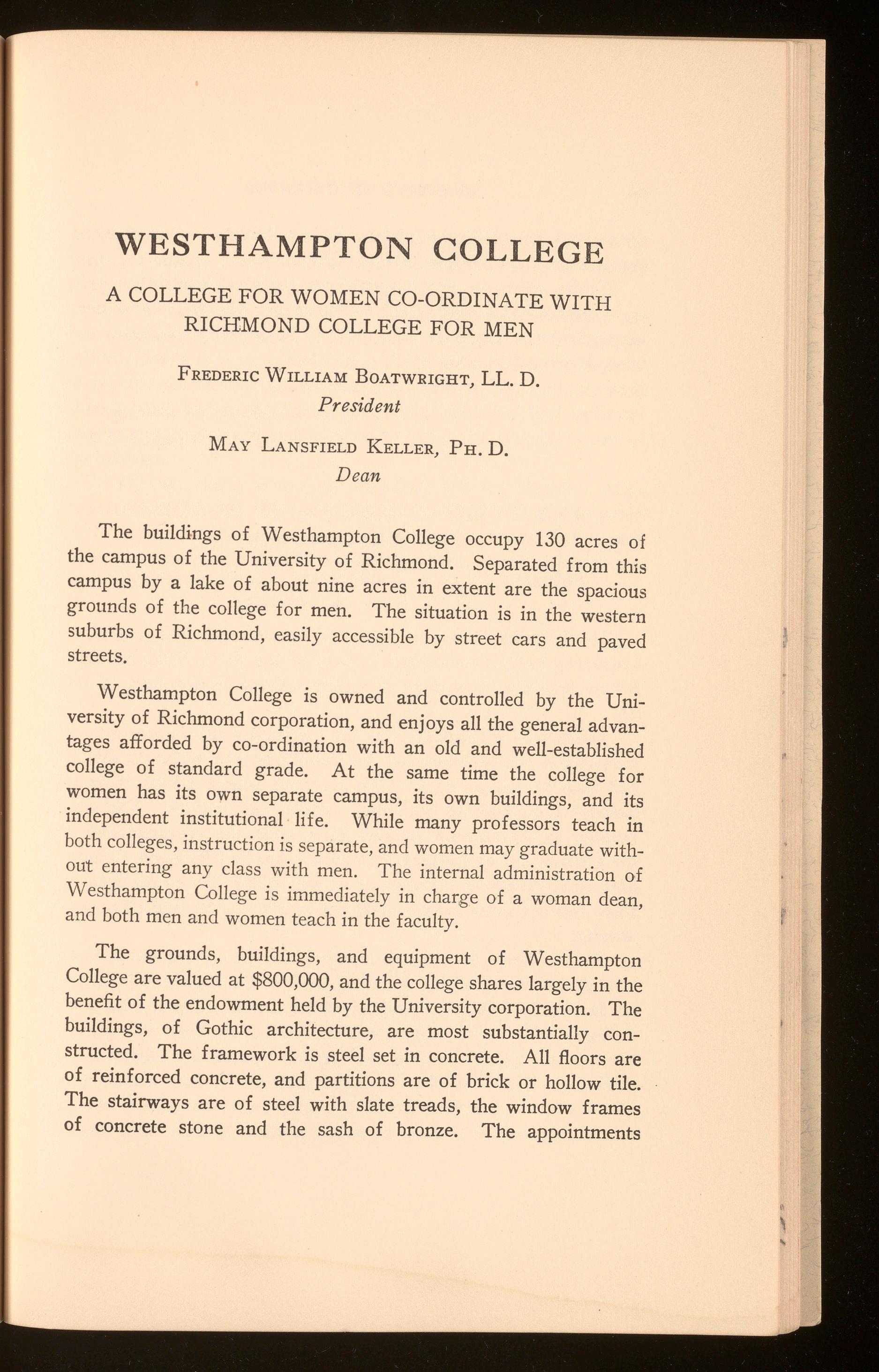
WESTHAMPTON COLLEGE
A COLLEGE FOR WOMEN CO-ORDINATE WITH RICHMOND COLLEGE FOR MEN
FREDERIC WILLIAM BOATWRIGHT, LL. D. President
MAY LANSFIELD KELLER, PH. D. Dean
The buildings of Westhampton College occupy 130 acres of the campus of the University of Richmond. Separated from this campus by a lake of about nine acres in extent are the spacious grounds of the college for men. The situation is in the western suburbs of Richmond, easily accessible by street cars and paved streets.
Westhampton College is owned and controlled by the Uni- versity of Richmond corporation, and enjoys all the general advan- tages afforded by co-ordination with an old and well-established college of standard grade. At the same time the college for women has its own separate campus, its own buildings, and its independent institutional life. While many professors teach in both colleges, instruction is separate, and women may graduate without entering any class with men. The internal administration of Westhampton College is immediately in charge of a woman dean, and both men and women teach in the faculty.
The grounds, buildings, and equipment of Westhampton College are valued at $800,000, and the college shares largely in the benefit of the endowment held by the University corporation. The buildings, of Gothic architecture, are most substantially con- structed. The framework is steel set in concrete. All floors are of reinforced concrete, and partitions are of brick or hollow tile. The stairways are of steel with slate treads, the window frames of concrete stone and the sash of bronze. The appointments

UNIVERSITY OF RICHMOND
throughout are of the very best. Safety, health, and comfort of students have everywhere been considered. Similar entrance requirements and similar standards apply in Westhampton College and in Richmond College. The next session opens September 15th, 1931. For special catalogue and other information, address
MA y L. KELLER, Dean of Westhampton College,
University of Richmond, Va.
THE EVENING SCHOOL OF BUSINESS ADMINISTRATION
FREDERIC WILLIAM BOATWRIGHT, LL. D., President H. H. SEAY, JR., Director
The Evening School of Business Administration is located at Lombardy and Grace Streets in part of the T. C. Williams Law School building, convenient to students living in any part of the city.
The School is maintained by the University for the purpose of providing a college education for those who are unable to devote full time to college work. The Evening School allows them to combine their training with their regular occupations. The curriculum is planned on parallel lines with the requirements in the Department of Business Administration in Richmond College, only such variations being made as will enable the students to fit their courses most closely with the needs of the business community.
Three classes of students are provided for : Degree students who desire to take all the work required for the degree of Bachelor of Science in Business Administration; Credit students who wish college credit for the work taken but who, at the time of registration, do not intend to take the degree; Special, or Observation, students. This last class includes students of two kinds: ( 1) those who do not wish credit but who desire to take a certain course or group of courses as an aid to them in their daily work;
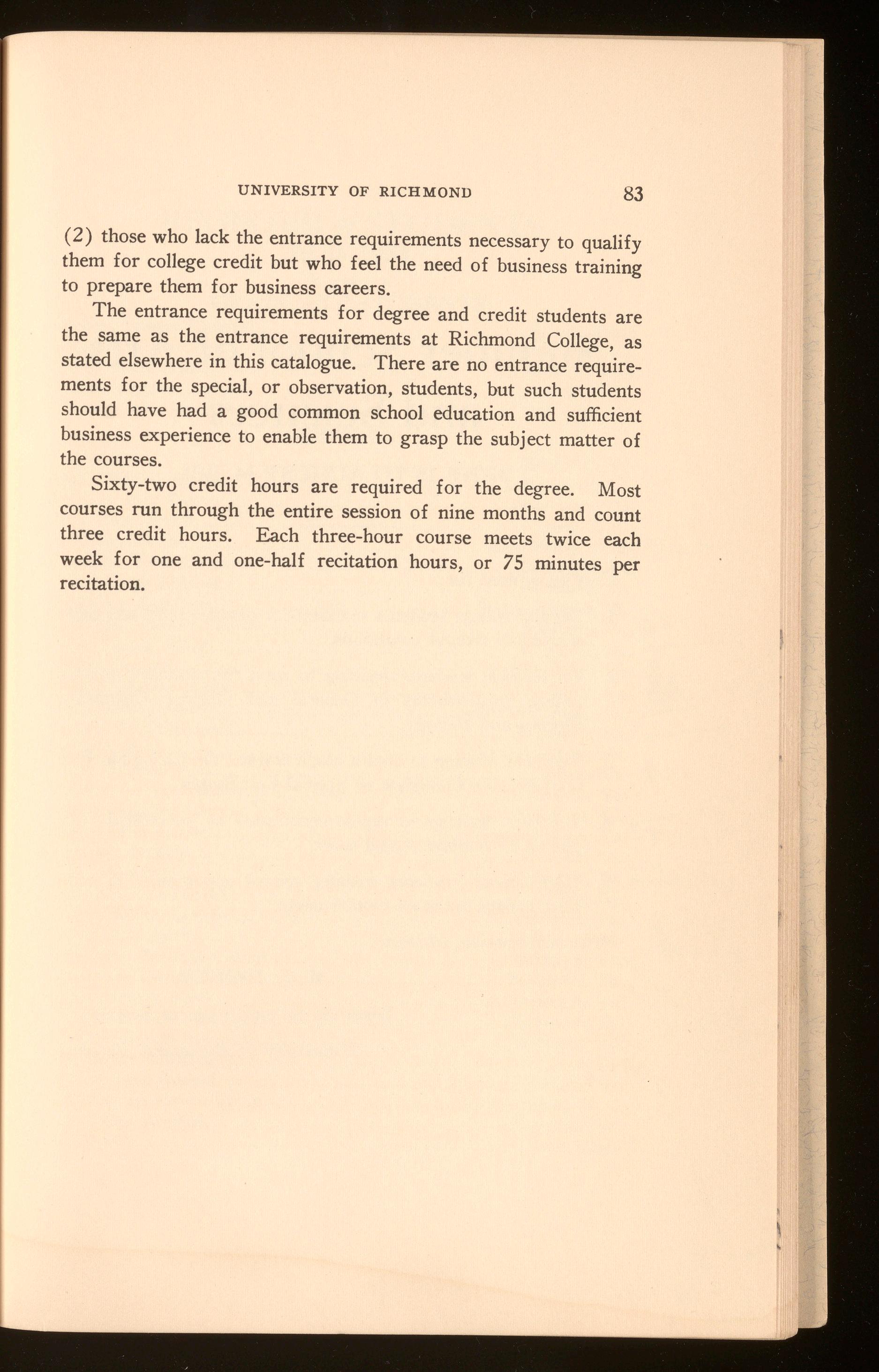
(2) those who lack the entrance requirements necessary to qualify them for college credit but who feel the need of business training to prepare them for business careers.
The entrance requirements for degree and credit students are the same as the entrance requirements at Richmond College, as stated elsewhere in this catalogue. There are no entrance requirements for the special, or observation, students, but such students should have had a good common school education and sufficient business experience to enable them to grasp the subject matter of the courses.
Sixty-two credit hours are required for the degree. Most courses run through the entire session of nine months and count three credit hours. Each three-hour course meets twice each week for one and one-half recitation hours, or 75 minutes per recitation.
Summer School of Arts and Sciences
JUNE 15 TO AUGUST 14, 1931
Courses offered for :
1. Regular college students working for degree credit and those wishing to remove conditions.
2. Pre-medical students desiring to meet the standard medical college requirements in General and Organic Chemistry, Physics and Biology.
3. Teachers wishing to obtain credit toward the Collegiate Professional, the Collegiate or Special Certificates.
4. Teachers desiring to renew certificates by successful completion of summer school work.
5. High school Students wishing special opportunity to complete college entrance requirements.
For information, address
W. L. PRINCE, DIRECTOR OF
THE SUMMER

SCHOOL,
University of Richmond, Virginia
REGISTER of STUDENTS 1930-1931
GRADUATE STUDENTS
Dods on, Samuel Kendrick. . .............. ................ ........... Austin, T exa s Prich a rd , E lmer Oyd e.............................
.......Barb ourville , Ky Myers, Hugh Irvin .......... ..........................................................Br andon , Miss Schotz, Seymour
We ave r, J ohn Blount
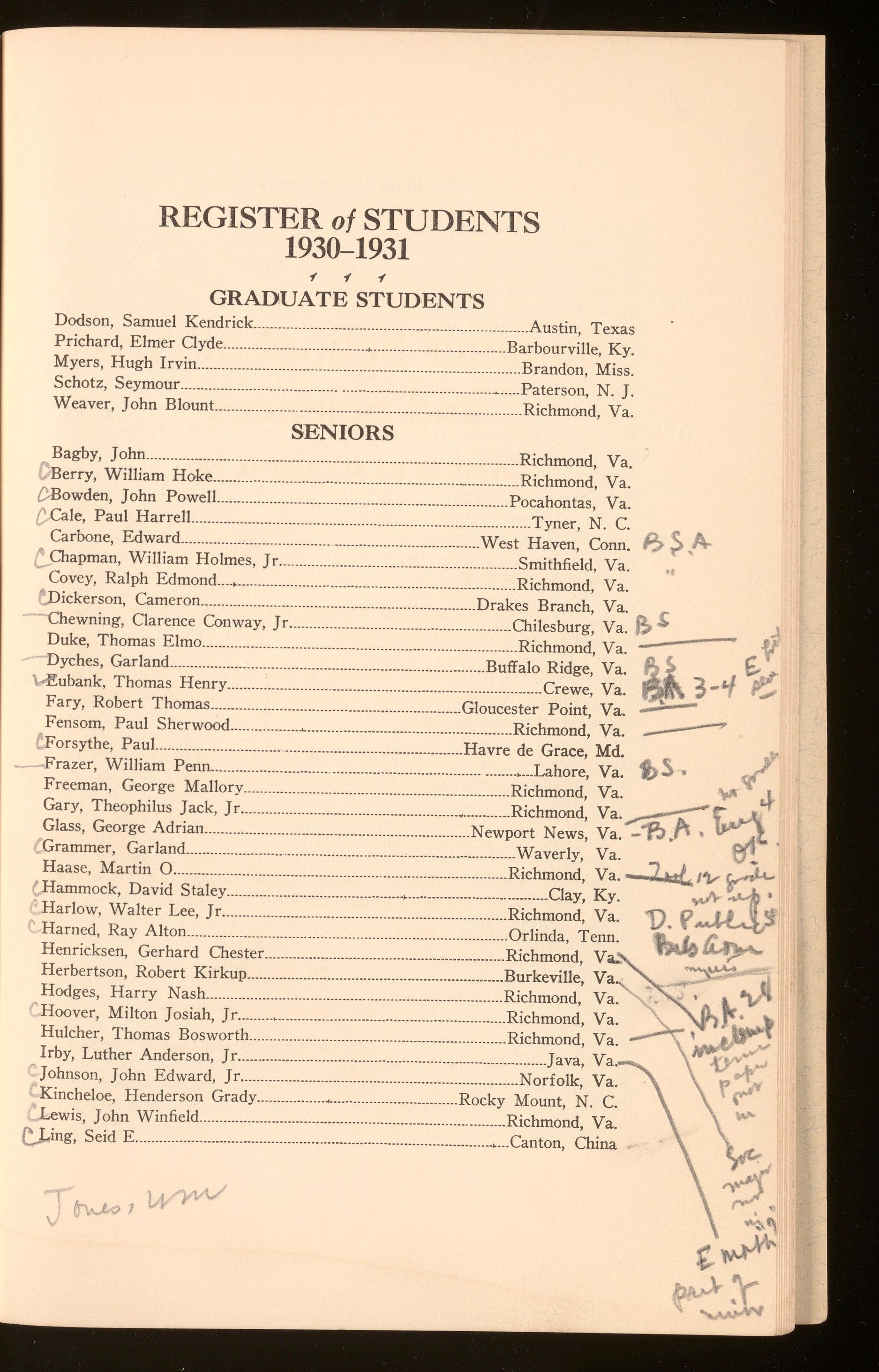
erson, N . J .
ond, Va
SENIORS
Bagby, J ohn .......... ...............................
, Va Berry, William Hoke ...........
Richmond , Va CB owden , John PowelL. ..
Va {'-Cale, Paul Harrell ............
Tyner , N C. Carbone , Edward
.West Haven, Conn. I'>Chapman , William Holme s, Jr
....Smithfield , Va. Covey, Ra lph Edmond •
..........Richmond , Va . ., icker son, Cam er on
.Drakes Branch , Va "Chewning , Oarenc e Conway , Jr. ...............................
...Chilesburg, Va & Duke , Th omas Elm o....................................... ............................Richmond , Va.Dyche s, Garland .. ........... ............ ............. Buffalo Ridge, Va. ubank , Th omas Henry ........ ............ ........... ...............Crewe, Va
F a ry , Rob ert Th omas .......................... ............ ....Gloucester Point, Va. Fen som, Paul Sh erwood ............... .............. ......... ..Richmond, Va. F or syth e, PauL. .......... ... ...... ............. .......Havre de Grace, Md. - -Fraz er , Willi am Penn. .............. .............. ............ •...Lahore, Va. 1:,S •
F r eema n , Geo r g e Ma llor y ......... ......... ...........Richmond, Va. Gary, Th eophilus ~ack , Jr ................. ........ ........•.. ..Richmond, Va. ~ Glas s, George Adnan ..................................... ...........N ewport News, Va. - "f.>. • Grammer , Ga rland .... ........... ........... ...................... ....Waverly , Va. H a as e, Martin 0 ..... ........... ........... ................. .Richmond, Va . Hamm ock , David Staley ............ ......... .......... .......... Oay, Ky. H ar low, Walt er Le e, Jr . ............ ................ ........... .Richmond , Va. H a rn ed, R ay Alt on ....... .......... .............................. Orlinda, Tenn. H enri ckse n, Gerhard Chester .......... ................ ........ Richmond , Va.;: H er bert son, Robert Kirkup ................ .......... .......... ...Burkeville, Va Hodg es, Harry N ash .................. .............. ........... ..Richmond, Va. H oover , Milt on Josiah, Jr ....... ... ........... ........ Richmond , Va . Hulch er , Thomas Bosworth ......... ............ .................... Richmond, Va. Irby, Luther Anderson , Jr ......... ............ ................. ............Java, Va . J ohnson, J ohn Edward, Jr ........ ........ ........ .........Norfolk, Va. Kinch eloe, Hend er son Grady ....... ..... ..... ................Rocky Mount , N. C. Le w is, John Winfi eld ......... ........... .............. ......Richmond, Va. ing, Seid £ ........ ........ ....... .... • Canton , China
t,.J,ol
UNIVERSITY OF RICHMOND
f Louthan, McIntyre Richards Bluefield, W. Va. CLovenstein, Bernard Irving ............•.....................................................Richmond, Va. •• ..JI' undin, John Chesley ............................................................................Richmond, Va. <;/~ ~cCall, Marsh Howard ..........................................................................Tazewell, Va. Marshall, Wallace Williams ....................................................................Keeling, Va. C.Miller, Oarence William ............•...........·-···············································Crozet, Va. l Morrissette, Bruce Archer ....................................................................Richmond, Va. ~'Brien, Clyde G...................................................·-·························Appomattox, Va. f3 S __..-t)den, Philip W ood ..............................................................................Remington, Va. $ Overton, Edward Franklin ..................................................••·············-·····Louisa,Va. ayne, Richard Weedon, Jr .................................................................Richmond, Va. .. f. Puller, James Bransford, Jr ...........................................·-······-····· ..····Ricfunond,Va. u,., ~iddle, Benjamin Agnue ..Blairs, Va. C:il1,,I..,,..,,~~ Robins, Edwin Claibome ................................................... - .................Richmond, Va. ,T Robinson, Alfred Francis ....................................................................Richmond, Va. « Robinson, Joseph Raymond _ Baltimore, Md. ,,;- Y&.>"'\I Sachs, Solomon ......................................................................................Richmond, Va. 1, ·...,..(} Shepherd, Eugene Bowie ......................................................................Richmond, Va. C Shockley, James Edgar ......................................................................Glen Allen, Va. Squire, John Ernest ..·-·········································································Richmond, Va. tephenson, Hack Urquhart, Jr .........................................................Richmond, Va. CStiff, John Robert ............................................................................·-·····Roanoke, Va. tokes, Charles Senseney Baltimore, Md. f, Sweet, Oayton, Dwight ............................................. Elyria, 0. Tredway, James Winston, Jr ...............................................................Richmond, Va.
CVillani, Angelo J oseph ..
ew Haven, Conn. Weiner, Abe Arnold ..............................................................................Richmond, Va. .,,.-
C..Winn, Washington Carlyle .Keysville, Va. Wright, Fletcher Johnson ...............................................................Petersburg, Va.
JUNIORS
Allen, Benjamin Randolph ..................................................................Richmond, Va. Allen, Dandridge Blanton ....................................................•.................Blantons, Va. Atkinson, John Ross ..............................................................................Richmond, Va. Beale, Kenneth Woodson Scottsville, Va. Belcher, Joseph Powell ...........- ...................................Chester, Va. *Berliant, Bennie Bernard Richmond, Va. Binns, Floyd Thomas ................................................................................Doswell, Va. Bloxom, Winfrey Carlton Richmond, Va. Bonneville, Richard Eugene ................................................•...................Norfolk, Va. Booker, Carrington Leonard Lottsburg, Va. Boschen, Louis Amel, Jr ........................................•···············-···········Richmond, Va. Bremner, Robert Gunn Dumbarton, Va. Britton, James Holmes, Jr .......................................•...........................Richmond, Va.
*Deceased.
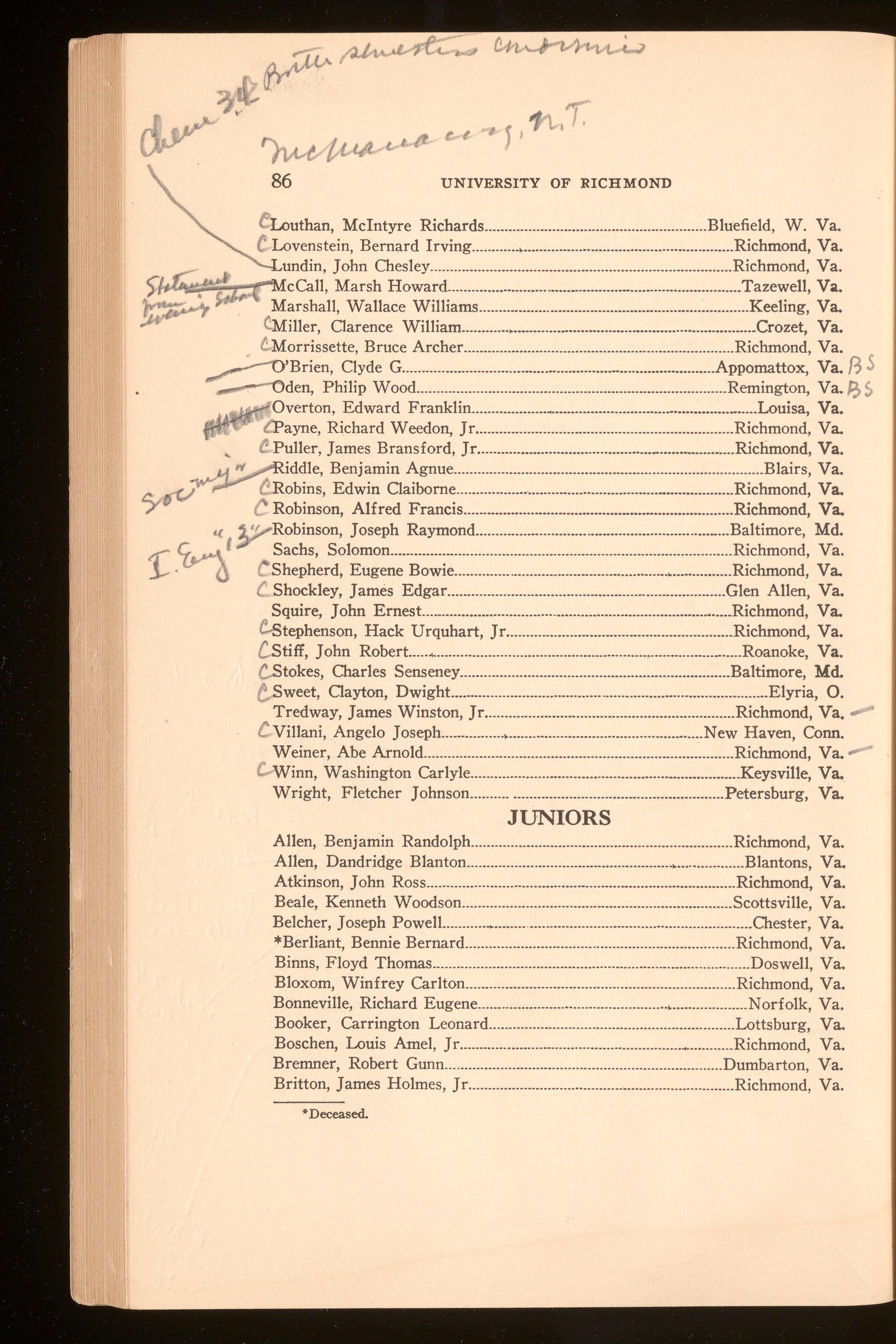
UNIVERSITY OF RICHMOND
Broaddu s, Charl es Coleman, Jr ..............................................Richmond, Va.
Broaddu s, Malcolm Rudolph ....................................................Hopewell, Va.
Brott , Willi a m Fout ..............................................................Richmond, Va.
Campbe ll, Robert Bailey ................. .......·- ·Richmond, Va.
Carmack, Leonard David ............................................................Silver Spring , Md. Carr, Thomas Peyton ................................................................ Richmond, Va. Car son, Charles Hampton ................................................. Bluefield, W. Va.
Cerant on , James Renaldo ...........•

Staunton, Va.
Children, Samuel Cecil...................................... Fife, Va .
Chittum , Lewis Estes .................................. Richmond, Va.
Collier , Edward Malcolm .................. ...La Crosse , Va.
Coppage , Lawrence Franklin .... Richmond, Va .
Corson , Blake Wi!son ......... ......Richmond, Va.
Cosby, Clifton Bernard .. Richmond, Va. Cox, Arthur Hume ..Richmond , Va raft , Stanley Irwin ..Norfolk, Va. Crutchfield, Lee Gary, Jr .S. Norfolk, Va.
Darden , Rufus Hart ... .•... Franklin, Va.
Decker , William Chesley .. .Fredericksburg , Va .
Dodd , Elbert White ...........Buchanan , Va .
Eacho, Stuart Anthony .................Richmond , Va.
Earp, Henry Shelton, J r .. ..........................Baltimore, Md.
Elfmon , Samuel Leon ..................................................... ..Richmond, Va.
Ellett, Joseph Carlyle ................................................... ..Pocahontas, Va.
Estes, Melvin Wyatt ................................... .Richmond, Va. Fisher, Harry M ........................................................Logan , W. Va.
Fo st er , Guy Alex ........................... Cobbs Creek, Va Fugat e, Watkins .................... Valdosta , Ga. Gammon , Le onard Willis .. ....Wenonda, Va. Garrett , William Yates .......................................................... Richmond , Va. Gary , Ernest Dut oy........................................................ Richmond, Va. Gates, Herbert Oliver ............................................ .Highland Springs, Va. Gilmor e, John Spencer . .................................................Richmond, Va . Glick, Jacob Paul... .... ......................................................Richmond, Va.
Good, Welty Cecil.. Penn Laird, Va. Gouldman, John Garnett ...... ............Fredericksburg, Va. Grinnan, Saint George Tucker, Jr .. ................Richmond, Va. Gross, Herman ..................... ..Richmond, Va. Hamilton, John Edward .Richmond, Va. Harcum, Fred ......................... .................................. ...Franklin, Va
Harris, Frank Howard, Jr .................. . ....... ..Richmond, Va.
Harris, John Ashton ......................................... .Richmond, Va. Henderson 1 Horace Edward. ........................................................Richmond , Va. Hicks, Raleigh Watne, Jr .. .................................................................Richmond , Va.

UNIVERSITY OF RICHMOND
Holland , J oseph B enj a min Franklin, V a.
Hudson , Raymond Martin .• .Mos eley, Va
Huffm a n, George Leonard . .Orange , Va.
Hunter , Th omas Edward ................................................................Glen Allen, Va.
Hurley, Benjamin Denbeigh ....................................................................• .Wak e, Va
Ingram , Clifford Haddon . ......................................................London Bridge , Va
Jarin, Isadore 1.... ............................................. New York, N Y.
Jefferis, Thomas Carter • ..Gordonsville, Va.
Justice , James Maurice Watt svill e, Va
Kaminsky, Samuel Paul.. .......................................................... Richmond, Va
Kent , Clarence Linden .................................................................. Richmond, Va
Kincheloe, Hatcher Byrd '. ..........................................................Rocky Mount , Va
Krapin, Louis Richmond, Va.
Lester, Max • ...Richmond , Va .
Leach, Sandford Burdette ................................... ...Washington, D C.
Le e, Georg e M eade .......................................................... Milldale, Va
Lig on, Thomas Allan ...................................................................... Richmond , Va.
Lord, Frank Knight, Jr ......•.......Richmond, Va.
McRae, Christopher Lawrence .........Richmond , Va.
Martin , La Grande ..Chester, Va .
Meador , Carl Wise .......................................... Richmond , Va.
Milchin , Sam ........................................ • ................ Richmond, Va.
Miller , Christopher P oppenheim .................................. Richmond, Va
Morewitz , L ouis ............................................................... ...•. Newport N ew s, Va
Newton, William Carey , J r ......................Sh a nt un g, Chin a
Nininger, Edward Clagett . • ...............R oa nok e, V a .
Nunez, Rafael Ang el... San Jo se, Costa Rica
Onesty, Louis Anthon y ... .Richmond , Va .
Ov er str eet , Claud e J ohns on Bedf ord, Va. Page , William Cr eth ............•.. Moseley , Va . Parker, Charles Pelham ....................................................................V ern on Hill , V a.
Pearce, John L e roy ...... , Sedley, Va
Peple, Edward Cronin ................................................................. Richmond , Va.
Phillips , Alonzo Lafay ette ................................................................ Richmond , Va
Pickets, Edward Greydon .. ...........................................................Richmond , Va Pierce, Willard Reed .......................................Highland Springs, Va
Pregnall, Herb ert Burton .. ................................................Richmond, Va.
Proctor , Ru ssell Chri stian Richmond , Va .
Puckett, Charles Willard .... Richmond, Va
Quarles, Edgar Bryan Richmond, Va
Quong, Sidn ey Wu .................. .Norfolk, Va.
Reams, Hugh Douglas .................. ..Richmond, Va
Robben, Herman J oseph .. .......................................................Richmond, Va.
Robertson, Francis Henry ....... ................................................Petersburg, Va.
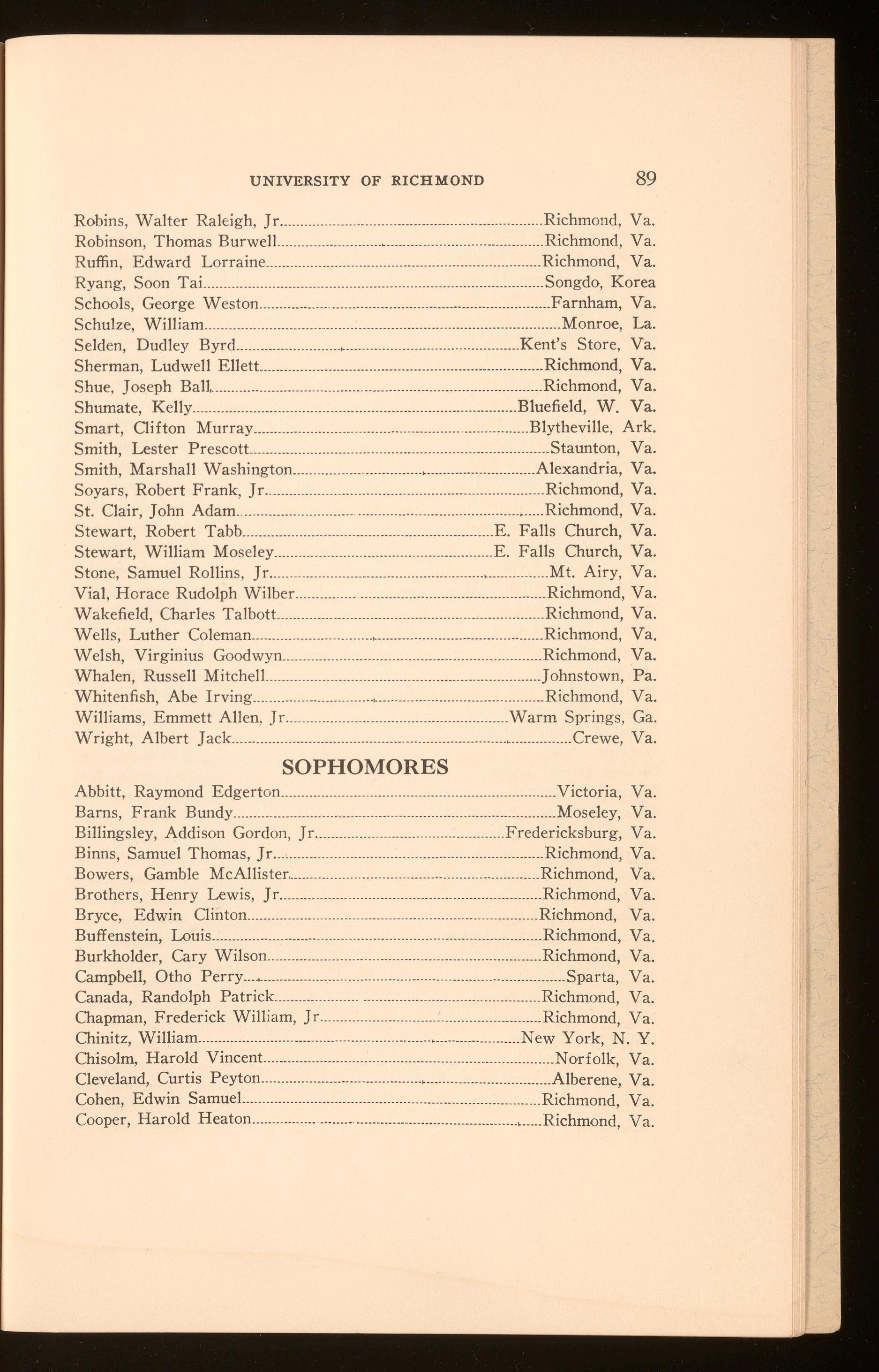
Robins, Walter Raleigh, Jr ................................................................ Richmond, Va. Robinson, Thomas BurwelL ...............................................................Richmond, Va.
Ruffin, Edward Lorraine Richmond, Va. Ryang, Soon Tai Songdo, Korea Schools, George Weston Farnham, Va.
Schulze, William ............................. ...................................................Monroe, La.
Selden, Dudley Byrd ..........................•...........................................Kent's Store, Va. Sherman, Ludwell Ellett ......................................................................Richmond, Va.
Shue , Joseph Ball,..................................................................................Richmond, Va.
Shumate, Kelly ................................................................................Bluefield, W. Va. Smart, Oifton Murray ......................... ........................................Blytheville, Ark. Smith, Lester Prescott Staunton, Va. Smith, Marshall Washington ................. ...........•...........................Alexandria, Va.
Soyars, Robert Frank, Jr. Richmond, Va. St. Clair, John Adam ...•.....Richmond, Va. Stewart, Robert Tabb ..............................................................E. Falls Church, Va. Stewart, William Moseley E. Falls Church, Va. Stone, Samuel Rollins, Jr .....................................................•...............Mt. Airy, Va.
Vial, Horace Rudolph Wilber.. ...........................................................Richmond, Va. Wakefield, Charles Talbott ..................................................................Richmond, Va. Wells, Luther Coleman ..............................•.........................................Richmond, Va.
Welsh, Virginius Goodwyn Richmond, Va. Whalen, Russell Mitchell ] ohnstown, Pa. Whitenfish, Abe Irving , Richmond, Va. Williams, Emmett Allen , Jr. Warm Springs, Ga. Wright, Albert Jack ............. ....................................................•...............Crewe, Va.
SOPHOMORES
Abbitt, Raymond Edgerton Victoria, Va. Barns, Frank Bundy ................................ .............................................Moseley, Va. Billingsley, Addison Gordon, Jr .............. Fredericksburg, Va. Binns, Samuel Thomas, Jr Richmond, Va. Bowers, Gamble McAllister Richmond, Va. Brothers, Henry Lewis, Jr Richmond, Va. Bryce, Edwin Clinton ........................................................................Richmond, Va. Buffenstein, Louis ..................................................................................Richmond, Va. Burkholder, Cary Wilson Richmond, Va. Campbell, Otho Perry ...,............................................................................Sparta, Va. Canada, Randolph Patrick ................................................................Richmond, Va. Chapman, Frederick William, Jr. ......................................................Richmond, Va. Chinitz, William ................................................................................New York, N. Y. Chisolm, Harold Vincent ........................................................................Norfolk, Va. Cleveland, Curtis Peyton ........................................•...............................Alberene, Va. Cohen, Edwin SamueL. .......................................................................Richmond, Va. Cooper, Harold Heaton ................................................................•.....Richmond, Va.

Copley, William Henry Richmond, Va.
*Copley, William Wilkerson ..................................•...........................Richmond, Va.
Cowley, John Robert ................................................................Richmond Hill, N. Y.
Cox, George William, Jr ...............................•.......................................Culpeper, Va.
Cumby, Mott Allen ..............................................................................Blackstone, Va.
Dodd, James Woodfin, J r. Richmond, Va.
Echols, James Branch ......................................................•.................Blackstone, Va.
Edgar, Charles Munro ..........................................................................Richmond, Va. Ellis, Bolling Hatch ........................................................................•.....Richmond, Va. Evans, William Hughes Richmond, Va.
Fallin, Lester Wright ........•...................................................................Oldharns, Va. Falls, Howard Parker Richmond, Va.
Farley, Ernst Watson, Jr .....................................................................Richmond, Va.
Ferrell, Ralph Harris, J r .............................................................Coral Gables, Fla.
Fidler, William Frederic ....................................................................Richmond, Va. Fox, Robert Pollard ....•....................................................... West Point, Va.
Frith, Clifford Field ................................................................................Roanoke, Va.
Gibbs, Charles Glynwood ....................................................................Richmond, Va. Gillikin, Carl Gray Riclimond, Va.
Grasty, Taylor Pierce .................-,..............................................................Orange, Va. Gray, Clarence Jones ........................................................................Red Bank, N. J. Grossman, Leon ..............................................................•.....................Richmond, Va.
Groth, William Loy ..........................................................................Middlebrook, Va.
Hannon, Richard Charles ............................................................West Haven, Conn.
Harding, James Harrison ............................... - ...................................Richmond, Va.
Harkess, Peter Richmond, Va.
Henkel, David Seabury Burkeville, Va.
Hepler, Ryland Davis Jordan Mines, Va.
Hickman, Walter Braddock ............................................................•...Baltimore, Md.
Hobson, Richard Milton ......................................................................Richmond, Va.
Hoover, William Benjamin ................................................•...............Richmond, Va. Hopkins, Marbrey Benjamin, Jr .........................................................Lancaster, Va.
Howell, Arden, Jr ..................•......................................................................Vinita, Va. Hunter, Ashby Exall... .........................................................................Richmond, Va.
Hutcheson, Harold Houston Richmond, Va. Jacobson, Abe Meyer Richmond, Va.
Jeter, Charles Leland ..............................................................•.............Richmond, Va. Jones, Morris Harrison Richmond, Va.
Jones, Stanley Hopkins ..............................................................Staten Island, N. Y. Katz, David Henry Richmond, Va.
Kerr, George H .........................•.................................................................Oxford, Pa.
Kincheloe, Wildman Suddath, Jr Crewe, Va. La Prade, Edmund Moseley ................................................................Richmond, Va. *Deceased.
UNIVERSITY OF RICHMOND
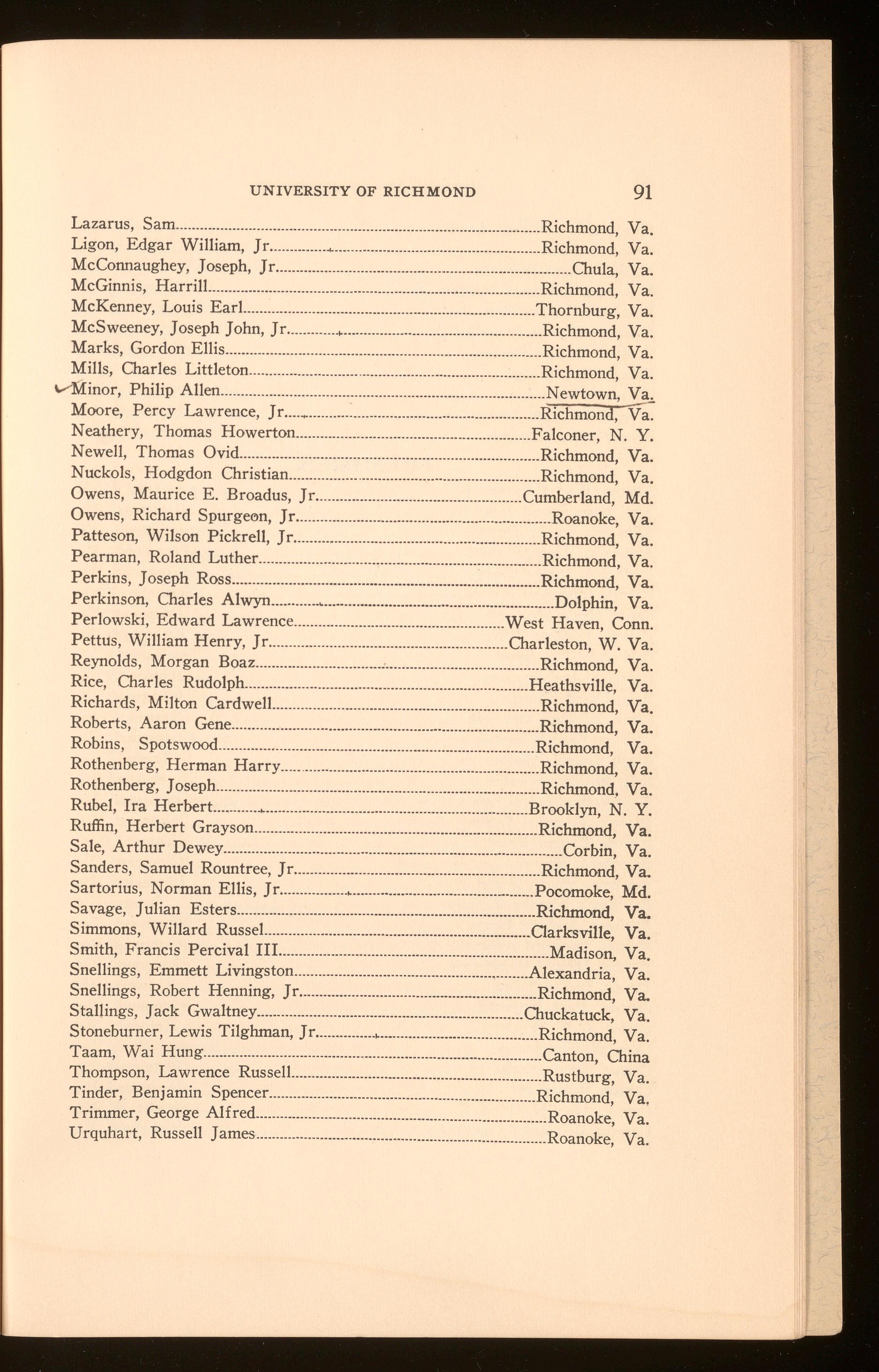
91
Lazarus, Sam . ................... ................. .........Richmond, Va. Ligon, Edgar William, Jr ........... .................. .Richmond, Va. McConnaughey , Joseph, Jr ....... .................................... Chula, Va. McGinnis, Harrill.. ................. .................. ....Richmond, Va McKenney , Louis Earl. .......... ...................... ..Thornburg, Va. McSweeney, Jos eph John, Jr . .... • ............... ........Richmond, Va. Marks, Gordon Ellis ... ................... ...........Richmond, Va. Mills, Charles Littleton ........... ............ ............Richmond, Va vMinor, Philip Allen ........................ .................. Newtown, Moore, Percy Lawrence , Jr ....~· ················· ···Richmond, Va. Neathery, Thomas Howerton .. ................................Falconer, N. Y. Newell, Thomas Ovid ................... ................... ....Richmond, Va. Nuckols , Hodgdon Christian ...... .............. ...............Richmond, Va. Owens, Mauric e E. Broadus, Jr ..... ......................... Cumberland, Md. Owens , Richard Spurge<,n, Jr ........ ................ Roanoke, Va. Patteson, Wilson Pickrell, J r ... .......................... .Richmond, Va. Pearman, Roland Luther . ............................... ..........._.....Richmond, Va. Perkins , Joseph Ross ................... ........................... Richmond, Va. Perkinson , Charles Alwyn . , .................. ..............Dolphin, Va Perlowski , Edward Lawrence ................. West Haven, Conn. P ettus, William Henry , Jr .................. ....Charleston, W. Va. Reynolds, Morgan Boaz ........................ ...........Richmond, Va.
Rice , Charles Rudolph ................... ........................Heathsville , Va. Richards, Milton Cardwell ............ .................. Richmond, Va. Roberts, Aaron Gene ................... .................... ....Richmond, Va. Robins , Spotswood ....................... ..................... .Richmond, Va. Rothenb erg , Herman Harry .. .................... Richmond, Va. Rothenberg, Joseph .................. ................. Richmond. Va. Rubel, Ira Herbert ........... . .................. .Brooklyn, N. Y. Ruffin, Herbert Grayson ...... .................. ..........Richmond, Va. Sale, Arthur Dewey . ................. ...................... ..Corbin, Va . Sanders, Samuel Rountree, Jr .... .................... Richmond, Va. Sartorius, Norman Ellis, Jr ........ .• ............................. - Pocomoke, Md. Savage, Julian Esters .................. ..................Richmond, Va. Simmons, Willard Russel... ......................... .........................Oarksville, Va. Smith , Francis Percival III.. .................. ...........Madison, Va. Snellings, Emmett Livingston . ................... .......Alexandria, Va. Snellings, Robert Henning , Jr . ................... ........Richmond, Va. Stallings , Jack Gwaltney . ..................... .Chuckatuck, Va. Stoneburner, Lewis Tilghman, Jr .. ....•.... ..................... Richmond, Va . Taam, Wai Hung . ................. .................................Canton, China Thompson, Lawrence Russell... ................ ...Rustburg, Va. Tinder , Benjamin Spencer ................. ....................Richmond, Va , Trimmer, George Alfred .... ................ ..................... ..Roanoke, Va. Urquhart, Russell James ..................... .................. .......Roanoke, Va.
UNIVERSITY OF RICHMOND
V an Sickl er , Francis Lake ....... ....... ....................Purcellville , Va.
Vrani a n, H enry . ............................ ......... .................. .................Richmond, Va.
Wall , Furman Gresham ........ ........... ............... ............. King William, Va.
Weinfeld, Benjamin William , Jr ....... •.. .......... .......... .........Richmond, Va.
Whal en, H enry Joseph, J r ....... ........... ......................... J ohnstown, Pa.
Whitl ey, George Franklin, Jr. ..........

.............Smithfield , Va,
Wilson, Homer Sterling ............... ....... ............ ............ Richm ond , Va .
Wong , Chee Wing ............. .......
Wright , Elbert Lee ........ .............
Wright , William Alexander .........
..•... Canton , China
............Richmond, Va .
.......... ..........Richmond , V a .
Wyatt , John Edward . ...... ..... . ........ ....... Rhoadesville, Va
FRESHMEN
Adams , Walter Forest , Jr ...... ............. ................................Fore st Hill s , N . Y
Alexander , David Mitchell... ... ........
.............. Richm ond, Va
Allmond, Edwin Thomas ................. ....... ....... Newport N ews , Va .
Anderson, George Hunt ............. .......................... ........ Richm ond, Va .
Anderson, J a mes Carlin ... .........................
.............. .......Winchester , Va
Babbitt, Theod ore Alfred .................................... .......... ........Worcester, Ma ss .
Baird, Hugh Holcombe , J r. ..............
Ballou, William Witt . ............
····· Chester , Va .
....... Richmond , Va
Barksdale, Lee Scott ...... ....... ......... .......... ..............P etersburg , Va .
Baroody , Anthony James .............. .............. ......... • .............Richmond, Va.
Bass, David Edward ................. ............. ............................................ Richm ond, Va .
Bates , Willi am Meredith ...... ......... .............. ....... ....N ewtown, V a
Beazley , Fred Wharton , J r ... ......... ................................. Port smouth , V a
Belch, George M edlin .................. ............................... ........................Tyn er , N. C.
Bell, Will iam Spraker •................................................ .......... Richmond , Va
Blankenship , James Leon a rd, J r.. .................. ........ ........... Richmond , Va . Booker , Erasmus Dervin ............................ ........ ......... Farnham, Va
Boorde, Eugene Kesel... ..... ........................... ...........................Washington, D. C.
Bornstein, Harry .. ......... ............. ......... ........... .............Richmond , Va.
Bousman, Gary Alfred ........... ........... ................... ........... ............Richm ond, Va.
Brockman , Charles Kemper .......................... ............................. Orange, V a.
Bromley, Richard Lewi s ......... ........... ....................................Winchester , Va.
Brooks, Welford Addis on ........ ................ • ........ ................ Richm ond , V a
Bryant , Harold Wonderl ey......... ......... ......... ................ .._Richm ond, Va.
Bundy, Daniel Trigg . .......... ............. ............ .......... .• .Lebanon, Va.
Burton, Paul Reginald ... ....... ........... ........................... ..Richmond, Va
Butler, L. V. Winfrey ..................... ......... ........................ Culpeper, Va .
Cain, William James ... .......... .•.......... ............ .........N ewport News , V a.
Carner, James Earle, Jr ................... ................... ........ ...............Richmond, V a.
Carson, Roland H ........ ............... .......... ................. .. •...Richmond, Va.
Carter, Allen Eldridge ....... ....... .......... ......... .Catawba, W . Va.
Cavedo , William Fitzgerald ........• .......... .............. ....Richmond , Va
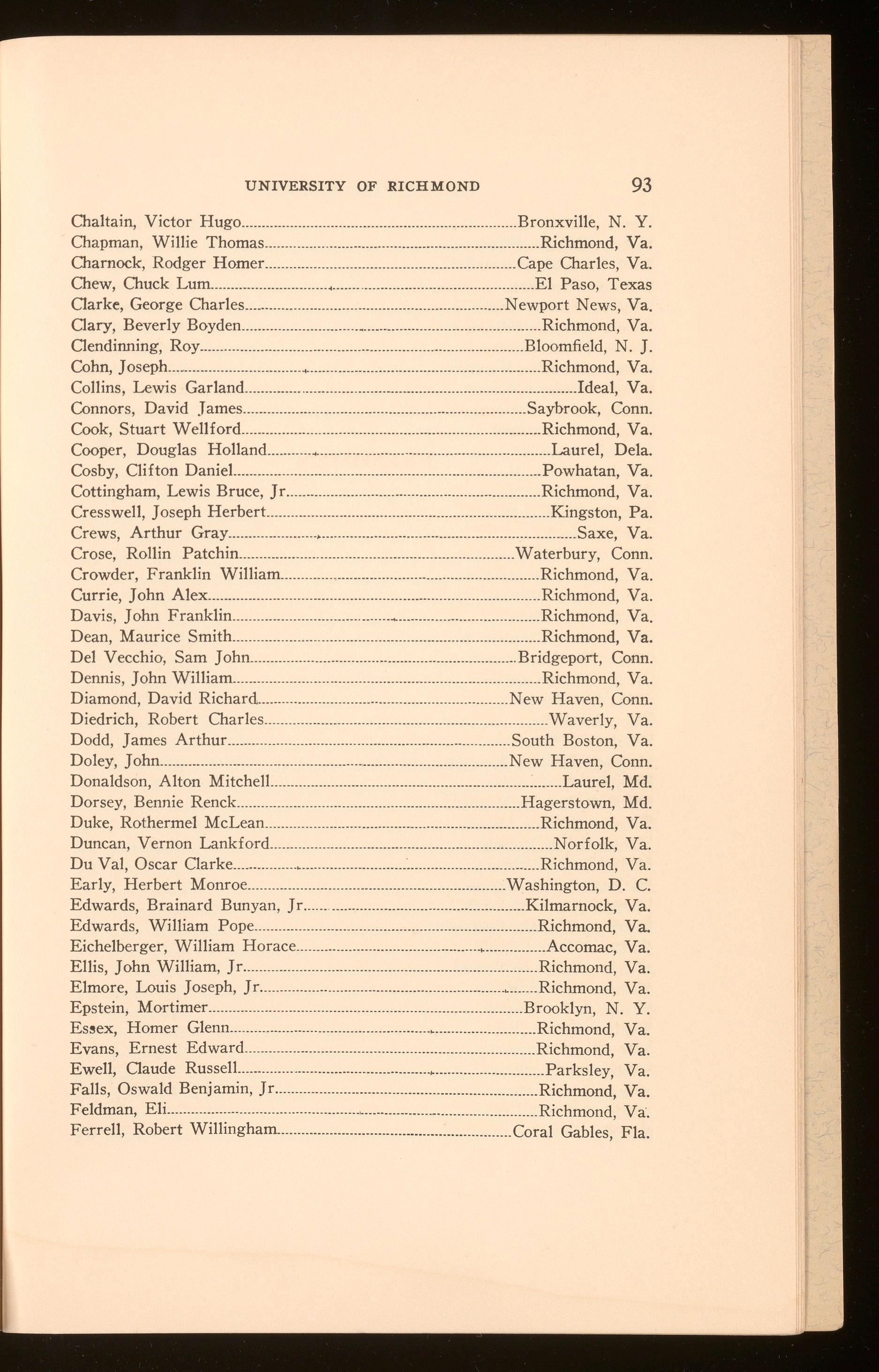
Chaltain, Victor Hugo Bronxville, N. Y. Chapman, Willie Thomas Richmond, Va. Charnock, Rodger Horner ..............................................................Cape Charles, Va. Chew, Chuck Lum .............................•.................................................. El Paso, Texas
Oarke, George Charles Newport News, Va. Oary, Beverly Boyden Richmond, Va. Oendinning, Roy Bloomfield, N. J. Cohn, Joseph .................................+··•·····•················································Richmond, Va.
Collins, Lewis Garland ..................................................................................Ideal, Va. Connors, David James Saybrook, Conn. Cook, Stuart Wellford ..........................................................................Richmond, Va. Cooper, Douglas Holland ...........•..........................................................Laurel, Dela. Cosby, Clifton Daniel... Powhatan, Va.
Cottingham, Lewis Bruce, Jr Richmond, Va.
Cresswell, Joseph Herbert ......................................................................Kingston, Pa. Crews, Arthur Gray ......................•...............................................................Saxe, Va. Crose, Rollin Patchin Waterbury, Conn. Crowder, Franklin William ............. Richmond, Va. Currie, John Alex ..................................................................................Richmond, Va. Davis, John Franklin .......................................
Richmond, Va. Dean, Maurice Smith Richmond, Va.
Del Vecchio, Sam John Bridgeport, Conn. Dennis, John William ............................................................................Richmond, Va.
Diamond, David Richard ..............................................................New Haven, Conn.
Diedrich, Robert Charles ......................................................................Waverly, Va. Dodd, James Arthur ......................................................................South Boston, Va.
Doley, John New Haven, Conn. Donaldson, Alton Mitchell Laurel, Md. Dorsey, Bennie Renck. Hagerstown, Md. Duke, Rothermel McLean Richmond, Va. Duncan, Vernon Lankford N orfolk, Va. Du Val, Oscar Clarke ................•...........................................................Richmond, Va.
Early, Herbert Monroe Washington, D. C. Edwards, Brainard Bunyan, Jr Kilmarnock, Va. Edwards, William Pope Richmond, Va. Eichelberger, William Horace ..............................................•...............Accomac, Va. Ellis, John William, J r. ................................. ............................. .......... Richmond, Va.
Elmore, Louis Joseph, Jr .............................................................•.......Richmond, Va. Epstein, Mortimer ..............................................................................Brooklyn, N. Y. Es!ex, Homer Glenn ..................................................•.........................Richmond, Va. Evans, Ernest Edward Richmond, Va. Ewell, Oaude Russell. ...............................................•...........................Parksley, Va. Falls, Oswald Benjamin, Jr Richmond, Va. Feldman, Eli ................................................•...........................................Richmond, Va. Ferrell, Robert Willingham. .........................................................Coral Gables, Fla.
94
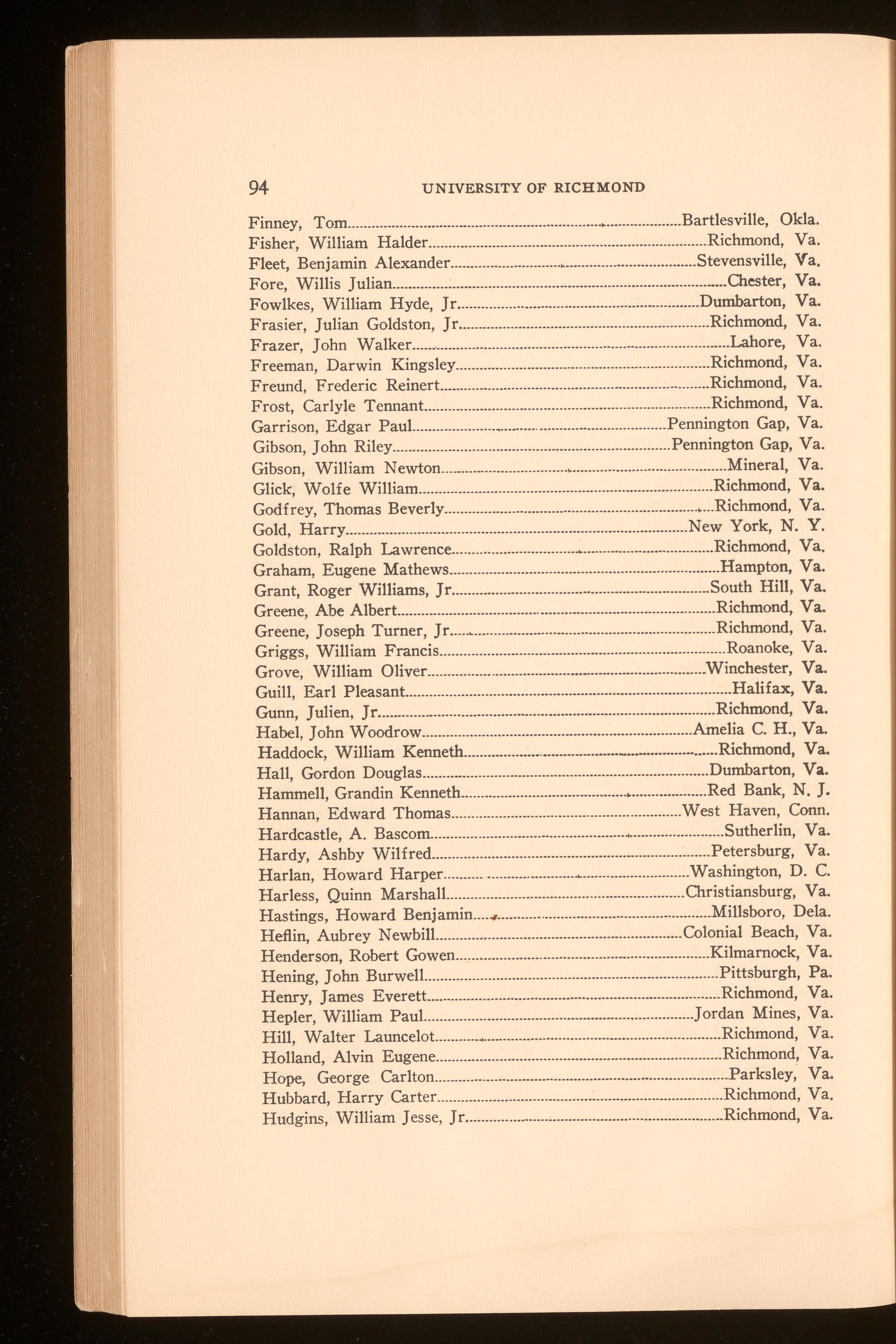
UNIVERSITY OF RICHMOND
Finney, Tom . ................... ...•...................Bartlesville , Okla. Fisher, William Halder ..................... .....................Richmond, Va . Fleet, Benjamin Alexander ........................ ...• .................Stevensville, Va.
Fore, Willis Julian ....... ............................. ... - ...Chester, Va.
Fowlkes, William Hyde, Jr .... .•• ······················ -· Dumbarton, Va.
Frasier , Julian Goldston, Jr ........... ......................... Richmond, Va. Frazer, John Walker .. ................. .................... Lahore, Va. Freeman , Darwin Kingsley ............... ........................ ...Richmond, Va.
Freund, Frederic Reinert .................... ................. .Richmond, Va. Frost, Carlyle Tennant ...................... ....Richmond, Va
Garrison , Edgar Paul... . ..........·-············ Pennington Gap, Va.
Gibson, John Riley ....................... .....................Pennington Gap, Va.
Gibson, William N ewton ........·- ············· ·• ·················· ·Mineral, Va .
Glick, Wolfe William ... ................. ...............................Richmond, Va. Godfrey , Thomas Beverly .. ............... •········· -· ·• ·Richmond, Va.
Gold, Harry .. .................. ...............New York, N. Y .
Goldston , Ralph Lawrence .................. .................. Richmond, Va .
Graham , Eugene Mathews ................. ................. Hampton, Va.
Grant, Roger Williams, J r .. ................... South Hill, Va. Greene, Abe Albert .................... ................. .Richmond, Va. Greene, Joseph Turner, Jr ..................... Richmond, Va.
Griggs, William Francis ... .................... Roanoke, Va
Grove, William Oliver ........ ................._ Winchester, Va. Guill, Earl Pleasant ... .................... ................... .Halifax, Va. Gunn, Julien, Jr ........... ······ ·········
·Richmond, Va. Habel , John W oodrow . .................. ............Amelia C. H , Va. Haddock, William Kenneth ........ ----··········· ··Richmond, Va. Hall, Gordon Douglas .... .................. .............Dumbarton , Va. Hammell, Grandin Kenneth .....................•. Red Bank, N. J. Hannan, Edward Thomas ...... ................. West Haven, Conn. Hardcastle, A. Bascom .......... ..............•... .Sutherlin, Va. Hardy, Ashby Wilfred .......... ............._.. .Petersburg, Va Harlan, Howard Harper .............. .................. .Washington, D. C. Harless, Quinn Marshall... ........ .................. Christiansburg, Va. Hastings, Howard Benjamin ....,# •••• •• •• .Millsboro, Dela . Heflin , Aubrey Newbill ..................... ....Colonial Beach , Va. Henderson, Robert Gowen. .................. ...........Kilmarnock, Va. Hening, John Burwell... ............................ .............Pittsburgh, Pa. Henry, James Everett .. ................... .........Richmond, Va Hepler, William Paul... ... ...................... ....Jordan Mines, Va. Hill, Walter Launcel ot ....• ................... .....Richmond, Va. Holland, Alvin Eugene .. ................... ...Richmond , Va. Hope, George Carlton ..... ..................... .....Parksley, Va. Hubbard, Harry Cart er .... ................. Richmond , Va. Hudgins , William Jesse , Jr .... .................. Richmond, Va.
Hurst, William Alexander ..................................................................Logan, W. Va. Ingalls, Parker William ......................................................................Richmond, Va.
Isaac, George .........................................
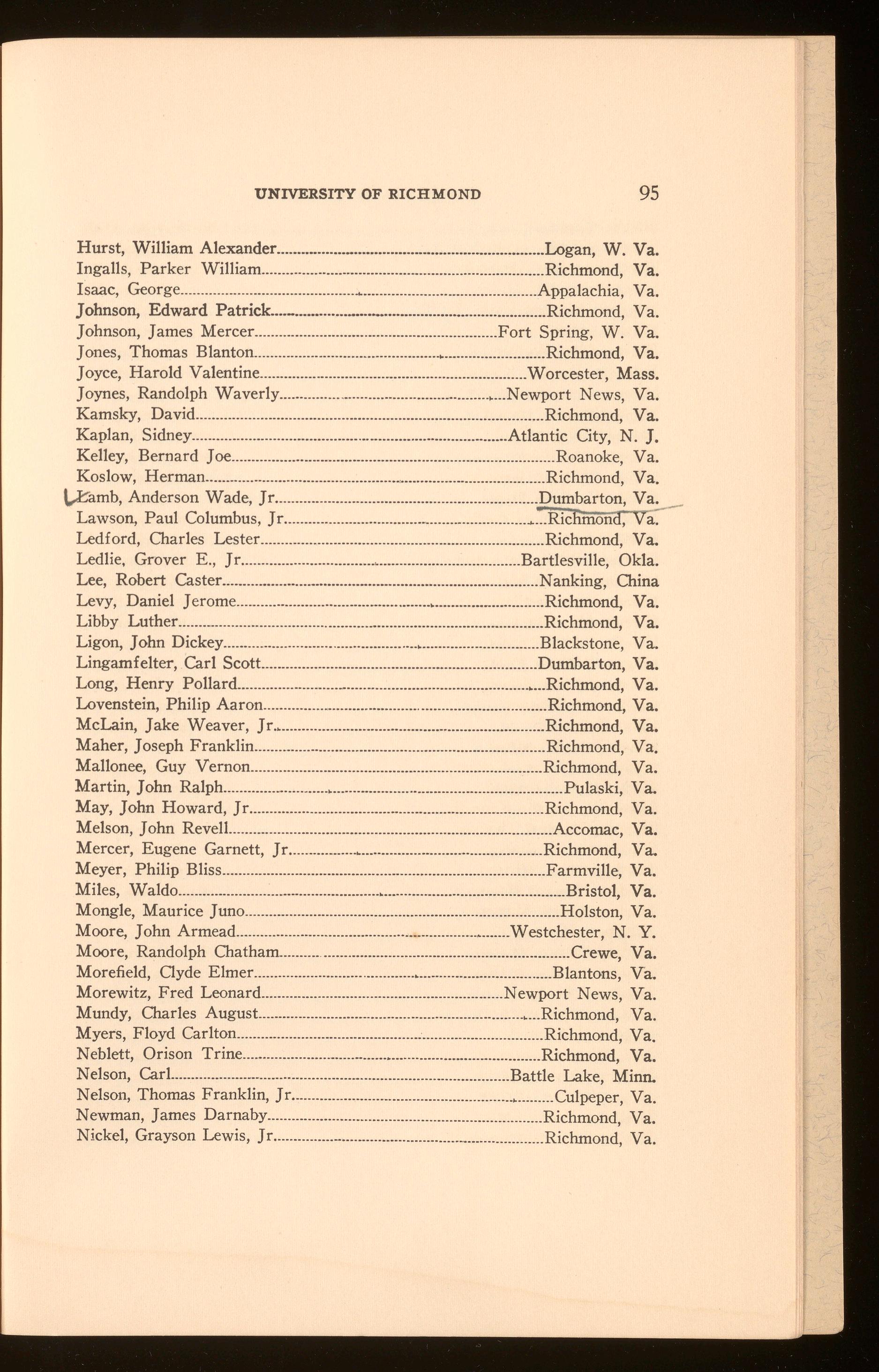
Appalachia, Va.
Johnson, Edward Patrick ...·-·············-····-·········································Richmond, Va. Johnson, James Mercer Fort Spring, W. Va.
Jones, Thomas Blanton .............................................
Richmond, Va. Joyce, Harold Valentine ..................................................................Worcester, Mass.
Joynes, Randolph Waverly ...................................................•...Newport News, Va. Kamsky, David ......................................................................................Richmond, Va.
Kaplan, Sidney ..............................................................................Atlantic City, N. J. Kelley, Bernard Joe ................................................................................Roanoke, Va.
Koslow, Herman ....................................................................................Richmond, Va. ~mb, Anderson Wade, Jr .................................................................pumbarton, V'S--
Lawson, Paul Columbus, J r ..................................
........................
Richmond, Va. Ledford, Charles Lester ......................................................................Richmond, Va.
Ledlie, Grover E., J r ................................
Bartlesville, Okla. Lee, Robert Caster ..............................................................................Nanking, China Levy, Daniel Jerome
Va. Libby Luther ..........................................................................................Richmond, Va. Ligon, John Dickey ................................................•.............................Blackstone, Va. Lingamfelter, Carl Scott Dumbarton, Va. Long, Henry Po11ard........................·-·············································•···Richmond, Va.
Lovenstein, Philip Aaron Richmond, Va. McLain, Jake Weaver, Jr .•.................................................................Richmond, Va.
Maher, Joseph Franklin ........................................................................Richmond, Va. Mallonee, Guy Vernon ........................................................................Richmond, Va. Martin, John Ralph ............·-···········•·························································pu1aski, Va. May, John Howard, Jr .........................................................................Richmond, Va.
Melson, John Revell.. ..............................................................................Accomac, Va.
Mercer, Eugene Garnett, Jr ................•.............................................Richmond, Va. Meyer, Philip Bliss ................................................................................Farmville, Va. Miles, Waldo ..................................................•.............................................Bristol, Va. Mongle, Maurice Juno ..............................................................................Holston, Va. Moore, John Armead ............................................................•.......Westchester, N. Y. Moore, Randolph Chatham .............................................................Crewe, Va. Morefield, Oyde Elmer ........................................•.................................Blantons, Va. Morewitz, Fred Leonard ............................................................Newport News, Va. Mundy, Charles August ..................................................................•...Richmond, Va. Myers, Floyd Carlton ............................................................................Richmond, Va. Neblett, Orison Trine ............................••······•······················-·············Richmond, Va. Nelson, Carl.. ..................................................................................Battle Lake, Minn. Nelson, Thomas Franklin, Jr .......................................................•.........Culpeper, Va. Newman, James Darnaby ....................................................................Richmond, Va. Nickel, Grayson Lewis, Jr .............................................. - ...................Richmond, Va.
96
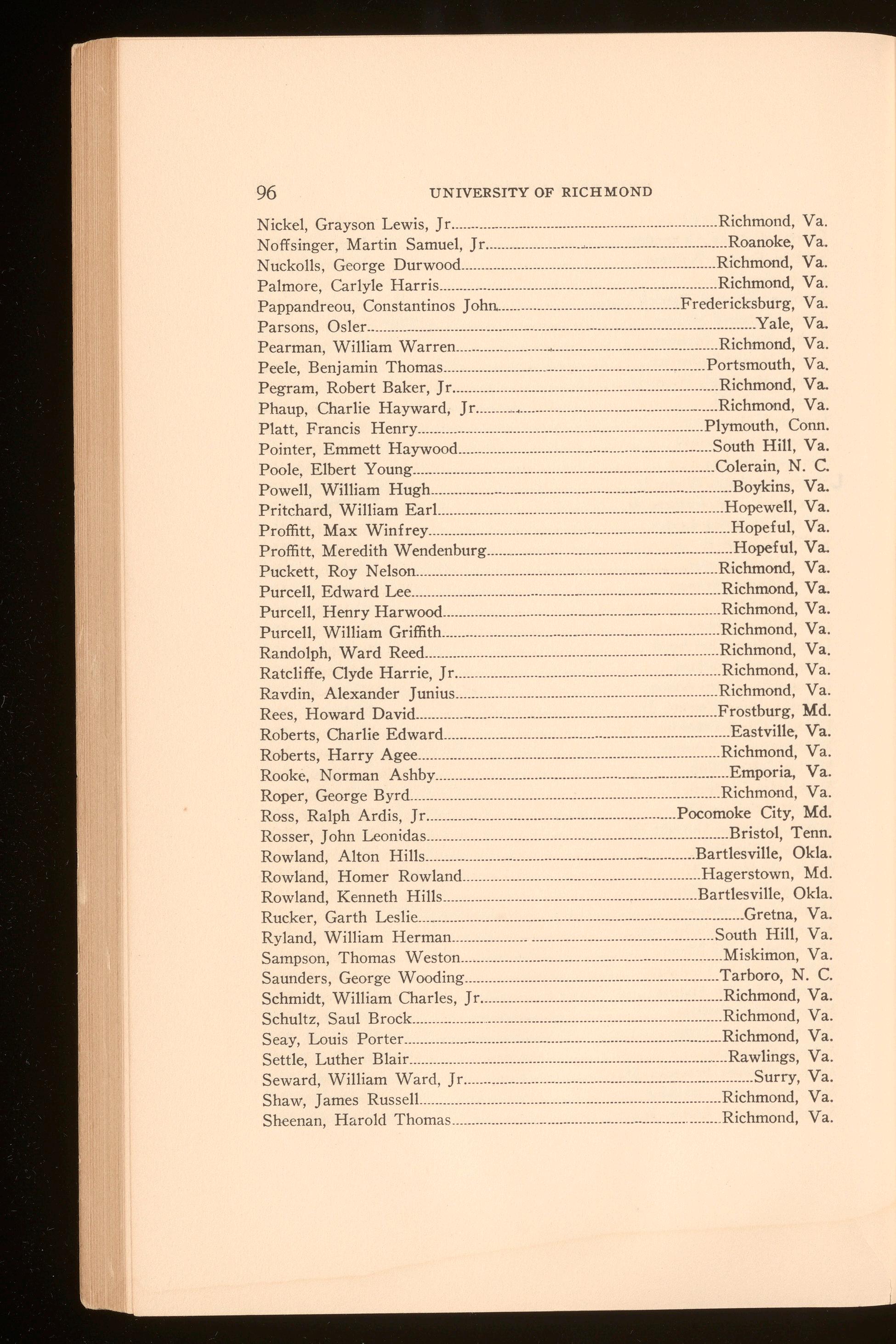
UNIVERSITY OF RICHMOND
Nickel , Grayson Lewis, J r ................. ............................Richmond , Va .
Noffsinger, Martin Samuel , Jr ................ • .........Roanoke, Va
Nuckolls , George Durwood .... ..........................................Richmond, Va.
Palmore, Carlyle Harris ............... .................. .Richmond, Va .
Pappandr eou , Constantinos J ohn.............. .........Fredericksburg, Va.
Parsons, Osler ...... ............. ........ ................ Yale, Va.
Pearman, William Warren ... •..................... Richmond, Va.
Peele, Benjamin Thomas ..... .................... Portsmouth, Va.
Pegram, Robert Baker, Jr ................ ................. Richmond, Va.
Phaup, Charlie Hayward, Jr ..........•..... ....................Richmond , Va .
Platt, Francis Henry ................... ...............Plymouth , Conn .
Pointer, Emmett Hayw ood . ................... .South Hill , Va.
Poole, Elbert Young ........ ............................... ...Colerain, N C.
Powell, William Hugh ...... ...................... ...Boykins , Va.
Pritchard , William Earl... .................... ••·····- Hopewell , Va.
Proffitt, Max Winfrey . .................... ................. Hopeful , Va.
Proffitt, Meredith Wendenburg ................ ...................... .Hopeful, Va.
Puckett, Roy Nelson ... ...................... ........Richmond, Va
Purcell, Edward Lee ...... .................... .....Richmond, Va.
Purcell, Henry Harwood .. ...................... Richmond, Va.
Purcell, William Griffith ................ ................ .Richmond , Va.
Randolph, Ward Reed .................. .........................Richmond, Va.
Ratcliffe, Clyde Harrie , Jr ......................... ................................Richmond , Va.
Ravdin, Alexander Junius ... .................. .............................Richmond, Va
Rees, Howard David .......................... ................... .......Frostburg, Md.
Roberts , Charlie Edward ............ ........................ Eastville , Va.
Roberts, Harry Agee .................... .................. Richmond, Va.
Rooke, Norman Ashby ................ ..................... Emporia, Va.
Roper, George Byrd .................... ..............Richmond , Va
Ross, Ralph Ardis, J r ......................... Pocomoke City, Md. Rosser, John Leonidas . ................................ .............Bristol, Tenn. Rowland, Alton Hills .................... .••··· ··-············ Bartl esville , Okla Rowland, Homer Rowland ................ .......Hagerstown, Md Rowland, Kenneth Hills . .................. ...Bartlesville , Okla Rucker, Garth Lesli e. .................... ........................ .Gretna , Va .
Ryland, William Herman ............... ................ .South Hill , Va . Samp son , Thoma s W eston ............... ................. Miskimon , Va . Saunders, Geo rg e Wooding ................. .................... Tarboro, N . C. Schmidt, William Charles , Jr. .............. ................ Richmond, Va. Schultz, Saul Brock. .. •·······
-··· ·······Richmond, Va .
S eay, Louis Porter .......... .................. ...Richmond, Va.
Settle, Luther Blair ........ .................. ...Rawlings , Va
Seward , William Ward , Jr.. .................... ..........Surry , Va. Shaw, James Russell... ....... .............................. .Richmond, Va
Sheenan, Harold Thoma s .... .................. Richmond, Va

UNIVERSITY OF RICHMOND 97
Shepherd, Charles Edward ..................................................................Richmond, Va.
Sheppard, Melvin Omar Richmond, Va.
Shetter, George Andrew Richmond, Va.
Sinsheimer, Joseph ' Richmond, Va.
Slaydon, Claude Allen ......................................................................Martinsville, Va.
Smith, Leroy ..........................................................................................Richmond, Va.
Smithson, Eugene Burton ..........................................................................Crewe, Va.
Snead, Howard Garnett.. Lively, Va.
Sowell, Maurice Judson ......................................................Buenos Aires, Argentina
Stevenson, Vernon Hearne Pocomoke, Md.
Stockdell, Hugh Richmond, Va.
Stokes, John Powers ............................................................................Kenbridge, Va.
Stone, James William ..............................................................................Bedford, Va.
Street, John R. Williams ......................................................................Richmond, Va.
Strickland, Henry Hartwell... Blairs, Va.
Strong, James Donald Appalachia, Va.
Sullivan, William Vincent Richmond, Va.
Swanson, George Sinclair ..............................................................Coral Gables, Fla.
Swift, Andrew Cosby ................................................................Newport News, Va.
Taliaferro, Samuel Spottswood ..............................................................Hustle, Va.
Taylor, Beverley Douglas · Richmond, Va.
Taylor, Henry Farrar ..........................................................................Richmond, Va.
Tederick, George Howard ................................................................Cumberland, Md.
Terry, David Brunson ........................................................................Winnsboro, La.
Terry, William Parker Burkeville, Va.
Tinsley, Charles Thomas, Jr Richmond, Va.
Todd, Milton Dixon Hampton, Va.
Trawick, MacEldin ......................................................................Bellefontaine, Ohio
Trice, Melvin Burnett Louisa, Va. Troxell, William Shearer ....................................................................Richmond, Va.
Van Allen, Harold ................................................................................Scottsville, Va.
Van Lear, Ed. Harper.. ..................................................................Oifton Forge, Va.
Van Lear, Robert Monroe ............................................................Oifton Forge, Va. Vaughan, Bryan Wilson Woodford, Va.
Vellines, Robert Everett Hickory, Va. Wake, William Floyd Wilton, Va.
W a Iker, John Edwin, J r. ....................................................................Richmond, Va.
Wallace, David Campbell... ...............................................................Richmond, Va. Westerman, Jack Dalton ..............................................................Oifton Forge, Va. White, Edward Street ................................................................................Cadiz, Ky. Wilcox, Samuel. .....................................................................................Richmond, Va.
Wilson, Robert Miles ............................................................]ackson Heights, N. Y.
Winfree, Rieves Westwood, Jr Richmond, Va.
Wong, Yet Shun ..................................................................................Brooklyn, N. Y. Wright, Samuel Anderson ..................................................................Richmond, Va.
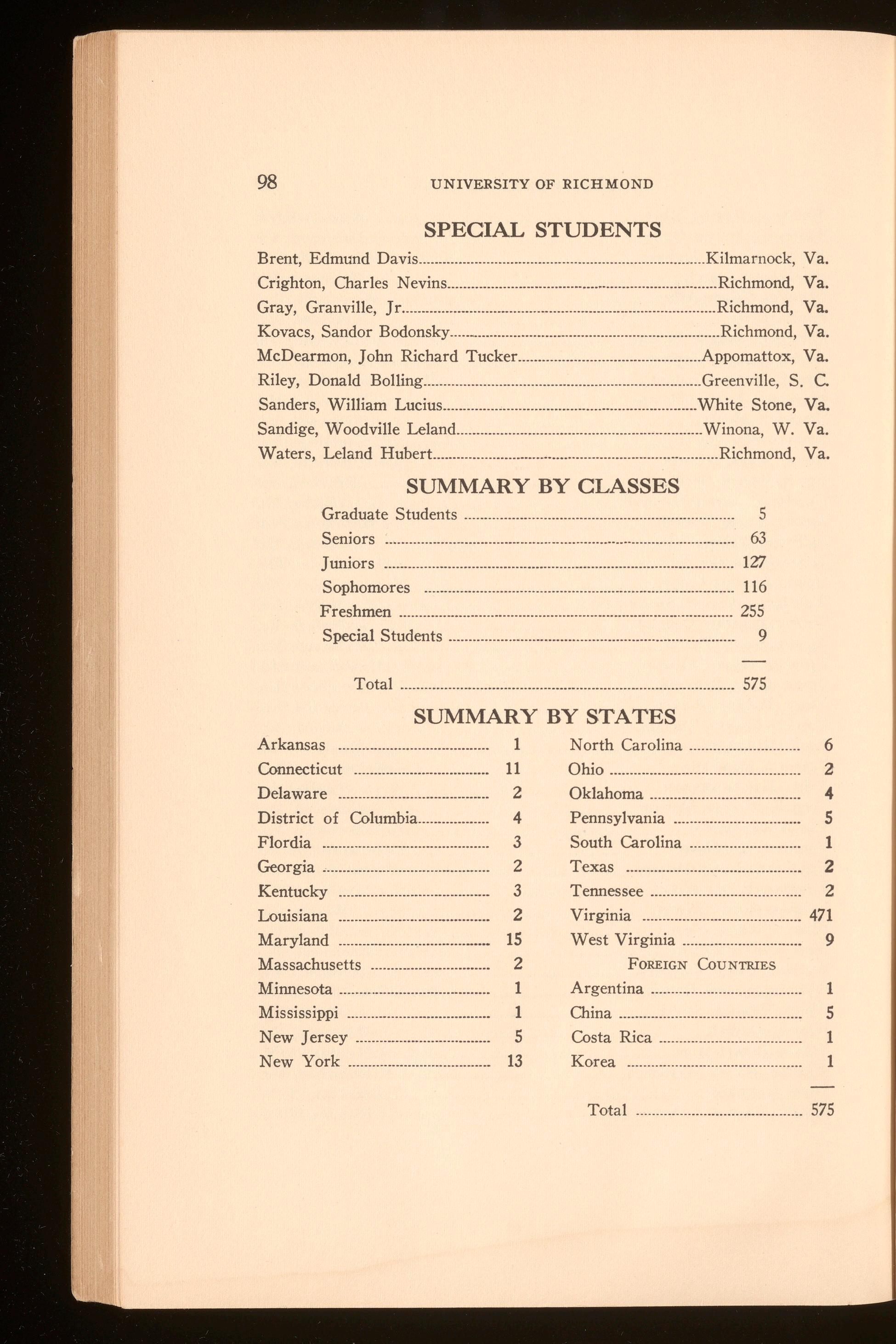
SPECIAL STUDENTS
Brent, Edmund Davis ........................................................................Kilmarnock, Va. Crighton, Charles Nevins ....................................................................Richmond, Va. Gray, Granville, Jr Richmond, Va. Kovacs, Sandor Bodonsky Richmond, Va. McDearmon, John Richard Tucker ..............................................Appomattox, Va.
Riley, Donald Bolling Greenville, S. C. Sanders, William Lucius ................................................................White Stone, Va. Sandige, Woodville Leland ..............................................................Winona, W. Va. Waters, Leland Hubert ........................................................................Richmond, Va.
SCHEDULE OF CLASSES FOR 1931-1932
MONDA~ WEDNESDA~ FRIDAY
9:00 10 :00 11 :00 12:00 12:45, 1 :30
Botany 1-2
Bus. 3-4
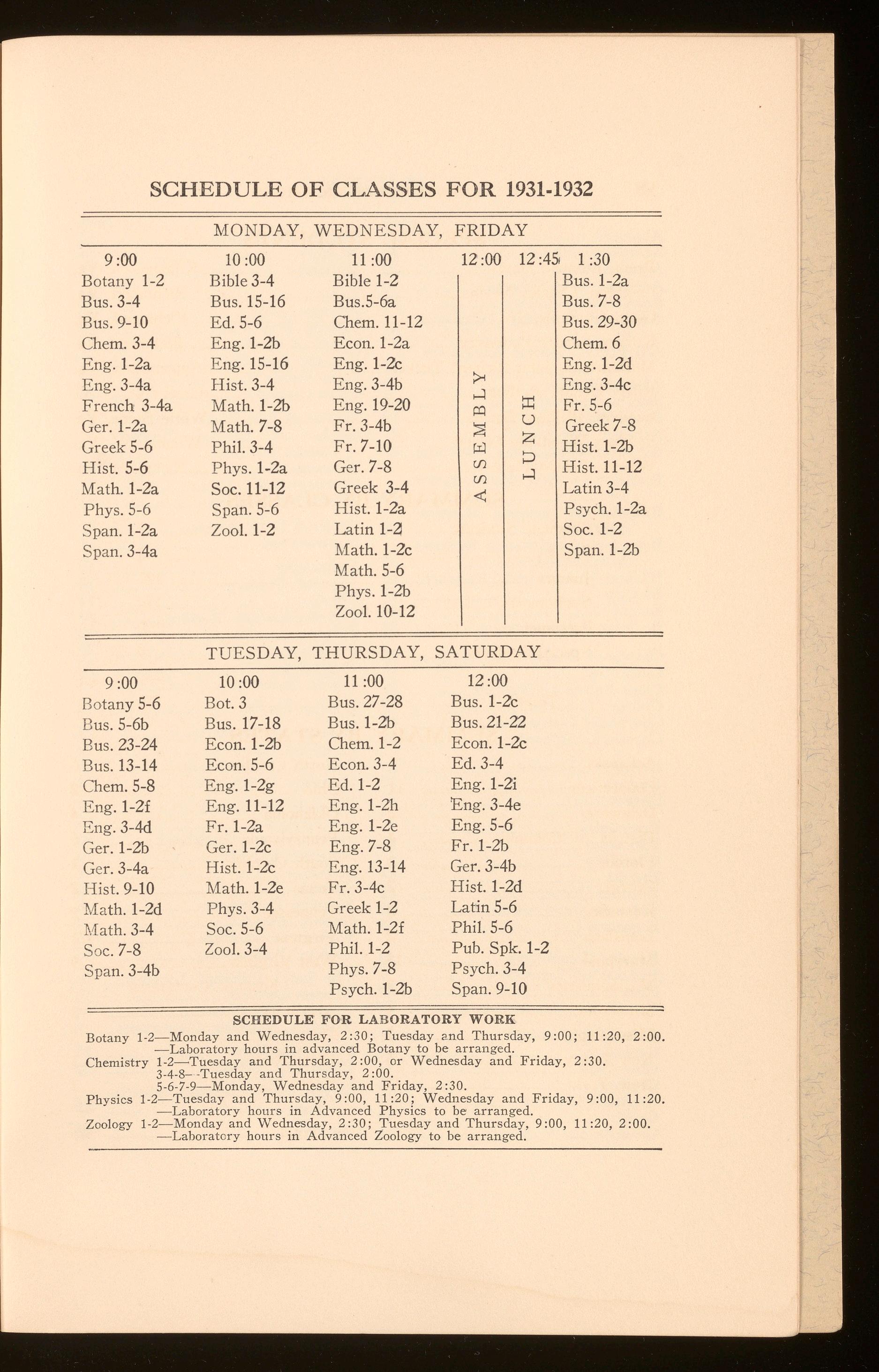
Bible 3-4
Bus. 15-16
Bible 1-2 Bus. 1-2a
Bus.5-6a Bus. 7-8 Bus. 9-10 Ed. 5-6 Chem. 11-12 Bus. 29-30 Chem. 3-4 Eng. 1-2b Econ. 1-2a Chem. 6 Eng. l-2a Eng. 15-16
Eng. 1-2c
Eng. 1-2d Eng. 3-4a Hist. 3-4 Eng. 3-4b >-< Eng. 3-4c ...l
French 3-4a Math. 1-2b Eng. 19-20 Fr. 5-6 Ger. 1-2a Math. 7-8 Fr. 3-4b u Greek 7-8
Greek 5-6 Phil. 3-4 Fr. 7-10 µ1 z Hist. 1-2b Hist. 5-6 Phys. 1-2a Ger. 7-8 VJ ;::i Hist. 11-12 ...l
Math. 1-2a Soc. 11-12
Greek 3-4 VJ Latin 3-4 Phys. 5-6 Span. 5-6 Hist. 1-2a <t: Psych. 1-2a Span. 1-2a Zoo!. 1-2 Latin 1-~ Soc. 1-2 Span. 3-4a Math. 1-2c Span. 1-2b Math. 5-6 Phys. 1-2b Zool.10-12
TUESDAY, THURSDAY, SATURDAY
9:00 10:00 11 :00 12:00
Botany 5-6 Bot. 3 Bus. 27-28 Bus. 1-2c Bus. 5-6b Bus. 17-18 Bus. 1-2b Bus. 21-22 Bus. 23-24 Econ. 1-2b Chem.1-2 Econ. 1-2c Bus. 13-14 Econ. 5-6 Econ. 3-4 Ed. 3-4 Chem. 5-8 Eng. l-2g Ed. 1-2 Eng. 1-2i Eng. 1-2£ Eng. 11-12 Eng. l-2h Eng. 3-4e Eng. 3-4d Fr. 1-2a Eng. l-2e Eng. 5-6 Ger. l-2b Ger. l-2c Eng. 7-8 Fr. 1-2b Ger. 3-4a Hist. l-2c Eng. 13-14 Ger. 3-4b Hist. 9-10 Math. 1-2e Fr. 3-4c Hist. 1-2d Math. l-2d Phys. 3-4 Greek 1-2 Latin 5-6 Math. 3-4 Soc. 5-6 Math. 1-2£ Phil. 5-6 Soc. 7-8 Zoo!. 3-4 Phil. 1-2 Pub. Spk. 1-2 Span. 3-4b Phys. 7-8 Psych. 3-4 Psych. 1-Zb Span. 9-10
SCHEDULE FOR LABORATORY WORK Botany 1-2-Monday and Wednesday, 2:30; Tuesday a.nd Thursday, 9:00; 11 :20, 2:00. -Laboratory hours in advanced Botany to be arranged Chemistry 1-2-Tuesday and Thursday, 2 :00, or Wednesday and Friday, 2 :30. 3-4-8- -Tuesday and Thursday, 2 :00. 5-6-7-9-Monday, Wednesday and Friday, 2:30. Physics 1-2-Tuesday and Thursday, 9:00, 11 :20; Wednesday and Friday, 9:00 11 :20. -Laboratory hours in Advanced Physics to be arranged. ' Zoology 1-2-Monday and Wednesday, 2 :30; Tuesday and Thursday, 9 :00, 11 :20, 2 :00. -La borat ory hours in Advanced Zoology to be arranged.

